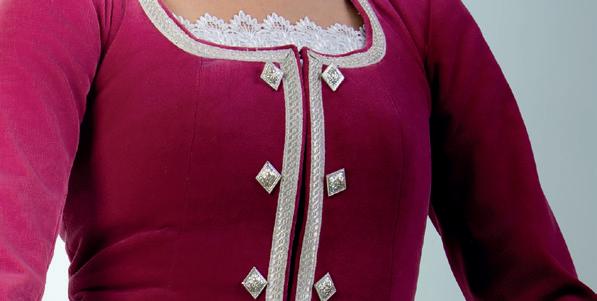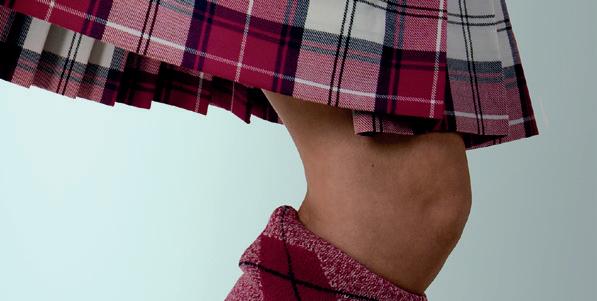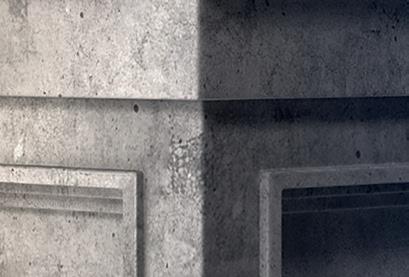
BEBE CAVE
BEN WHEATLEY
FARAH SALEH
ASH SARKAR
KINDER
EWAN MORRISON
ANDREA ARNOLD
NICOLA MEIGHAN




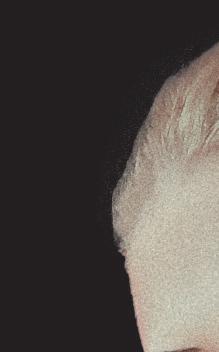




SMALL TOWN BOYS
FIGURES IN EXTINCTION
ADAM RICHES & JOHN KEARNS







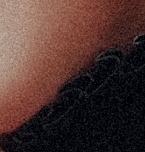




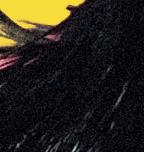




BEBE CAVE
BEN WHEATLEY
FARAH SALEH
ASH SARKAR
KINDER
EWAN MORRISON
ANDREA ARNOLD
NICOLA MEIGHAN









SMALL TOWN BOYS
FIGURES IN EXTINCTION
ADAM RICHES & JOHN KEARNS























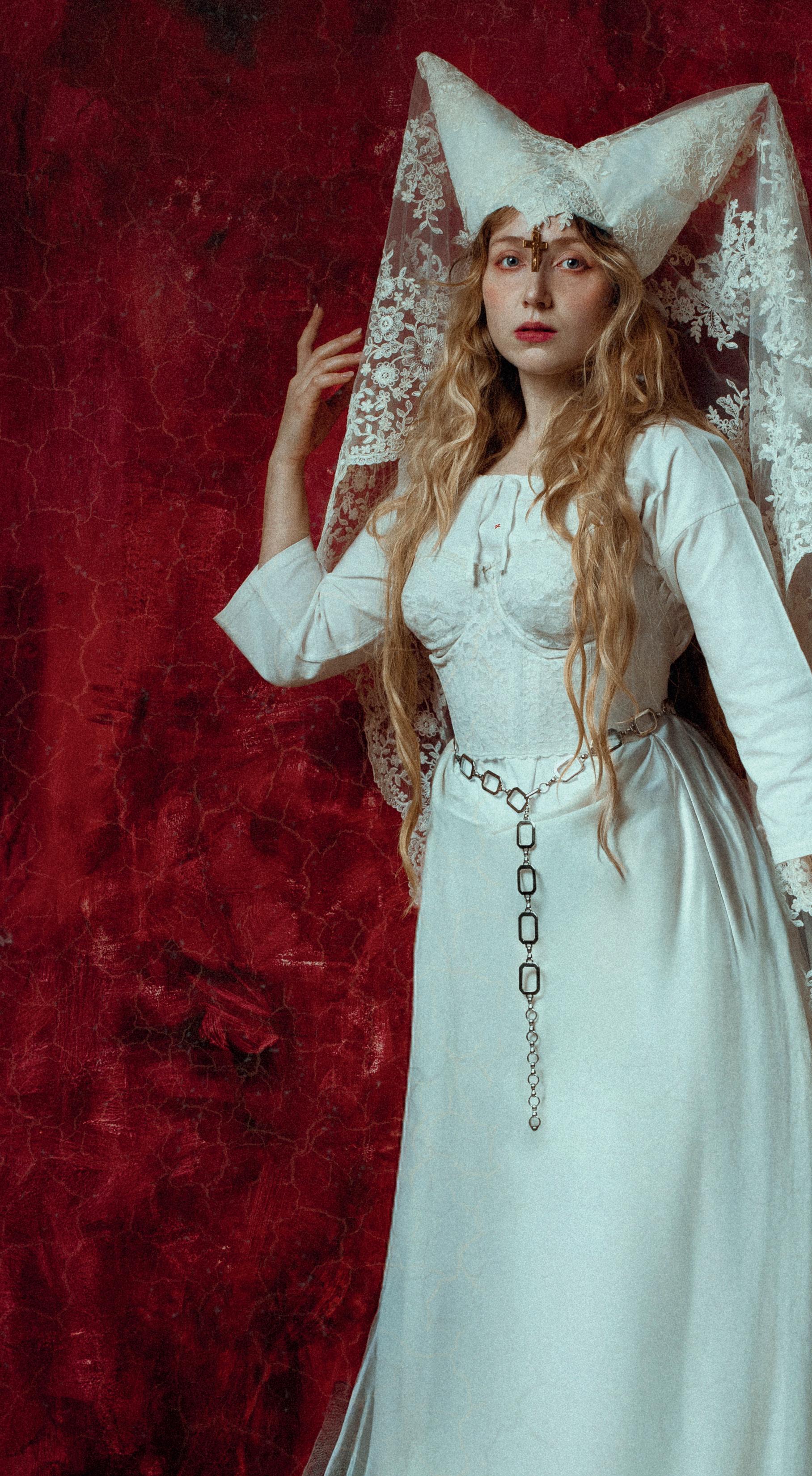
There’s been a lot going on in and around Edinburgh this past week that has almost managed to put our Festival in the shade. There is, of course, the O word with the Gallaghers managing to somehow be pals long enough to entertain a whole stadium full of bucket hats. Liam, naturally, went off on one as ‘ar kid is wont to do, calling the Fringe ‘thick shit’. He is completely entitled to his deeply considered opinion but it’s hard to get past his use of the phrase ‘one-legged bicycle’.

We have to assume there is absolutely no connection between that pronunciation from on high at Murrayfield and the fact that Arthur’s Seat went ablaze two days later. The Gallaghers’ fellow northman John Shuttleworth was having a right old go at the ancient volcano on the pages of this very magazine just last week, dubbing it ‘a bit silly’ and ‘a plonker’. Maybe we don’t really wanna know the truth but some questions could still be asked of the Yorkshire icon before he and his Bontempi shuffle off back down south. Completing a non-Festival triptych, and for folk who care about such things, even the city’s men’s football teams have made bright starts to their seasons.
But back to business, and some hot reviews are cascading in for our final Festival issue. At long last, comedy is getting into its stride, star ratings-wise, with full marks dished out to both a medieval character show and an act who says that their ‘obsessive neuroticism and lyrical phrasing blends with a surrealist instinct and childish playfulness’. No argument here. Also getting the Big 5 are an Australian circus gang who have already made their mark on this publication during August; a flamboyant and furious theatre piece set at a library reading; and an enthralling dance work that harks back to 2024 but maintains its glorious forward motion. Hopefully all that was cryptic enough for you. And finally, if you’re making your way around town on a one-legged bicycle, please be careful out there.









Brian Donaldson EDITOR
Editorial Assistant Ione Gildroy
Writers
Aashna Sharma, Afreka Thomson, Allan Radcliffe, Brian Donaldson, Claire Sawers, Dominic Corr, Eddie Harrison, Evie Glen, Ewan Morrison, Gareth K Vile, Gary Sullivan, Greg Thomas, Haneen Al Eid, Isy Santini, James Mottram, Jay Richardson, Jo Laidlaw, Katherine McLaughlin, Kevin Fullerton, Lauren McKay, Louise Holland, Lucy Ribchester, Marissa Burgess, Megan Merino, Murray Robertson, Neil Cooper, Paul McLean, Rachel Morrell, Robyn Bell, Sean Greenhorn








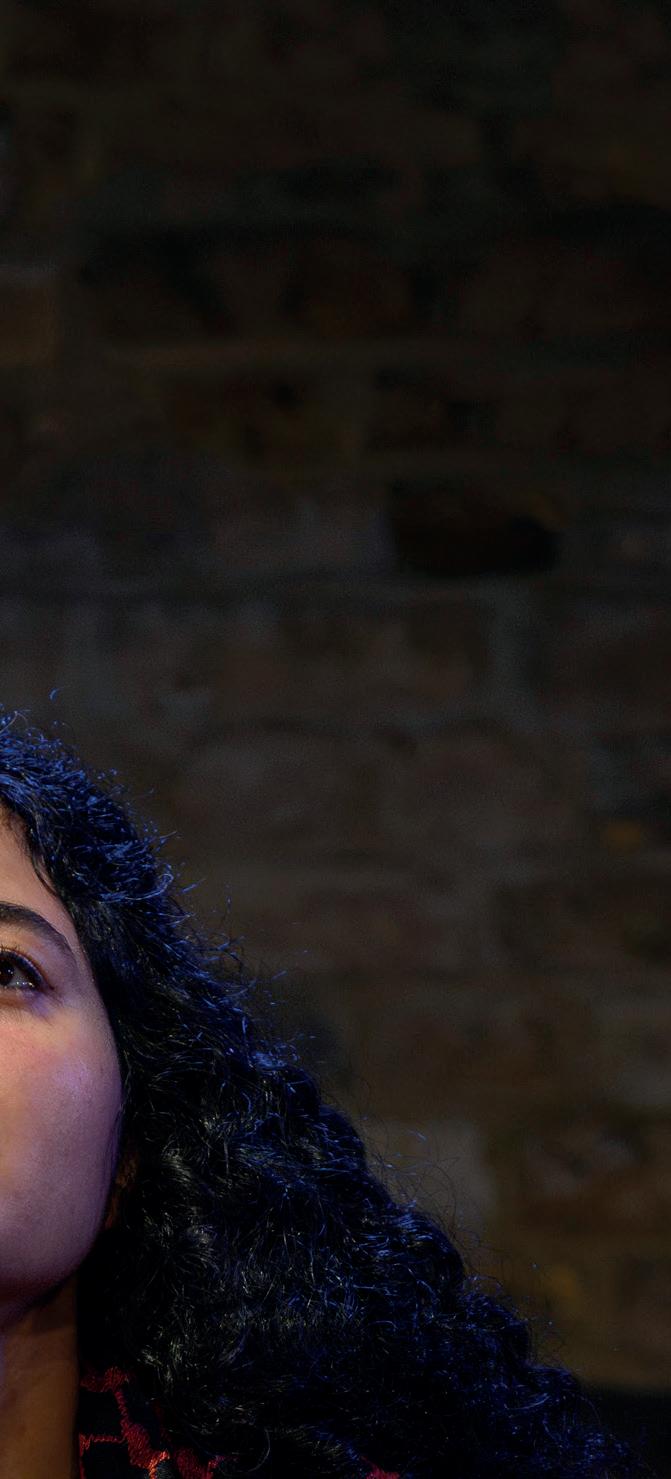


‘OPINIONATED,
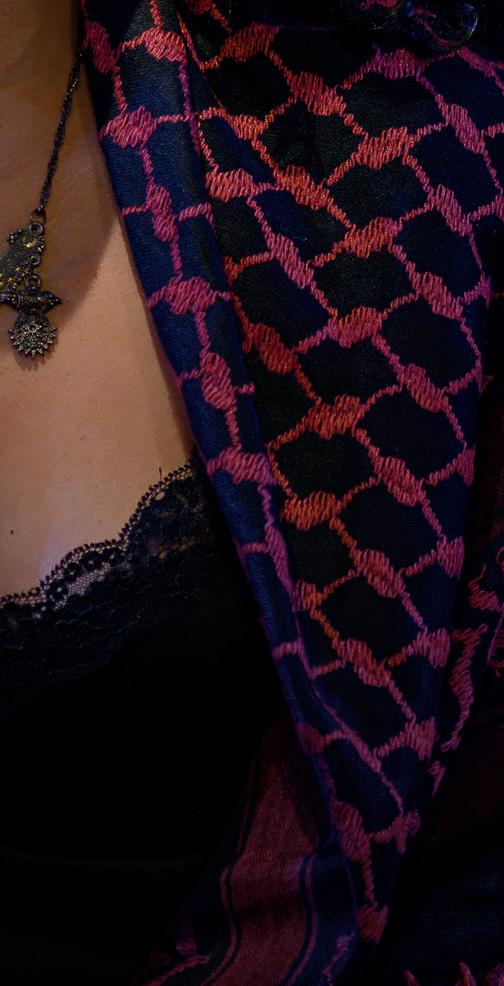

























Celebrities crop up everywhere during the Fringe. At my visit to Funz And Gamez Rebootz, the anarchic anti-kids kids’ show from Phil Ellis, QI’s Alan Davies was sat in the same row as me. Soon he found himself pulled onstage as part of a ‘pretty princess’ game, in which his son placed a frilly dress on him, drenched him in lipstick and called him Doris. ‘We don’t usually allow photos,’ shouted Ellis, ‘but in this case . . . ’ Innocent japes all around.
But that’s an early-afternoon show; the more scandalous heart of the Fringe can be found later on. Splashed across the poster for We Forgive You: The Confessional (a novelty hour in which people provide ‘real’ confessions for tittering hosts) was the gruelling phrase ‘I had a wank in the Anne Frank Museum’, which is less a knockabout confession and more an admission of a prosecutable sex crime. Maybe this was assembled by an undercover police squad to entrap criminals searching for a good night out. What other confessions have they received if this is the PG material on the poster? ‘I have murdered five people in the Chichester area, including a beloved town vicar’; ‘I have been abducting horses from stables across the UK and selling their meat to Birds Eye as a protein-rich alternative to beef’; ‘I am a stabber’. What larks, eh?
My distaste towards this sub-Cards Against Humanity toss is probably because I’m a paid-up member of the simpering arts and culture sector. That would certainly be the view of comic
Our fearless diarist Kevin Fullerton unleashes further pearls of wisdom about that Festival thing. This time, he chats about censorship, humiliation, confessions, and a pair of interloping northern brothers
Elliot Steel, who announced on Instagram that he’s ‘banning’ reviewers from his hour because he wants to poke at leftwing perspectives and thinks he’ll be punished by the Fringe’s ‘liberal bubble’. It’s a view I’m semi-sympathetic towards (I’ve met a tiny minority of reviewers who are more interested in confirmation bias than punchlines), but overall, Steel gives short shrift to the bulk of critics who can definitely take a joke.
Having said that, the sneer towards Oasis daring to perform during August has cranked open a class fissure between members of the arts community and fans of the Manc lads, with claims that the influx of bucket hatters would lead to traditional Edinburgh Festival patrons ditching the city entirely. Complaints about the ‘Oasis Effect’ on ticket sales aren’t necessarily unfair, but it’s become difficult to disentangle the disapproving tone of Kate Smurthwaite (who claimed that an audience of zero at her Free Fringe show was down to the pair’s supersonic reunion) from the horrid grotesques painted by Edinburgh councillors earlier this year when they described fans of the band as beer-swilling lunkheads prone to wild bouts of violence.
Given the broad demographic of people who were at the gig, perhaps portraying fans of the Gallaghers as hostile to the arts is as misguided as claiming all comedy reviewers are a pampered PC brigade who want their sensitivities indulged. All I know is that mentioning Oasis in this diary allows me to write off the exorbitant price of that ticket on my tax return. I hope Liam and Noel are proud of such a shameless concession to capitalism.
In this series, we ask Edinburgh Festival veterans which August shows or performers have touched their hearts or pushed their buttons. This time around, arts writer and broadcaster Nicola Meighan tells us which things . . .
Made me cry: With joy, and rage, because a fellow fan careened into me in the mosh pit and nearly broke my foot (it would have been worth it): Young Fathers at The Hub in 2016. Damn right they made that castle shake.
Made me laugh: Last year’s Chemo Savvy was a love letter to late actor Andy Gray from some of his closest pals that also sang the praises of the NHS and getting by. Its tale of cancer diagnosis and dizzying but hopeful medical statistics was shot through with ace music, questionable dancing and a psychedelic fever dream. It made me cry too, right enough . . . I am terrible at these questions.
Made me angry: Cora Bissett’s What Girls Are Made Of (2018) was a rousing celebration of her time in Darlingheart, and memories of touring with Blur and Radiohead, but also served as a riled reminder of how people (often kids; often women) can be (mis)treated in the music industry. Plus, it was about getting older, and family and loss, so it also made me laugh and cry.
Made me think: Andy Arnold’s production of Samuel Beckett’s Not I back in 2004 was wildly striking in the midst of Festival madness: a black stage, a beam of light, Pauline Goldsmith’s mouth. The absolute power of almost-nothing.
Made me think twice: In 2022, Liz Lochhead’s Medea at The Hub was searing: the horror, the vengeance, Adura Onashile’s starring role. It was evidently too thrilling by far, as I blacked out. Ice packs were administered. Given my aforesaid Young Fathers run-in, I’ll be thinking twice about setting foot in that cursed place ever again.
n Nicola Meighan presents Friday Afternoons on BBC Radio Scotland; hosts several live editions of her arts and culture podcast A Kick Up The Arts at The Stand (see akickupthearts.org for full schedule); and chairs events at the Book Festival with Hamish Hawk, Joe Boyd and Irvine Welsh (edbookfest.co.uk).

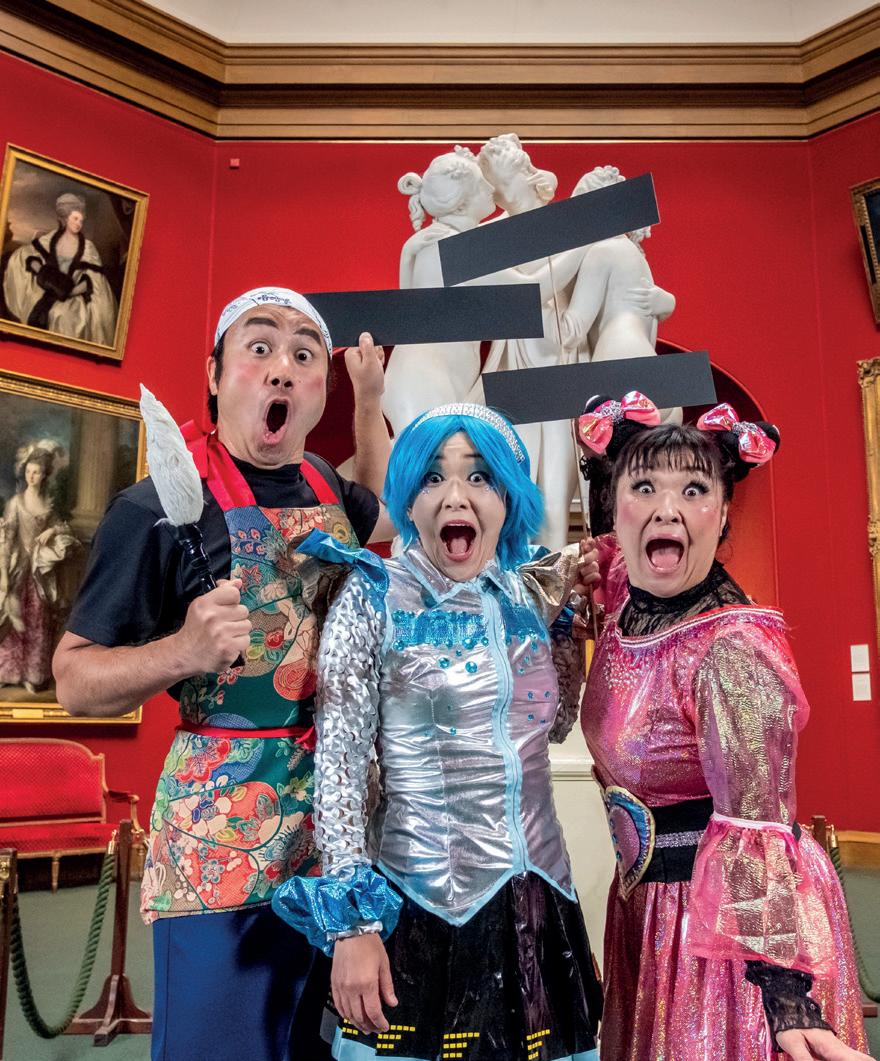
For a theatre group who are delivering a frank examination of Japanese sexual culture and poking fun at their nation’s contemporary conservatism, the Shunga Alert trio got pretty bashful at National Galleries Scotland when confronted with ‘The Three Graces’, a terribly tasteful neoclassical sculpture. Which, you have to say, is pretty ironic given their show follows an aspiring artist, a retired sex doll called Pleasure, and a rogue AI entity named Pain on their quest to craft the ultimate erotic masterpiece.
Shunga Alert, Underbelly Cowgate, until 24 August, 9.40pm.

Festival people choose the one Edinburgh event they’re most excited about. This week: film director Jaclyn Bethany
As a UK history enthusiast with Scottish roots, I am excited to see Scottish Ballet’s world premiere production of Mary, Queen Of Scots at Edinburgh International Festival. The combination of bold design and glorious choreography whilst exploring two of world history’s most iconic female leaders is enthralling. As a child on my first trip to the UK, I watched Shekhar Kapur’s Elizabeth (1998) starring Cate Blanchett on the transatlantic flight. Although I did not know I would be a filmmaker then, it began a fascination with strong women who broke down walls in pursuit of greatness. It’s wonderful to see this ballet produced and inspire the next generation of women.
The world premiere of In Transit, directed by Jaclyn Bethany, takes place at Filmhouse, 17 August, 9.15pm (also screening at Cameo, 18 August, 9.45pm; Vue, 19 August, 1.30pm; Hawthornden, 19 August, 6.45pm); Mary, Queen Of Scots, Festival Theatre, 15 August, 8pm; 16 August, 2.30pm, 7.30pm; 17 August, 3pm.

We look into The List’s 39-year back catalogue to see what was making headlines this week in decades gone by
It’s our final trip down memory lane this Festival season and our latest excursion has landed us slap bang in the middle of the 1990s. Our cover celebrated the arrival of German choreographer Pina Bausch, or as we called her ‘the doyenne of European dance theatre’, as she presented her show Nelken to audiences at the Playhouse. Elsewhere, we interviewed Iain Banks on his new novel Whit and spotlighted the inaugural Mela, a carnival at Meadowbank Stadium to celebrate Edinburgh’s multicultural residents, and which drew the curtain on the city’s Festival month.
Head to archive.list.co.uk to read our past issues.
If you’re struggling to summon the energy for this final stretch of August, we’d recommend tucking yourself away with noise-cancelling headphones and indulging in the ambient sounds of this final Festival issue. Be serenaded by Matt Monro, Bon Iver, REM, The Cure, Def Leppard, David Bowie and many more . . .
Scan and listen as you read:

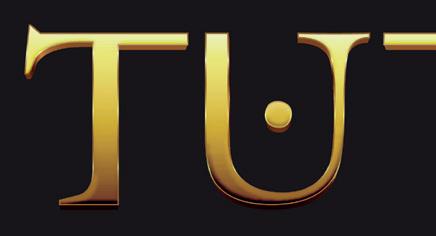






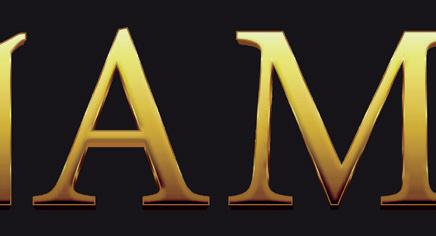









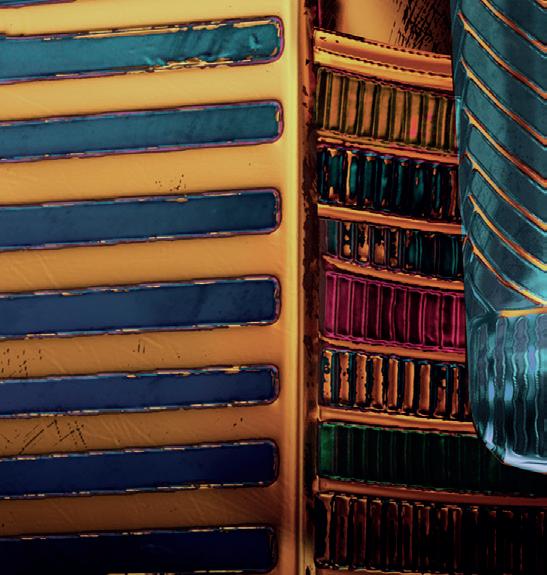


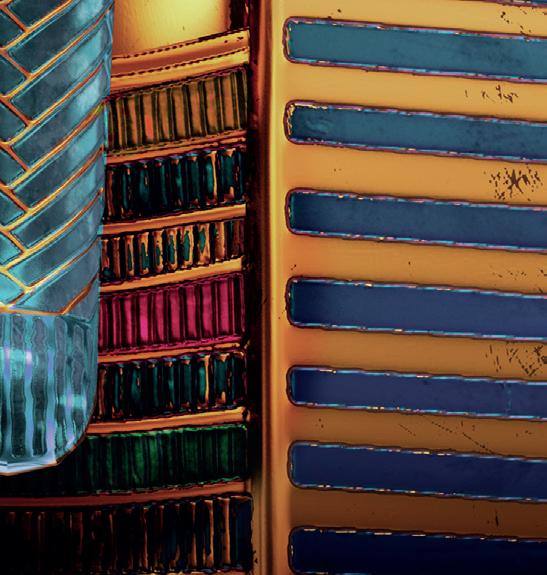





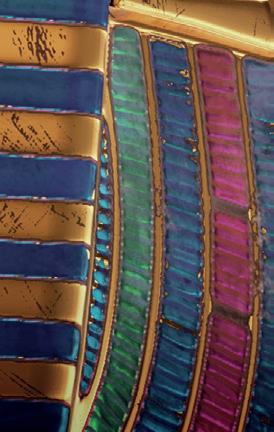






















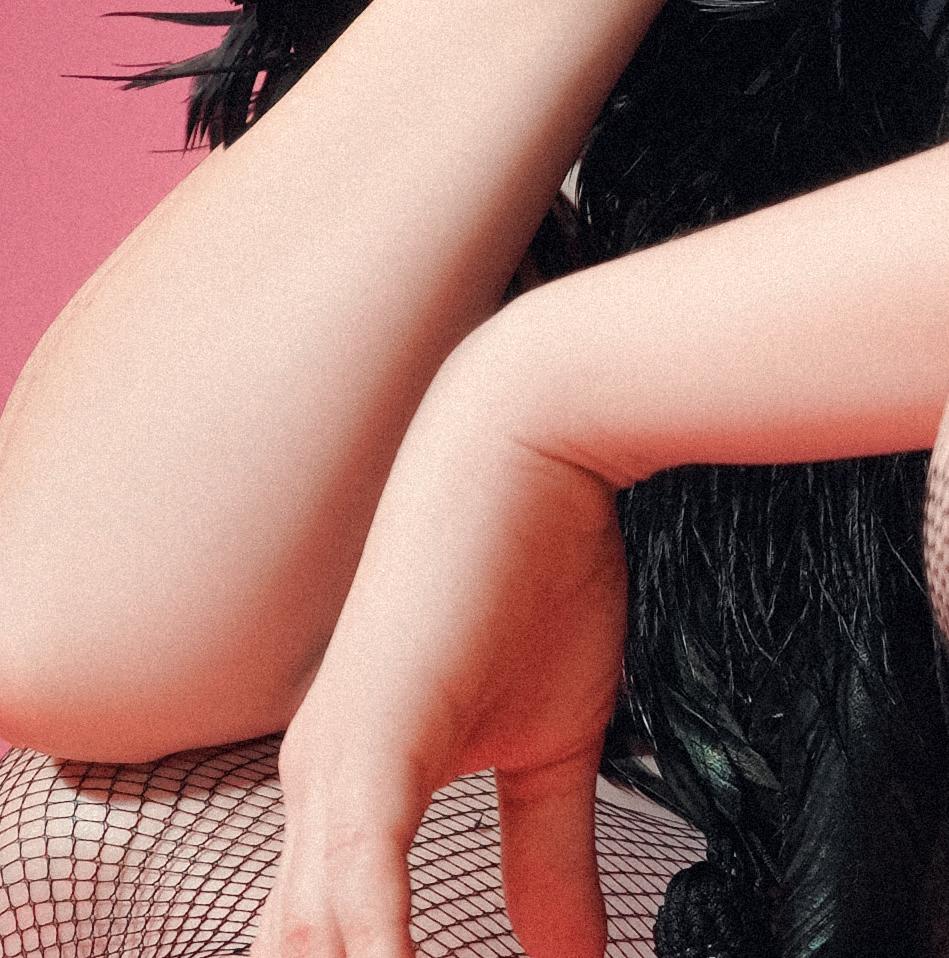
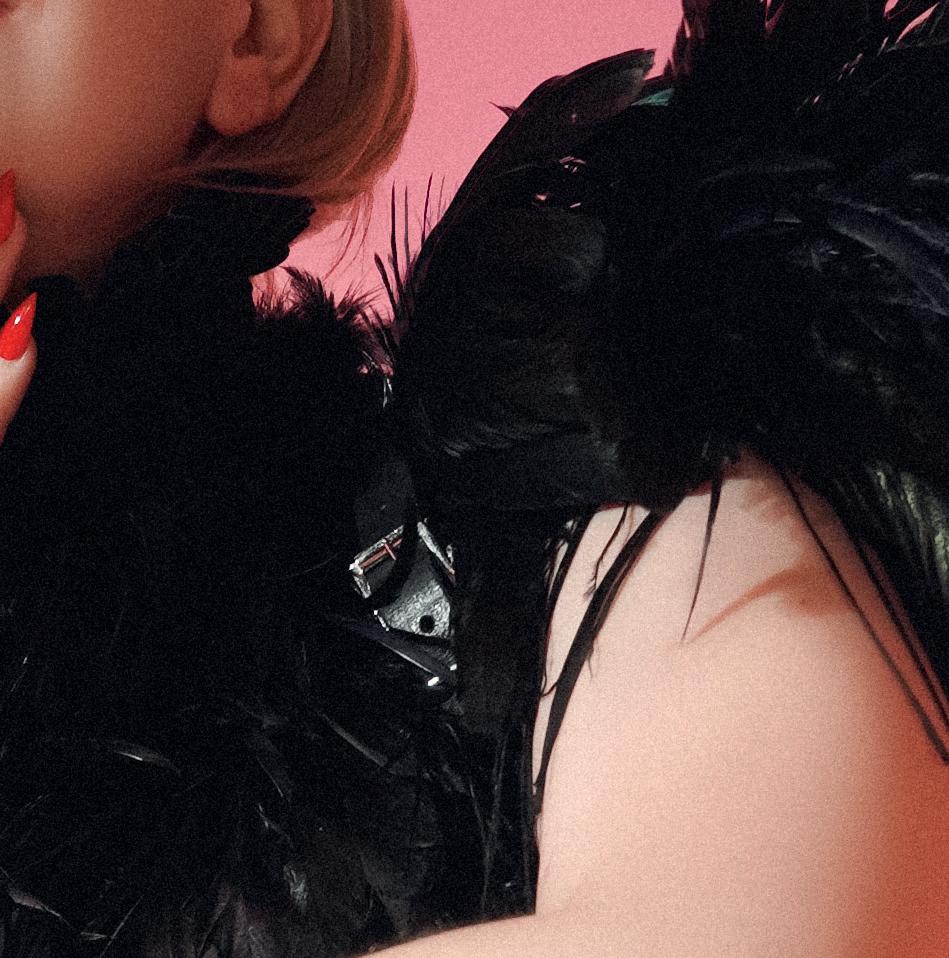

A queer variety cabaret with contortionists and fire-eaters may be a terrifying proposition for some audiences. With her Club Kabarett, Bernie Dieter offers an experience that is exhilarating yet safe, bold but comforting, a welcome space for a broad range of tastes. She tells Claire Sawers that her ultimate mission is to unite people and eliminate some of the toxicity that is poisoning the world >>


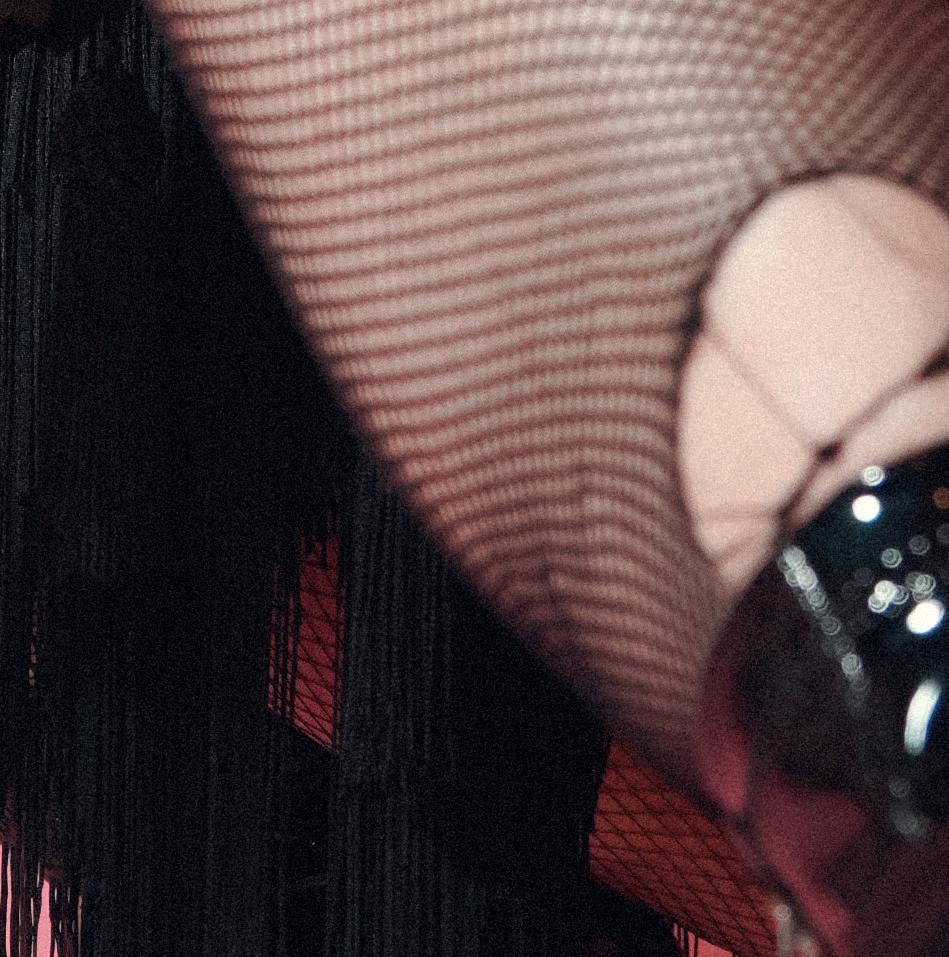





Bernie Dieter’s grandma grew up in a travelling circus and was once smuggled over the border into West Germany in a caravan, hidden under a pile of sequined costumes. Dieter didn’t know about this until well into her own career as a cabaret singer, performing in shows inspired by Berlin’s legendary Weimar Republic nightclubs. Dieter embraced the spirit of those sexually liberated, hedonistic spaces, where difference was celebrated and politics were examined through satire. Before Nazism gripped Europe, this was a decadent Golden Age; only during the onset of dementia did Dieter’s Oma begin reminiscing about life in war-torn Germany, and the granddaughter realised that the apple hadn’t fallen too far from the tree. Of course she would end up travelling with a sequined show, impressing and uniting people in divisive times.
‘Yes, the back story part about my Oma is all true; it’s in my blood,’ says Dieter, real name Jen Byrne, a half-German, half-Australian diva who oversees 70 minutes of truly thrilling, filthy, uninhibited fun in Bernie Dieter’s Club Kabarett. It was a hit at Underbelly Soho Boulevard in London and has already enjoyed sold-out seasons in

Melbourne, Budapest and Japan. Now Dieter has returned to Edinburgh for the first time since 2019. Her cherry-picked troupe of five circus and burlesque performers are all fabulous, taking turns to blow minds and drop jaws with contortionism, trapeze, fire and drag skills. But it’s the vampy Dieter that stitches it all together, stalking the room in stilettos, unapologetically pleasure-seeking, purring at her front row, unsuppressing one crowd member at a time.
‘I’ve got to break down the barriers as fast as possible,’ says Dieter in her offstage accent: less thick German, more soft Aussie. Minutes into the show, we’re watching the Mistress Of Mayhem being stroked by four men from the crowd, a blur of hands on her thighs, shoulders, and then, with very minimal encouragement, each other. ‘A crowd might start off reserved, but if you give them a little bit of permission, it goes a long way. Things can escalate quickly and they really go for it,’ she smiles.
Writhing onstage in a black bodysock, with glitter handprints embossed all over, she coos her message about these horribly isolated times that we live in, and the need for ‘beautiful connection, babies!’ She invites us to ‘be whoever the fuck you want to be!’ The crowd, some waving tiny flags
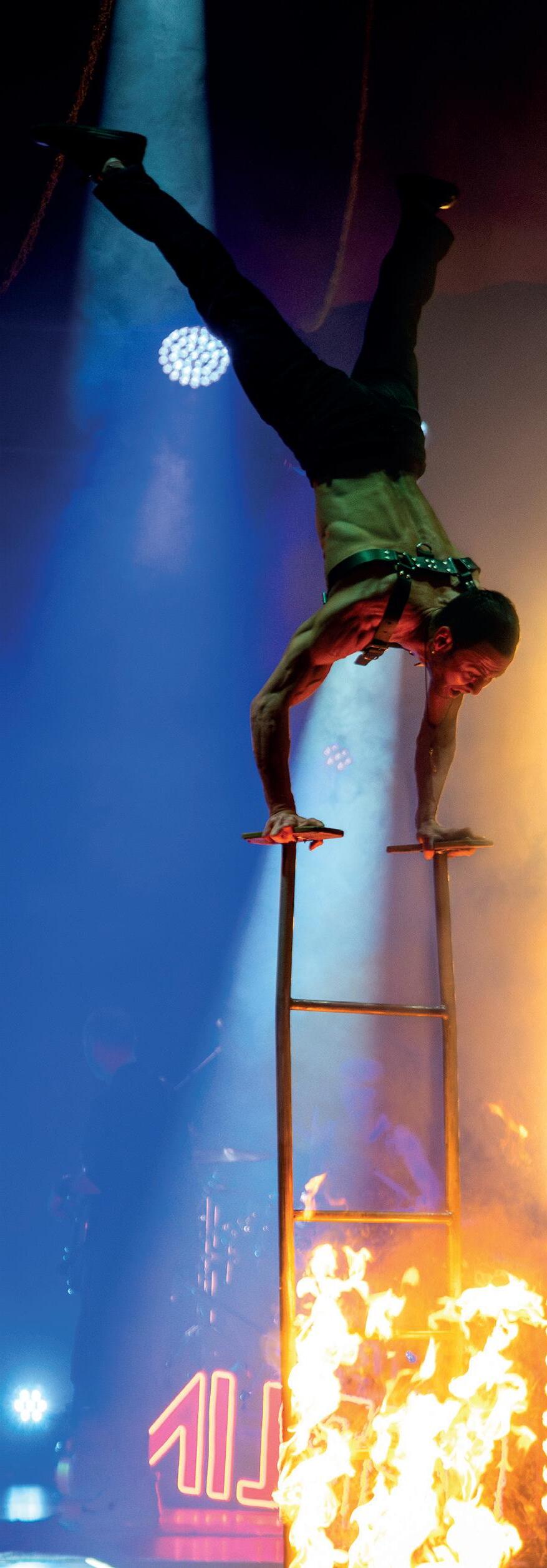

handed out earlier saying ‘Weirdo’, ‘Punk’, ‘Slut’ and ‘Filthy’, don’t seem to need much fluffing; they’re quickly bewitched and onboard.
Then Dieter gets her freaks on. Russia-born Danik Abishev is an impish acrobat in jeans and black nipple pasties, jumping lithely on his hands, fanning his limbs flawlessly through the air with pointed toes while Dieter sings her cover of Prince’s ‘Kiss’. Jacqueline Furey is a stripteaser in black lingerie who breathes fire. We can literally feel the heat halfway up the Spiegeltent as she whirls her torches around (not a euphemism), swigging from a hip flask, then dabbing her mouth delicately after yawning a giant blaze into the air.
Iva Rosebud is a statuesque, moustachioed drag queen in slippery pink silk, lipsyncing flirtatiously to ‘La Vie En Rose’ before removing a few petals. Then several more. Soliana Ersie is a contortionist extraordinaire, never dropping her glowing smile as her legs wrap into cubist shapes around her ears while her toes scuttle around, seemingly independent from her body. Some may remember Jarred Dewey, the stunning aerial trapeze artist from Party Ghost, a wonderfully macabre Fringe drag cabaret from 2023. He has legs that go on for days, plus an extra ten

inches in sparkly porn heels, and he wraps his legs gracefully around poles, drawing gasps and oohs as he goes. ‘What can I say? I have very talented friends,’ shrugs Dieter after the show when I ask how she gathered up her impressive team of misfits.
‘I studied law before doing this,’ says Furey, wiping off her make-up before the performers go for a post-show wine. ‘That felt like a tiny death; and not in a fun way,’ she laughs (Dieter once ran a cabaret night in Berlin called the Little Death Club). ‘I thought I’d rather die than do this, so I quit. My soul was dying every day I wasn’t a performer. I’ve been working with the amazing Bernie Dieter for ages,’ adds Furey, who does a death-defying trick with an LED sword that many assume must be fake. It’s not. ‘I was lucky; the company gave me an amazingly huge stage, and they are really safety focused. Being a really riskaverse person actually makes me really good at this job.’ Safety was on everyone’s minds the previous night when Club Kabarett was cancelled as a precaution due to the raging Storm Floris.
Each performer creates their own routine, but the overall show is very collaborative. Dewey hand-makes his own costumes, for example, >>

including a very elegant pair of high-waisted velvet knickers, with a jewelled eye on the back. Dieter picks tracks for performers and they adapt their set to the music; she adds her laugh over the catchy ‘Haha’ by Belgian electropop duo Charlotte Adigéry & Bolis Pupul during Ersie’s set, and boldly covers Nena’s ‘99 Red Balloons’ while Rosebud does something unforgettable with a birthday cake.
‘There is a real authenticity in this show, despite cabaret being so showy and beautiful; the actual core of it is really us,’ says Dewey. ‘Our DNA is in the show. I’ve done lots of contemporary circus but in this I feel the most seen. It’s so amazing to see Iva come out as a drag queen; some have seen drag queens before, some maybe never have. But everyone is having a good time and laughing together. It’s a celebration. That’s the power of queer art; especially when you’re inviting everyone in on it.’
This gender-bending cabaret does not want to make anyone feel left out. It’s not just about sexuality; the messages it spreads are of self-acceptance, freedom, fun, pleasure and bodily autonomy. One of the show’s most rousing moments is a call-to-arms torch song, with references to Roe vs Wade, where Dieter is defiant, spreading wings on a dress that reads ‘my body, my choice, you will never own me’.
‘The show has a broad audience,’ Dieter says. ‘We want to make a safe space for everyone. We want the older man who has maybe felt alienated in nights that are exclusively queer to come here and have a great time. Women too. People from all walks of life. To feel valued. And moved. To address some of the things going on right now that affect us all.’
Dieter wears a dress at the end with ‘Mother’ embroidered many times on it. She doesn’t have children of her own but considers the performers and the people who come to see the show as her babies. ‘Yeah, it’s showing I’m there to take care of them. You can come along, have a laugh and a drink and leave happy. Simple. “Woo, we saw a willy tonight! And tits!”’ she jokes. ‘But it’s also an important place to introduce some American and UK politics, to think about how we are affected by toxic masculinity, horrible people like Andrew Tate. There is something similar about that time, when my Oma was being smuggled over the border, and now. That division among people is very extreme and visceral right now. Everything is forcing us into polar opposites; you can’t be in the middle, or be unsure of your opinion, it becomes very tribal. People are scared. They need a place to come, feel safe. Connection is really the antidote.’
Bernie Dieter’s Club Kabarett, Underbelly Circus Hub, until 23 August, 7.20pm.

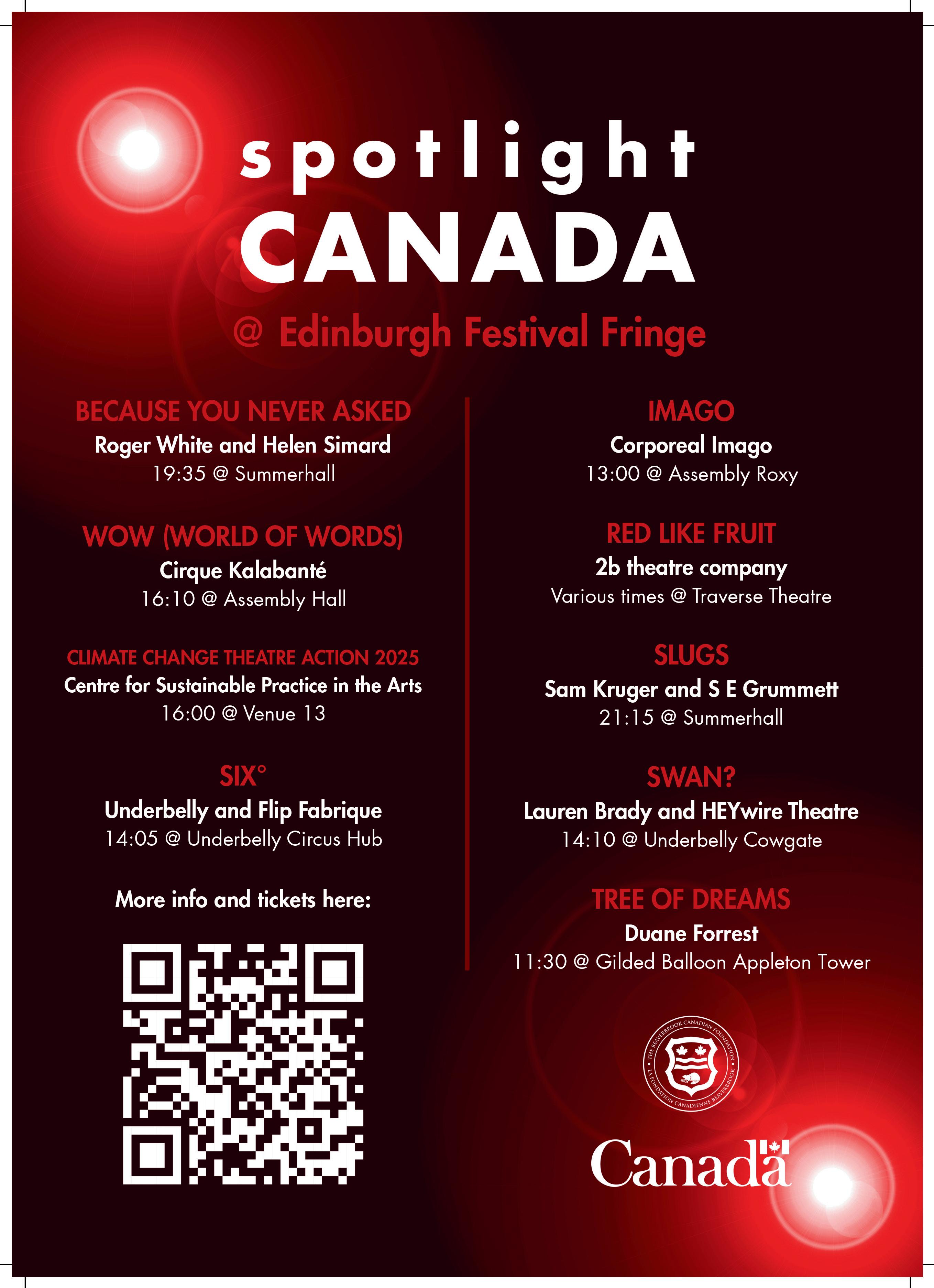

In his latest book, the transhumanist thriller For Emma, Ewan Morrison has penned a modern parable about a grieving, vengeful father whose daughter dies when a secret AI brainchip experiment goes horribly wrong. In this piece, the acclaimed Scottish author discusses the rise of bots and assures us just how simple it will be for technology to control humans
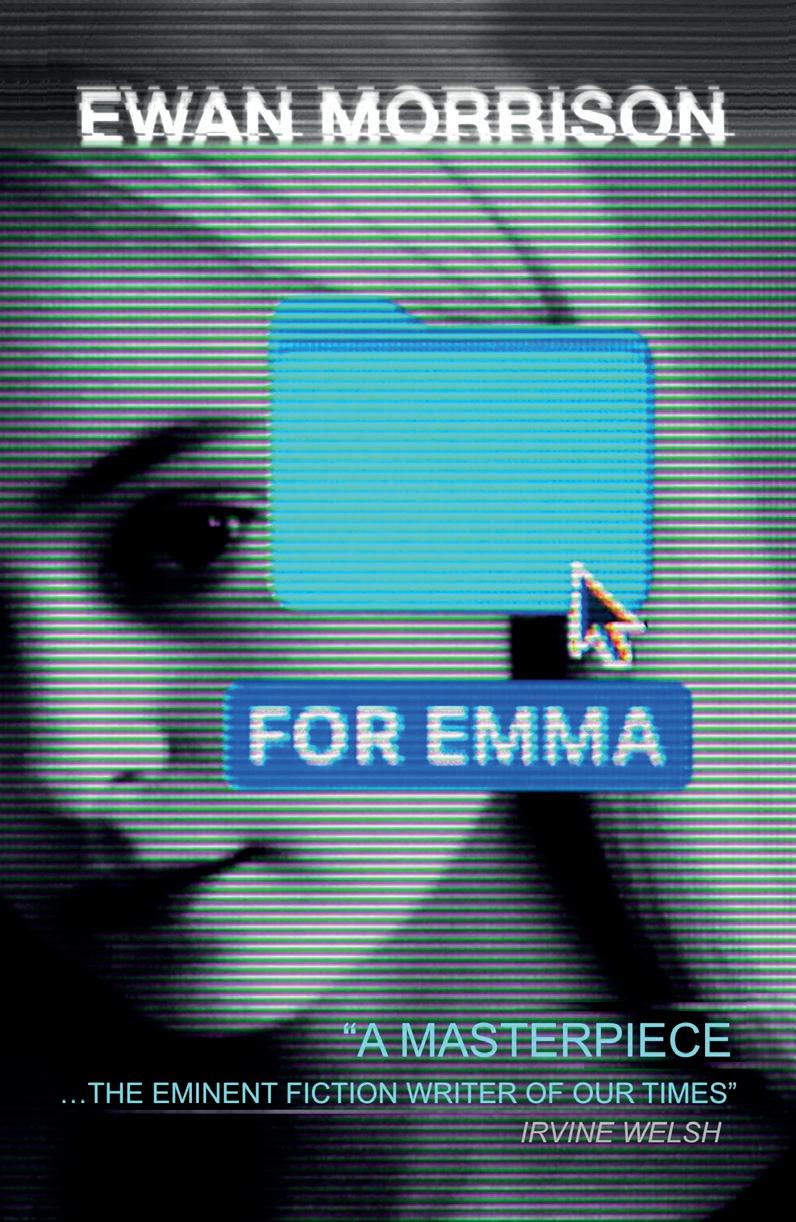

You might know this: the best way to fell a tree is not to hit it with an axe, but to make a small incision, then insert a V-shaped metal wedge into the crack, and then drive it into the wood with a sledgehammer. With each blow, the wedge gets driven deeper and it splits the wood to the core. Huge trees get taken down like this. The Soviets also talked of ‘driving the red wedge’ and for them it meant exploiting divisions within capitalist imperialist societies to weaken and overthrow the existing order.
Today the wedge that splits things apart is technology.
Over the last two decades technology has been inserted into the small gaps between people, and then as the technology has grown, it has pushed people apart. We’re reaching the point now where the technological wedge has been driven so far into our society, that all our social relations are splitting.
The technological wedge works in three stages:
Stage 1. A new technology begins as novelty.
Stage 2. Then it creates human dependence and addiction.
Stage 3. Then it replaces humans completely.
Take online dating.
Stage 1. Dating websites were introduced as a novelty in the late 90s. Only a small percentage of the population experimented with them. But they gained in popularity through the 2000s as mobile apps developed.
Stage 2. By 2020, 48% people aged 18–29 had dating apps, and were using algorithms to select potential dates. Dating app dependence meant an increasing number of women said they’d feel unsafe if a stranger approached them IRL without prior digital interaction, while at the same time ‘the loneliness epidemic’ grew.
Stage 3. In 2025, Gen Z spends 51 minutes per day on dating apps, yet 79% report ‘dating app burnout’. Amid the loneliness epidemic, tech leaders like Zuckerberg propose AI companions as a solution. Now, you don’t date through the app, you date the app itself.
The wedge begins as a novelty, it becomes a dependence/addiction, then it replaces humans. As Jacques Ellul warned us, more technology is posed as the solution to problems caused by technology. Take smartphones. They were introduced as a novel way to increase
ease of communication, but then as the technological wedge got driven in deeper, it pushed people apart and forced us to depend on it. Soon all our interactions became mediated by smartphone apps. Today we use them for banking, navigation, gaming, delivery, job searches, dictation, and remote work.
We no longer shop in shops, we no longer cook but have food delivered, we no longer socialise without scrolling and sharing clips, we consume only the music, films and books that are recommended to us by our ‘personalised’ algorithms. Our smartphone now extends to the smart network of our smart doorbells, fridges and wrist-watches that monitor us 24/7, ‘for our health and safety’.
The wedge has been driven in. We’re now replacing real human contact in areas we would have thought impossible only five years ago. Now AI agents can be AI grief bots that are supposed to help you recover from bereavement. There are also AI lovers and AI therapists, and they are replacing real living humans in these roles. These were merely simple chatbots five years ago.
Another example: remember those apps that turned a photo of your face into a cute animal, or a baby, or an old person? Well, those billions of images we generated ‘for fun’ fed the growth of ‘facial recognition’ AI. This technology is now used in ‘preventative policing’ and in creating military kill lists. In the near future our faces will be used as the passkey for all our banking, purchase and security transactions. It starts as a novelty then it grows to the point where your life depends on it.
The question today is can we remove this wedge that has been pushed in between people? Can we still interact with our fellow workers, our partners and our children, without technology forcing us apart and making us dependent on it? Or has the wedge already been driven in too deeply?
Ewan Morrison: Digital Immortality, 14 August, 3pm; Ewan Morrison & Doug Johnstone, 19 August, 3.45pm; both events at Edinburgh Futures Institute; For Emma is out now published by Leamington Books.

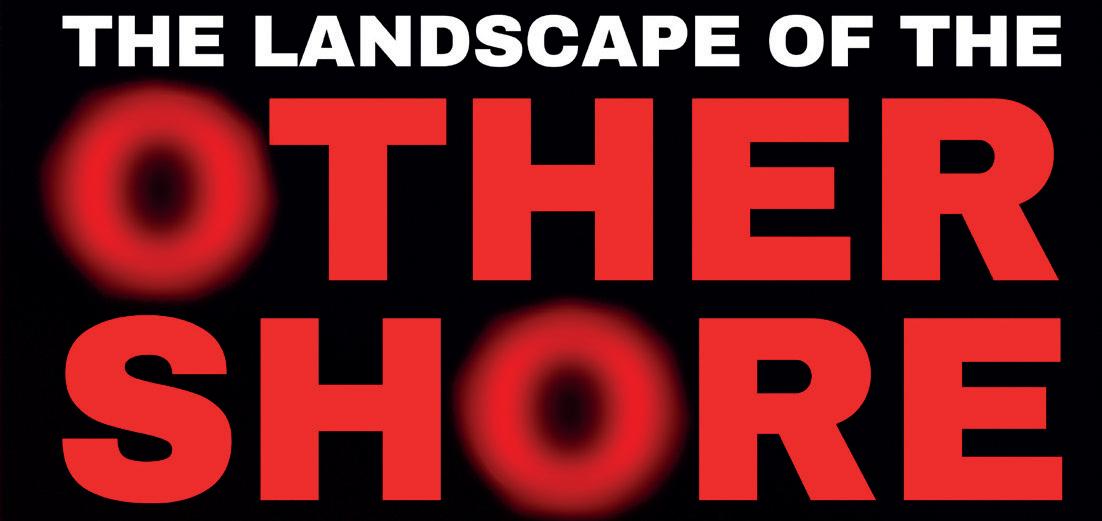
At this year’s Edinburgh Festival Fringe, The Landscape of the Other Shore unfolded as a haunting parable of human nature, told through minimalist movement, shadow, and projection.

Mon–Sat, 10am–5pm 31 JUL —30 OCT
Honouring


parliament.scot/Miralles
Created by the 201 Theatre Company of the School of Arts at Shenzhen University, the production draws inspiration from Giorgio de Chirico’s painting The Raft of the Medusa and the expressionist play of the same name by Georg Kaiser. The work strips away gender, nationality, and identity, asking: when everything is removed, what remains of a person?
We spoke with director Hu Yaguang about the origins of this piece, the collaborative process behind it, and the long journey from Shenzhen to Edinburgh.
READ THE FULL INTERVIEW WITH DIRECTOR HU YAGUANG

in partnership with














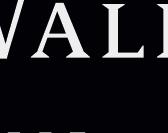















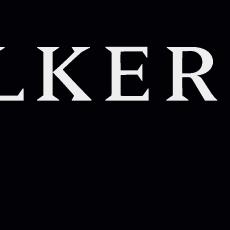



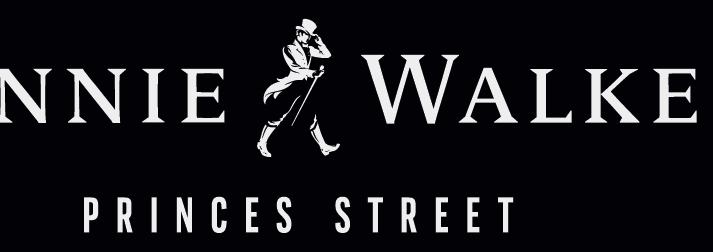


Friday 22 August






















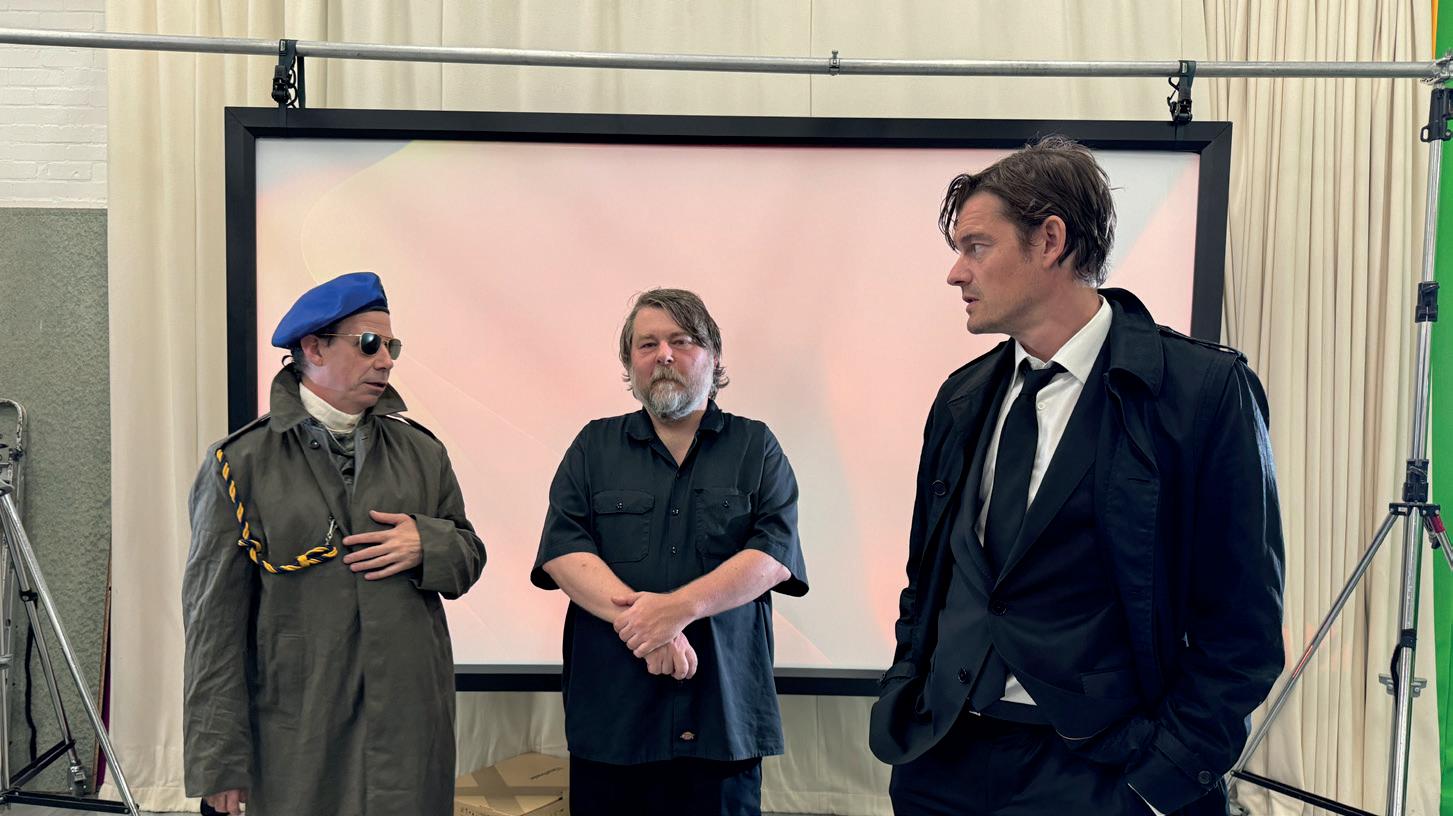






TWith his new film Bulk receiving its world premiere at the Film Festival, director Ben Wheatley is revelling in the creative control and handmade ethic that inspired it. He talks to James Mottram about the influence of old-school sci-fi on his work and the pros and cons of cult vs big studio moviemaking
here couldn’t be a better choice than Bulk for a Midnight Madness slot at this year’s Edinburgh International Film Festival. ‘I mean, it’s a midnight movie,’ reasons its writerdirector Ben Wheatley, when we speak over Zoom. ‘It’s a midnight cinema experience. It’s a kind of late-night, Channel 4-in-the-80s experience, when you possibly miss the titles and don’t know what it is, and you’ve accidentally tuned into it.’
British-born Wheatley is no stranger to cult moviemaking. His second film Kill List, about two hitmen, broke him out as a filmmaker of distinction. Since then, he’s adapted JG Ballard (HighRise), crafted a hallucinogenic period piece (A Field In England) and equally trippy folk horror (In The Earth), and made a zombie comedy series for Channel 4 (Generation Z); all unique in their own way. ‘I’m always chasing the experience of seeing that gonzo movie for the first time,’ he says, ‘and going “oh my god, what was that? I haven’t seen this before.”’
That’s certainly the case with Bulk, a cunning black-andwhite sci-fi that harks back to French New Wave works such as Jean-Luc Godard’s Alphaville. Sam Riley, who has worked with Wheatley three times before (most recently in his 2020 Daphne du Maurier adaptation Rebecca) stars as Harlan, a freelance journalist kidnapped and caught up in a bizarre inter-dimensional hunt for a scientist. Co-starring Riley’s real-life wife Alexandra Maria Lara, alongside Noah Taylor and Mark Monero, Wheatley wrote it with that cast in mind.
In the case of Riley, who launched his career with Control, the Joy Division film that screened at the 2007 Film Festival, it’s a rare lead. ‘In the films I’ve done,’ notes Wheatley, ‘he’s played rougher characters; they’re kind of sneaky and evil. But this is the first time I’ve got to have him as a hero, which is great.’ Certainly, he’s perfect as the world-weary lead in the Bogart mould, I suggest. ‘I think he’s more like Alain Delon,’ Wheatley counters. ‘We always joke about him looking like Delon in Le Samouraï.’
Bulk’s homespun flavour comes from Wheatley’s deployment of old-school filmmaking techniques, from rear projection to false perspectives and model-making. For one scene, as helicopters streak >>


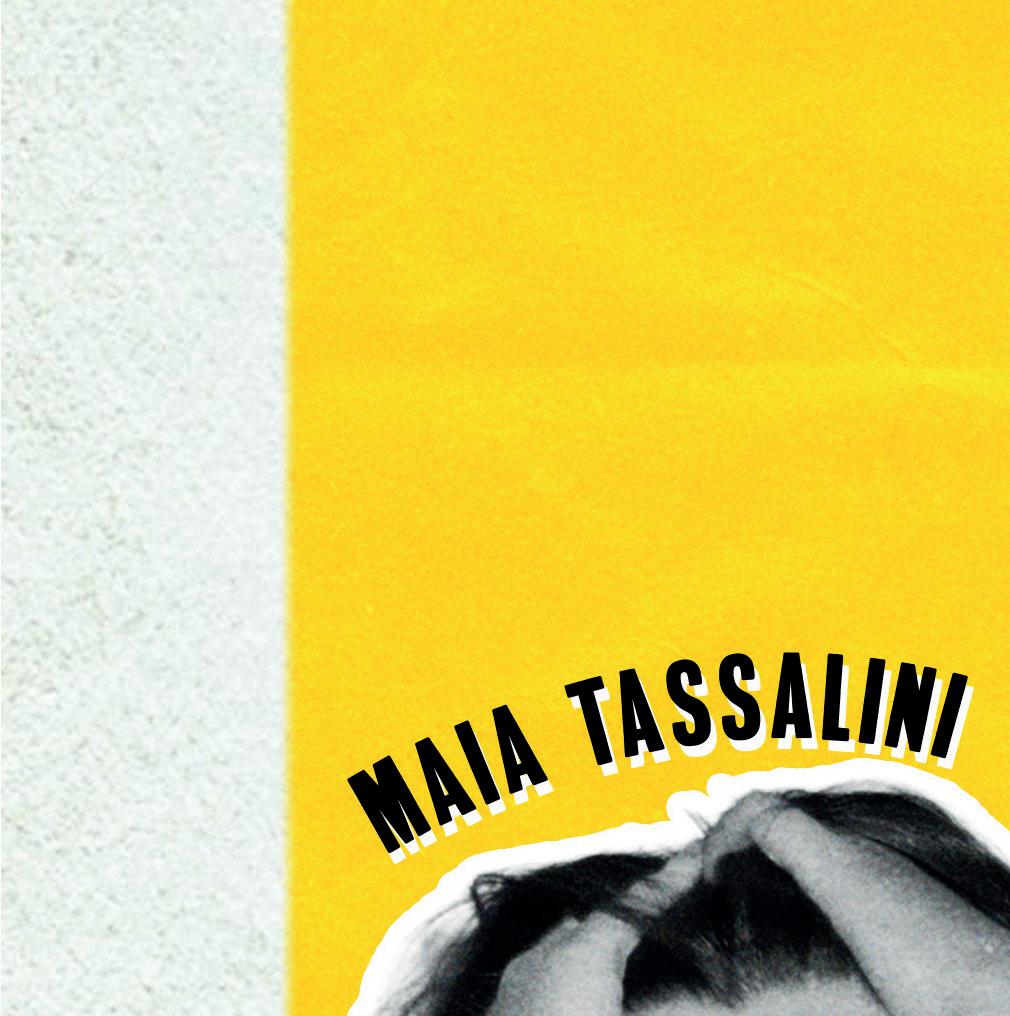








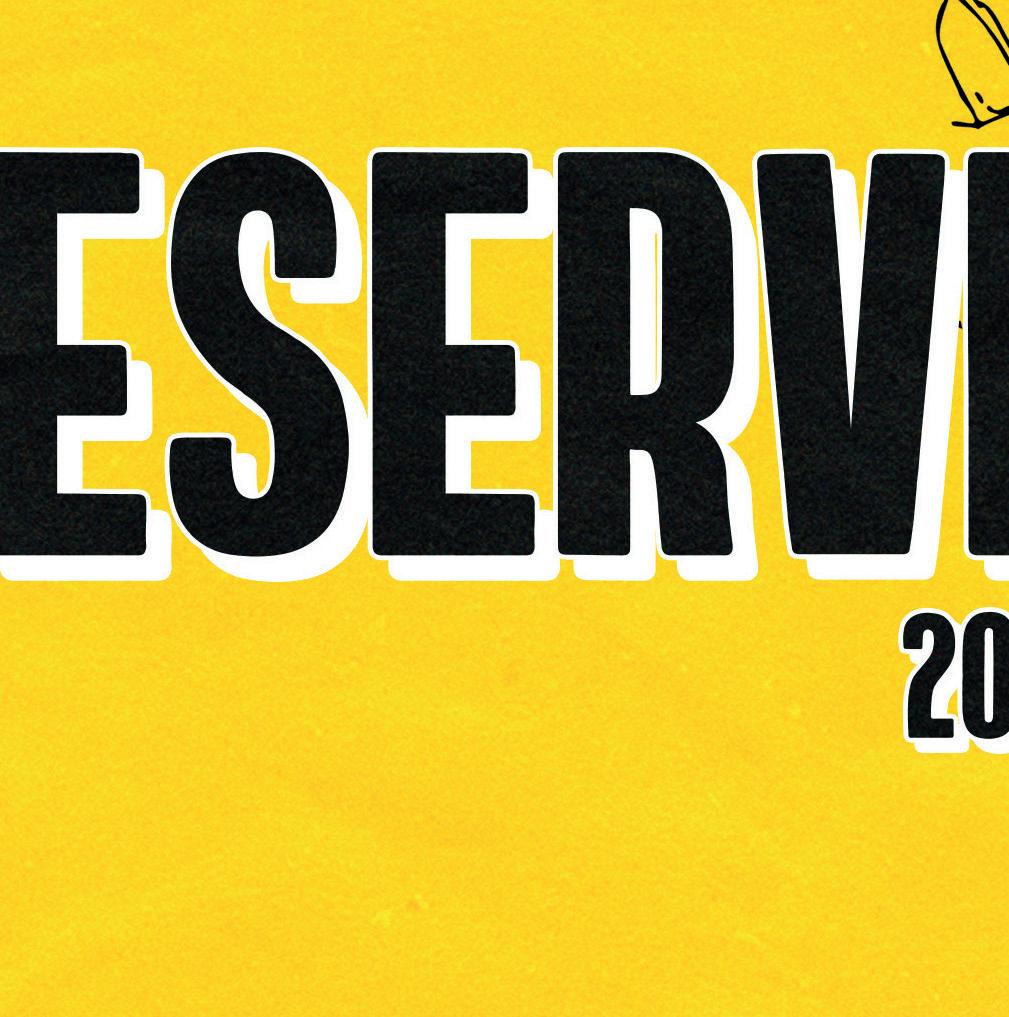
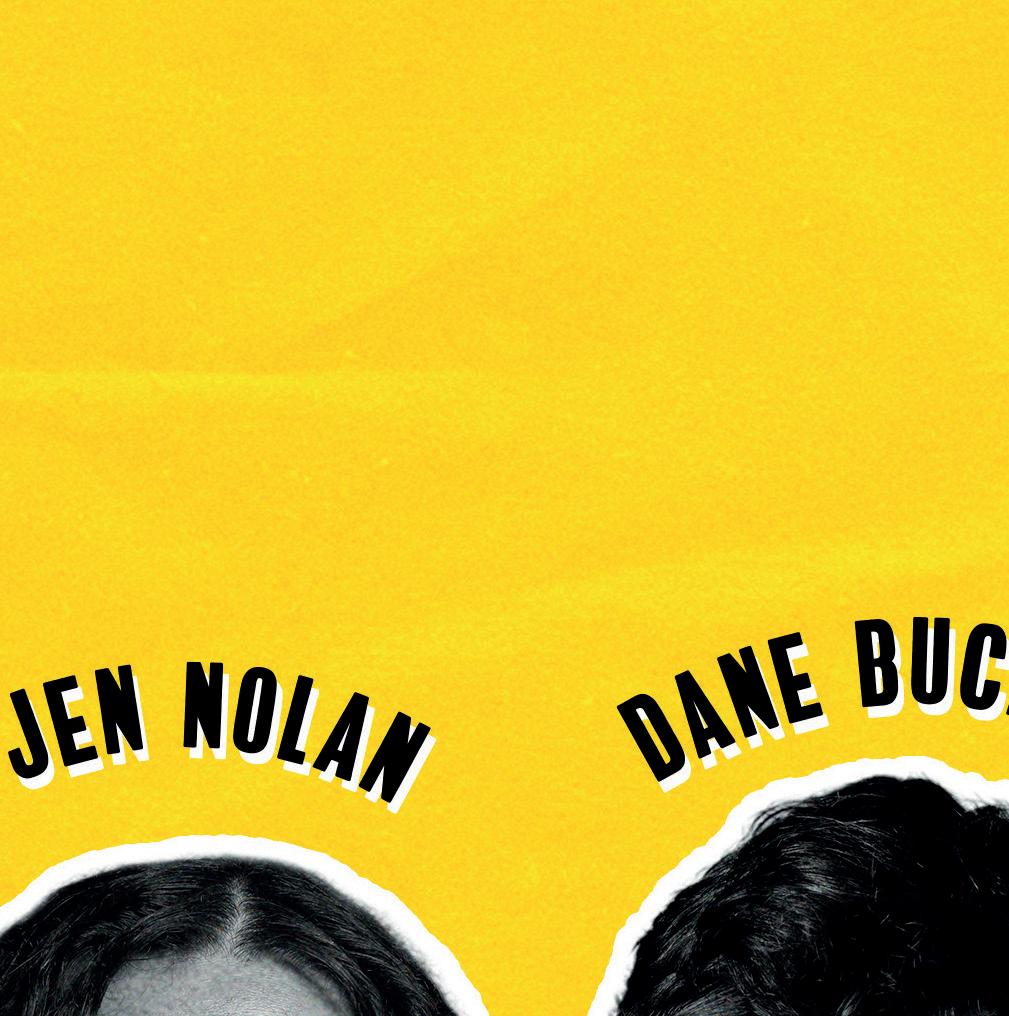





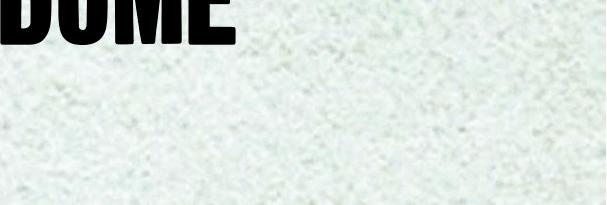
across the sky, Wheatley used Airfix kits bought from eBay. ‘I’d gone back and watched a lot of the Harryhausen films and Švankmajer, and lots of stuff that use stop-motion animation and models. And I thought “I want to investigate this.”’ The effect is a woozy, unreal quality. ‘The whole film is like that,’ he insists. ‘I mean, all the guns they have are all cardboard. And when they go into that control room that they’re in, there’s no props in there. That’s all photocopies. Stuff photocopied onto bits of paper. But it looks right. It’s also set up as a fantasy as well. So it’s not real, any of it. It allows itself to be that. I think if you did that and you were trying to say to the audience “everything was real”, it would be a harder trick to pull off.’
Wheatley has always been an avid fan of a certain type of scifi from his childhood. ‘Doctor Who cast a long shadow for me, certainly the 70s Doctor Who,’ he admits (he even shot two Peter Capaldi-starring episodes of the landmark BBC series). Similarly influenced by writer Nigel Kneale (creator of The Quatermass Experiment) and the influential comic 2000 AD, Wheatley wrote his own graphic novel, Utility, a few years back. With its cosmic tale of superheroes and clockwork knights, Utility proved highly influential. ‘That way of writing, which is completely like freeform jazz, really affected how I wrote Bulk which is more like my comic work than my film work in a way. It’s lighter on its feet and it deals with much bigger ideas and concepts, but then just is happy to throw them away and jump onto the next one as fast as possible.’
With its handful of locations recalling the small-scale nature of his 2009 debut Down Terrace, a claustrophobic tale about a criminal family, Wheatley says ‘the cottage industry and the craft of this film was interesting to me. To have it so handmade was really good and enjoyable. People think that the more money you have, the more that you get to do. But the reality is the reverse. The less money in the budget, the more creative you can be and the more control you have.’
His last film was his first mega-budget movie, Meg 2: The Trench, sequel to 2018’s Jason Statham shark movie. Tackling a Hollywood blockbuster inevitably meant ceding control. So it’s no surprise Wheatley has returned with something small. ‘I wanted to make something that I felt free making, which I got to do,’ he says. ‘It’s not gone through any kind of mediation or testing or conversations or re-editing, particularly. This is kind of a pure statement.’ When we speak, Wheatley is finishing his next film, Normal, which looks like it fits somewhere between Bulk and The Meg 2 in scale terms. Starring Better Call Saul’s brilliant Bob Odenkirk, ‘it’s like the more commercial cousin of Free Fire; it has the gonzo action of Free Fire,’ Wheatley reveals, alluding to his own warehouse-set, gun-crazy thriller from 2016, ‘but then it has a more considered Bob Odenkirkian dramatic structure and pace.’
Although clearly at his most comfortable and creative making a film like Bulk, Wheatley has no regrets about dipping his toe in the studio waters. ‘It’s hard when you’re spending that much money. It’s got to work everywhere. It was interesting with Meg They had audiences all over the globe that they were excited about. If you want it to work in that way, you have to appreciate all these different audiences. And it starts to rub the edges off stuff a bit. I like those films, though, as well. It doesn’t bother me. As long as it’s like a balanced diet of other types of movies. As long as that’s not exclusively what you have to watch.’
Bulk, Cameo, 14 August, 11.55pm; Hawthornden, 15 August, 4pm; Vue, 15 August, 9.30pm; Ben Wheatley and producer Andy Starke In Conversation event, Central Hall, 15 August, 1.30pm.




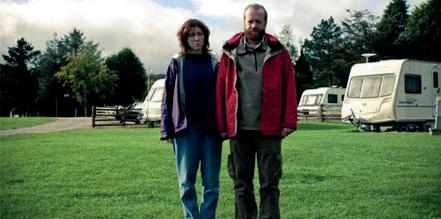


Part elegy to the casualties of climate change, part hopeful meditation on the power of human connection, dance company NDT and theatre makers Complicité have joined forces in a powerful collaboration. Lucy Ribchester heads for Berlin to meet the creative team behind Figures In Extinction, a show set to provoke and mesmerise at the International Festival
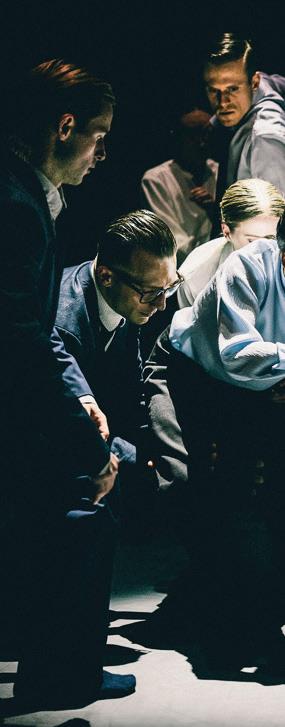
The week Figures In Extinction opens at Berlin’s Deutsche Oper, a heatwave is burning a path through Europe. It’s an ominous chiming of the themes this piece grapples with (climate breakdown, destruction of the planet) and is very much not a drill. Over the course of ten days, news outlets estimate that 2300 people died across 12 European cities, while biologists warn of stress and behavioural changes in wildlife. The day before the company arrive in Berlin, the mercury hits 37 degrees. If there was ever a show to be grimly prescient, it is this collaboration between theatre company Complicité and dance troupe Nederlands Dans Theater (NDT). How does it feel for both companies seeing and feeling the production’s themes played out in real time? ‘Unfortunately, extremely relevant,’ says Emily Molnar, artistic director of NDT, as we sit in the dark-but-still stiflingly warm auditorium of the Deutsche Oper. ‘It makes me even more confident about the fact that we pursued doing this for four years.’ Dance, Molnar says, can often be quite an abstract medium with which to tackle complex issues but, through the collaboration between choreographer Crystal Pite and director Simon McBurney, both companies found a way





to integrate voice, body and visuals to create a coherent response to ‘very deep questions and topics’.
Molnar was always keen, however, that the piece, despite an unflinching approach to its subject, would also carry a kernel of hope. ‘It is extremely important (and I think they do it in a very respectful way) that people don’t walk away feeling like they can’t take action,’ she says. We humans may have lost our way, but Molnar firmly believes we have the power to bring ourselves back. ‘The minute we don’t look at ourselves and the people next to us, then we can let other parts of the natural world go. But the minute that we check in and go deeper and listen from the inside, you can’t let your neighbour not be noticed.’
The production came together in stages, constructed in three separate parts, created across continents by Canada-based Pite and Londonbased McBurney, working via Zoom calls and in-person rehearsals. In ‘1.0’, dancers take the form of extinct animals (and even landscapes), majestically conjuring Pyrenean ibexes, flickering birds, shoals of fish and arctic tundra. Providing counterpoint to these tender elegies is a
climate-change denier, lip-syncing a slick monologue, using the amplified gestures that have become a trademark of choreographer Pite’s work and reminding us of the human agency behind the mass extinction.
‘2.0’ homes in on our brains, with dancers drilling movement patterns to a soundtrack of neuroscientist Iain McGilchrist’s seminal lecture on left and right brain hemispheres. As our technological ‘development’ as a species spirals into chaos, a moment of beautiful, breathtaking physical connection between two performers reignites the power of touch and understanding. In the final part, ‘3.0’, rituals of death are explored in personal and visceral detail.
This last part has been in some ways the most emotional for the dancers to perform, as it calls on their personal histories and experiences with death. ‘We had a long process of digging up a lot of our personal lives,’ explains principal dancer Nicole Ward. ‘It starts with us speaking about our family trees. We spent quite a few weeks with each of us sharing our families. We didn’t know each other in that way, so it holds a lot of care between us.’


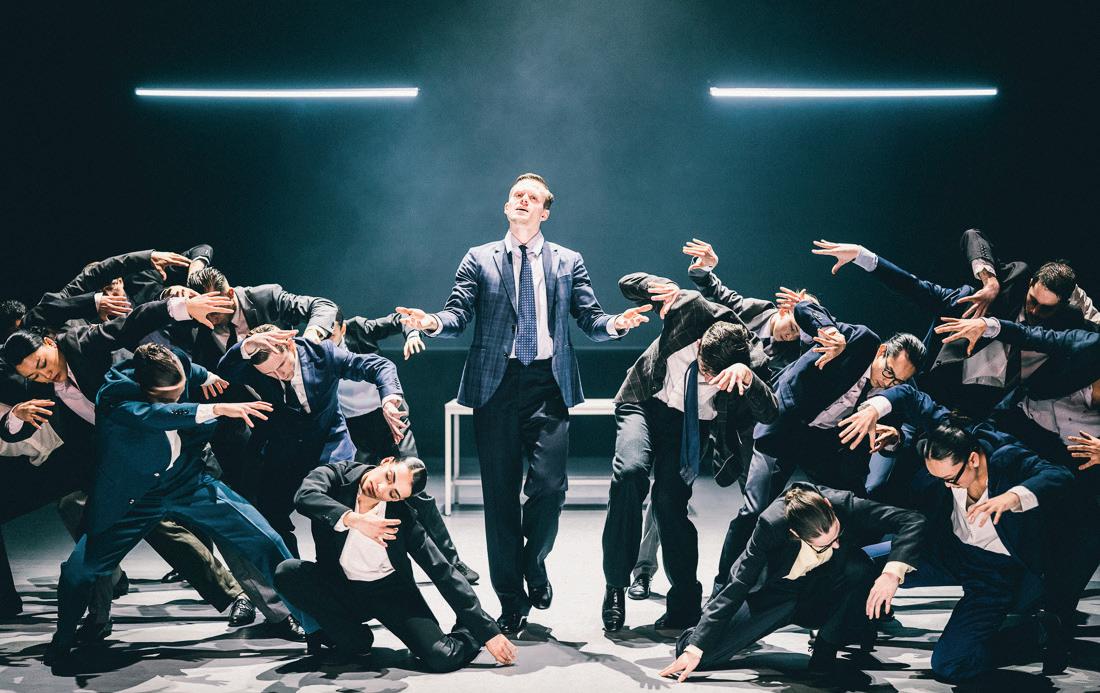

As with ‘2.0’, the final part focuses on connections between people. ‘It’s when we connect with the audience,’ says Ward, ‘then you really feel the gravity of it. And it feels so nice to be able to hold space in art for topics that are constantly whooshing by us all the time. We probably become quite numb to them. Social media is giving us everything every day. It’s nice when we can hold the audience and also hold ourselves in a really physical reminder of those things.’
The ability to create immediate connection is undeniably one of live performance’s most powerful attributes. And yet both Molnar and Complicité’s creative director Tim Bell accept that touring a large-scale live production about the planet’s decline around the world comes with its own contradictions and complications. ‘It’s a really thorny question,’ says Bell. ‘How do we tour in the age of extinction?’ He explains that using video calls for parts of the collaborative creation process helped reduce the production’s carbon footprint. Complicité are also working with the Theatre Green Book, an initiative that promotes sustainable practices in theatre, including for international touring shows. Meanwhile, NDT had already pledged to revise their practices before Figures In Extinction was begun, taking trains where possible, using sustainable dyes for costumes, and only touring their second company, NDT2, every two years.
‘It’s at the forefront of our minds all of the time,’ says Bell. ‘We have to, as an organisation, change the way we’re working.’ As a producer, Bell says the issues can be complex, and there aren’t always quick fixes. ‘It’s about trying to find ways to give people time to learn how to do their jobs differently. If you’re asking freelancers to light a show in a different way, or create a set in a different way, they can’t fall back on the things they normally do. You’re going to have to give them more time and expertise to do that. And of course, we’re getting it wrong all of the time. We are making mistakes all the time. We are being hypocritical. We are not perfect. But it’s important that we have the conversation.’
Ultimately, Molnar says, you have to believe that the balance lies in the benefits live art brings to inspire positive change. ‘If we are separated from ourselves, we will do things that are aggressive in society, or we will take less responsibility,’ she says. ‘We believe, still, that art can track a conversation that is very hard to deal with in other environments, like lobbying. We can unpack certain things that are very hard to unpack, because we can unpack them in a more abstract way, that allows people to feel something. That is what art as a bridge can always do when it’s done well.’
Figures In Extinction, Festival Theatre, 22 August, 8pm; 23 August, 2pm, 8pm; 24 August, 3pm.
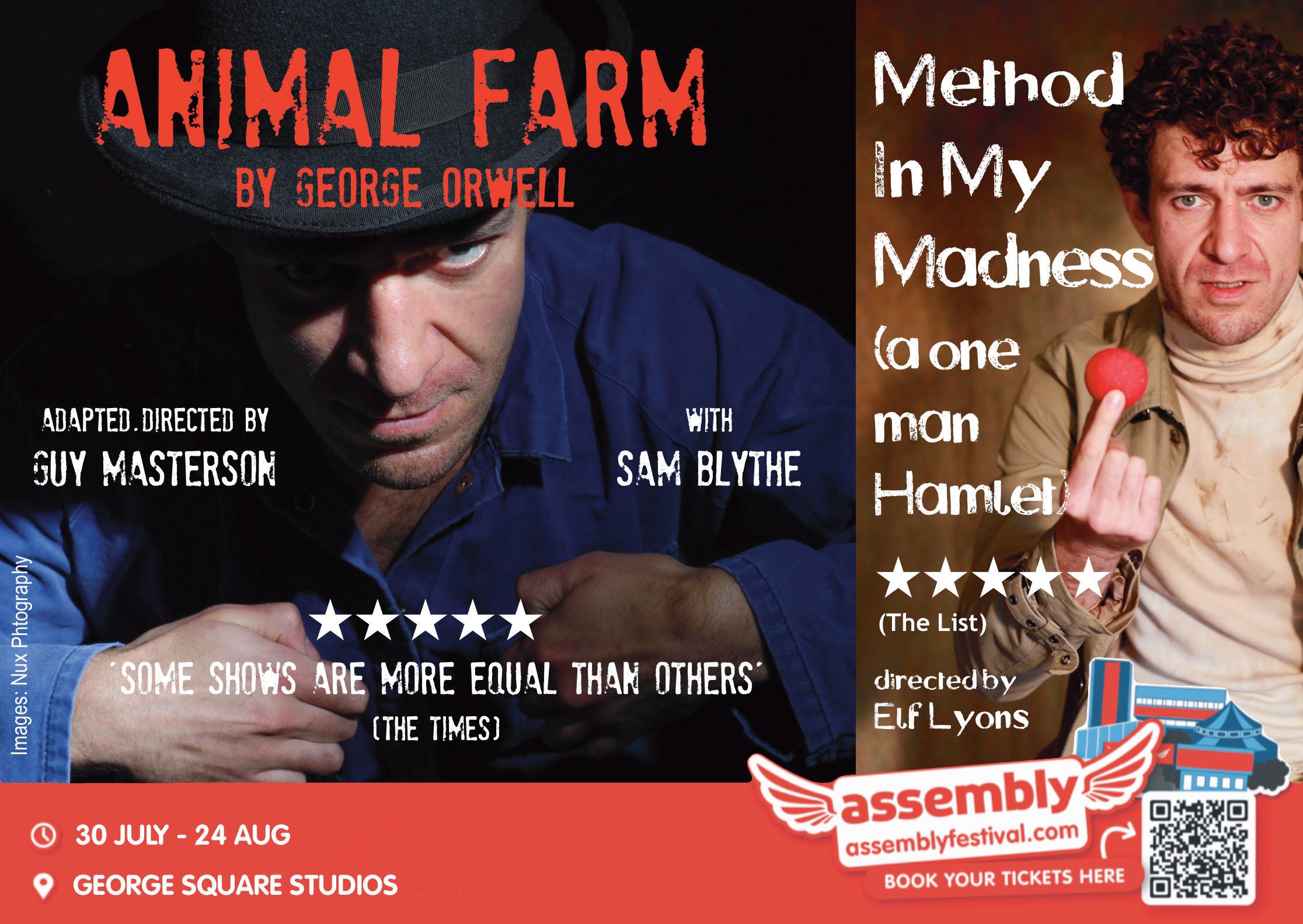








4:35pm 31 July-24 Aug The Snifter Room The Mash House 37 Guthrie St EH1 1JQ
“A hit show from one of the finest creative minds in the country” Cork Independent MARY KATE O













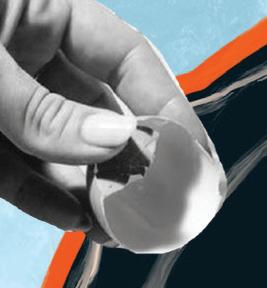
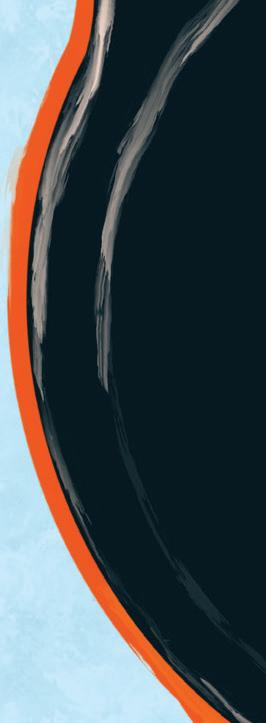








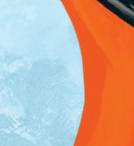














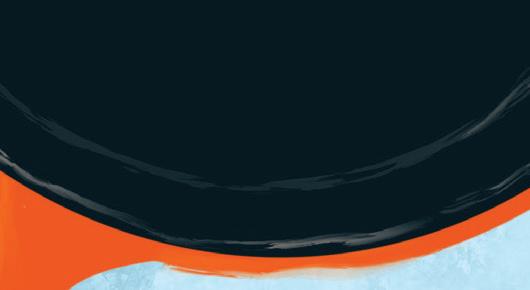












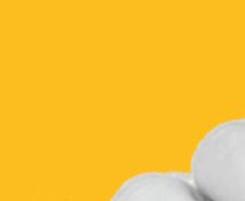
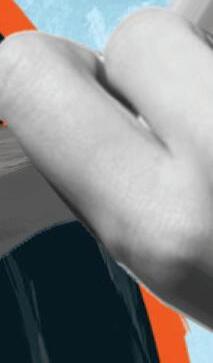













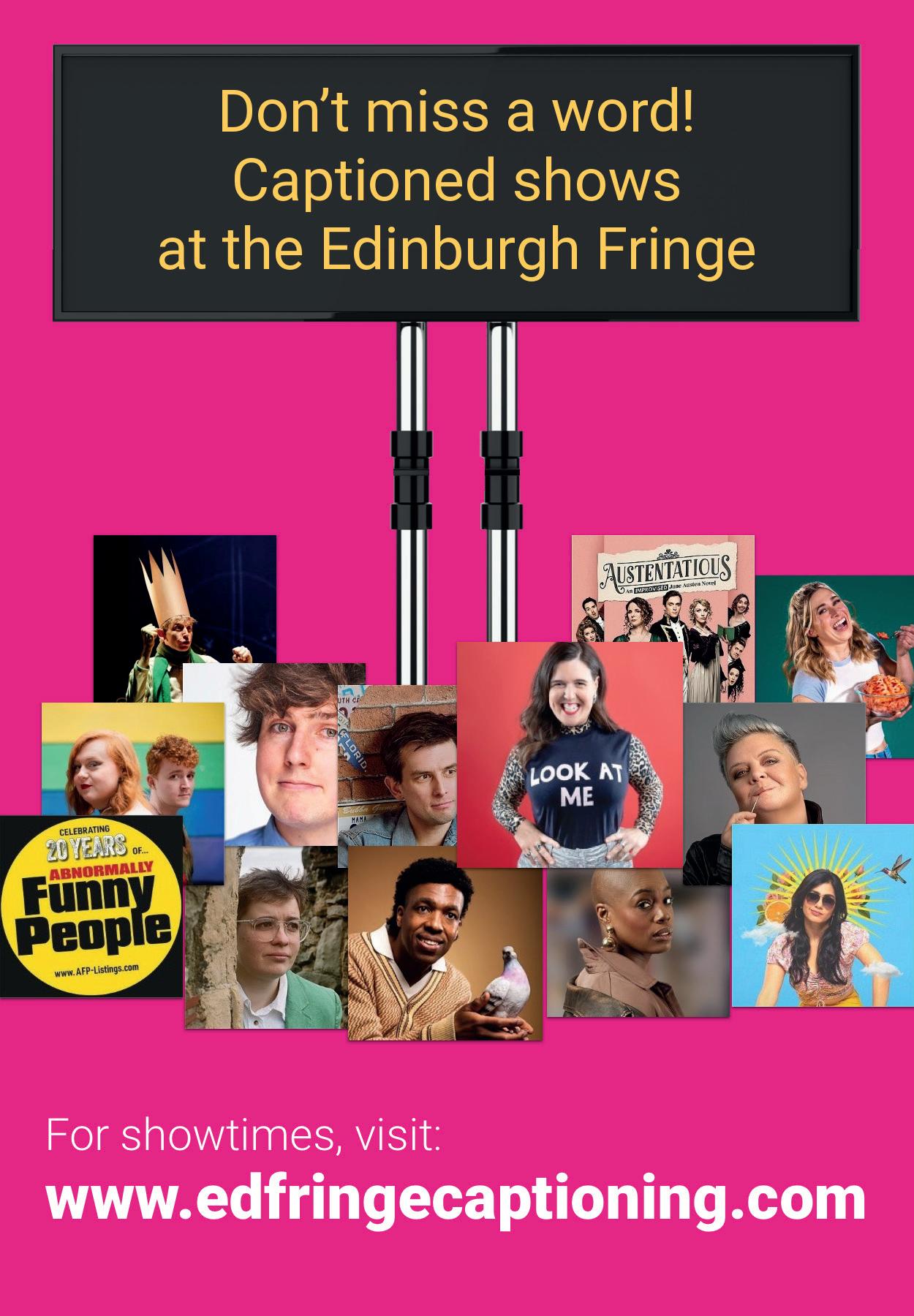



An already magical landscape has added magic sprinkled on top as another sixhour extravaganza of experimental music, DJs, performance and poetry takes place in Wilkieston. Among those appearing are neo-opera star Roxanne Tataei (pictured), DJ/artist Taahliah, and visual artist Jonathan Baldock who will be in conversation, while Ponyboy curate the ever-popular late-night stage. n Jupiter Artland, 16 August, 6pm.
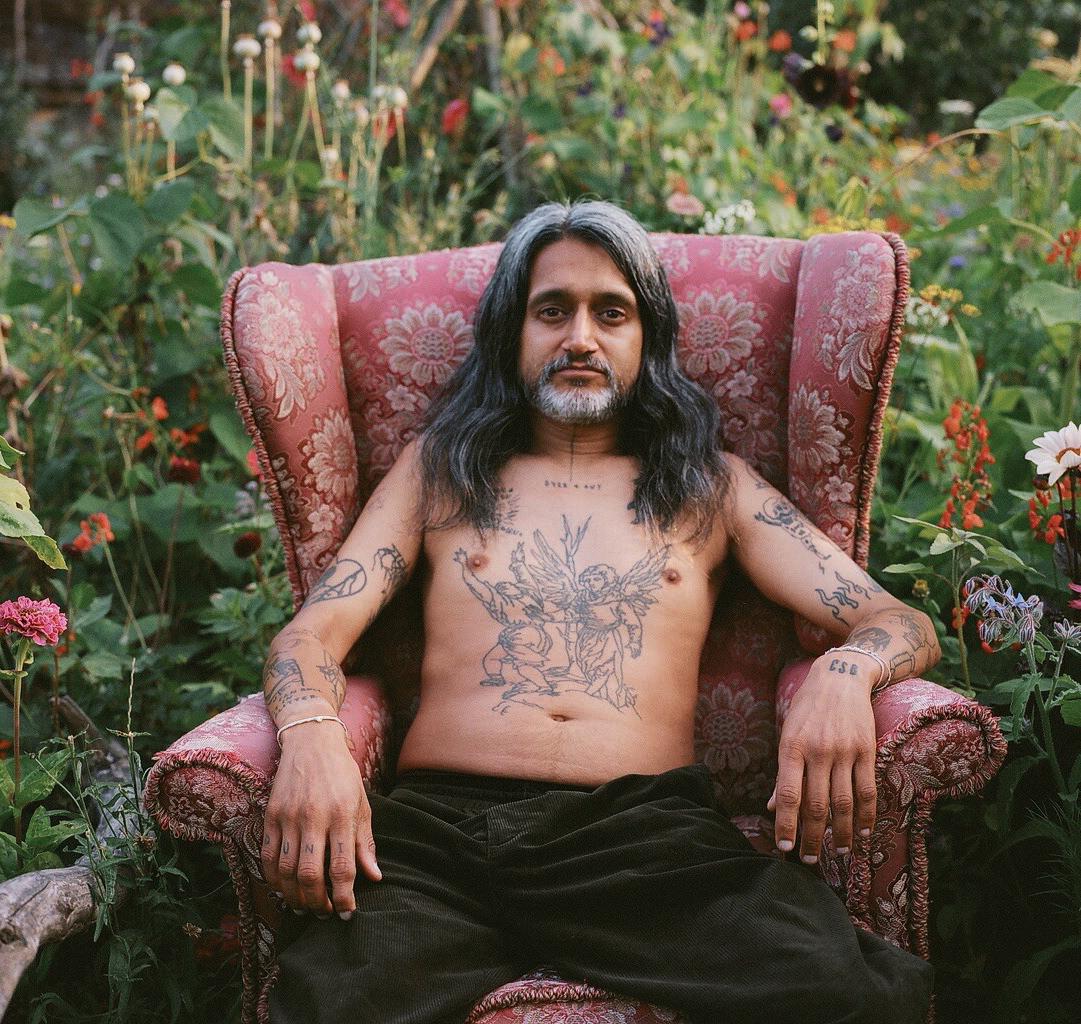

Duck inside Stills on bustling Cockburn Street and the noise subsides. Minds overstimulated by the feverish Festival outside can find a quiet spot here; a room filled with images of body and nature intertwining, lush green leaves, wildflowers upon wildflowers, a mother embracing her child. A safe space, a refuge: a garden. Made during a time of ‘deep family crisis’, The Garden is Siân Davey’s photographic portrait of love, loss and connection, grown (literally) over three years in the Devon garden she shares with her son, Luke. Davey captures the poignancy of this garden immaculately; grass and colour strewn with bodies, stories and shared secrets. The exhibition itself unfolds like a gentle wander; the photographs are framed by expanses of verdant green (Farrow & Ball are sponsors, after all), and some are tucked away, rewarding the curious viewer.
What began as a domestic lockdown project blossomed into something communal. Friends, neighbours, strangers stepped into this organic paradise, allowing themselves to be seen in moments of raw joy, grief, fragility, intimacy. One unforgettable image captures a trans woman mid-laugh, barefoot in a pink dress: part Courtney Love, part Flower Fairies by Cicely Mary Barker. The wildflowers curl around her like protective cocoons. The Garden is an exhale, a quiet, bold dedication to humanity: to mothers, to revolutionaries, and ‘to the earth that holds us all’. (Afreka Thomson) n Stills, until 30 August.
The Collective’s Dome gallery on Calton Hill is a fine site for large-scale installation art. It is also a hard space to fill, but Mercedes Azpilicueta’s huge jacquard tapestry saturates it with narrative drama, weaving together stories of female resistance from across the 20th and 21st centuries. In particular, the Amsterdam-based Argentinian artist has chosen to connect the story of the potato riots led by working-class women in her home city with the Ni Una Menos (‘One Not Less’) marches against femicide and gender-based violence which began in Argentina in 2015.
A large central hanging, which combines reproductions of archival photography and other imagery with slogans in slang Dutch and Argentinian-Spanish, is accompanied by items of custom-made clothing and various devices that look fit for agricultural or transportational use. The costumes are inspired by the aprons and baskets used by the potato rioters (who were protesting food shortages during World War I), as well as items familiarly seen in contemporary demonstrations in South America. A glitchy electronica soundtrack accompanies it all, created from chants heard during the Ni Una Menos protests, as well as sounds of sewing machines, zippers and domestic labour. This is a show that deals with some fairly axiomatic themes in contemporary art with verve and intelligence. (Greg Thomas) n Collective, until 7 September; Mercedes Azpilicueta performs at Collective, 22 August, 3pm.
In ‘Low Rise’, upstairs in Fruitmarket, London sculptor and installation artist Mike Nelson re-assembles fragments of Heygate, a demolished south London housing estate. Girders, rafters and beams sit beside dusty 90s video-game machines and a faded wooden St George’s Cross. The accompanying notes stay vague, mentioning a project that Nelson began but ‘ceased whilst under construction in 2014’; the public art project was pulled after opposition from locals, although Nelson may have been critiquing the social cleansing, as hinted at in his exhibition notes, where he ambiguously mentions ‘political undercurrents’.
Downstairs, ‘A Transient History Of Mardin Earthworks’ is his series of photos of a mainly Kurdish region of south-east Turkey. Nelson, who has been nominated twice for the Turner Prize, visited Mardin in 2012 when the town was undergoing massive redevelopment. Poignant piles of rubble and diggers on construction sites show the upheaval as the town modernised with new pipes and internet. No phoenixes rise from any ashes in Nelson’s melancholic works; either in London or Mardin.
The show’s title, Humpty Dumpty, references the nursery rhyme where things couldn’t be put back together again. Highlighting the eerie lack of people, there’s a silhouetted donkey, a statue of Mustafa Kemal Atatürk (former Turkish president), and some disembodied shop mannequins. Nelson’s takeover of Fruitmarket’s warehouse is the most moving section, where he has recreated the derelict interior of flats, complete with ghostly anaglypta wallpaper, fractured frosted glass and 1980s light fittings. Nostalgia, neglect and loss make for a strangely potent mix in this atmospheric collection. (Claire Sawers) n Fruitmarket, until 5 October.


Subtitled ‘Post-War Scottish Art 1945–2000’, this multi-artist exhibition looks at how our nation’s creative people tackled changing times, featuring work from the likes of Joan Eardley, Calum Colvin (pictured) and Eduardo Paolozzi.
n City Arts Centre, until 12 October.
Filmed in her Glasgow childhood council flat, a Sony Bravia TV advert clearly had a major impact on Arif, and this multi-media artist uses it to explore Pakistani folklore. n Edinburgh Printmakers, until 2 November.


This Egyptian artist presents two film installations which explore various moments in history when the British occupied his country and naturally have resonance with what’s happening in that region today.
n Talbot Rice Gallery, until 28 September.
Cora-Allan hails from Niue, an island nation in the South Pacific Ocean, and this talk and demonstration offers visitors the chance to draw their own hiapo (barkcloth) pattern.
n National Museum Of Scotland, 16 & 17 August.


In experimental short film My Blood Runs Purple, poetry, field music and testimony combine for a story of how black people suffer more when it comes to public healthcare.
n EAF Pavilion, until 24 August.

This one-hour performance entitled Bornsick brings the curtain down on another Art Festival as queer movement artist Walker explores how humans learn to be machine-like. n FirstStage Studios, 23 August.
For Little Low Heavens, this Orcadian painter platforms a collection of his work, which is rooted in his home archipelago’s landscape and culture. n Bard, until 24 August.




























































uote ‘THE LIST’ for 10% off Day passes and leisure memberships
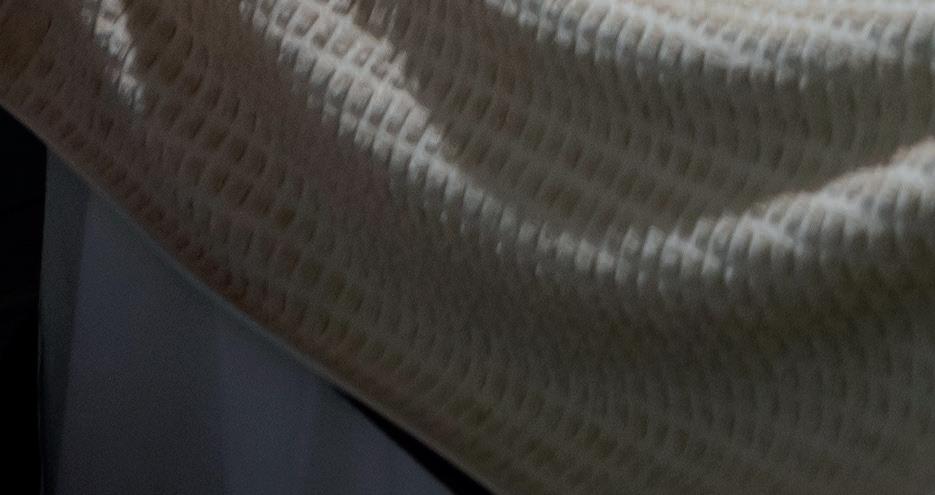


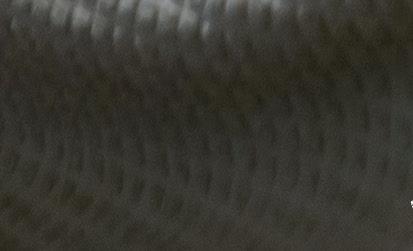


The first major Pride event to take place in Scotland happened in 1995. To mark that anniversary, Gemma Cairney chairs a gathering which reflects on the past but also projects into an uncertain future. Among those involved in this discussion are Harry Josephine Giles and Mae Diansangu (pictured). n Edinburgh Futures Institute, 17 August, 2.45pm.









AA clash with Piers Morgan that went viral did Ash Sarkar no harm as she has since become one of the most prominent left-wing commentators in Britain. Claire Sawers profiles this activist and writer who will be in Edinburgh to have her say on the increasingly toxic culture war




sh Sarkar identifies as ‘a frustrated idealist’. She also identifies as a communist, anti-fascist and feminist activist, and happens to be brown, Muslim and a woman. In other words, she’s a walking, talking embodiment of right-wing rage bait. Still, the political journalist invites ‘friends, enemies and everyone in between’ to join her as she discusses her excellent debut book Minority Rule: Adventures In The Culture War, published in February this year.

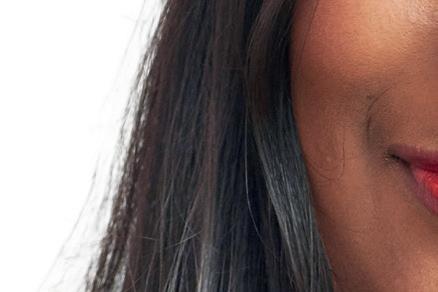
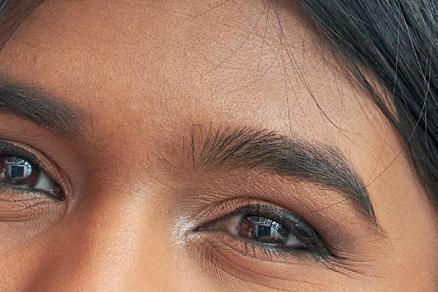




Summarising the book, she doesn’t mince her words: ‘most of us are getting screwed over.’ In it, she laments the relentless profit-chasing of megacorporations. She calls out the cynical hedge-fund managers, politicians and landlords lining their pockets while three million Brits are in problem debt, despite being in full-time work. She describes how the right weaponised the identity politics of the left, then critiques the left for its occasionally self-sabotaging approaches. Without that ability to reflect on strategy weaknesses and be honest about mistakes made by pockets of the social-justice community, she knows how difficult it will be to work towards real solutions.
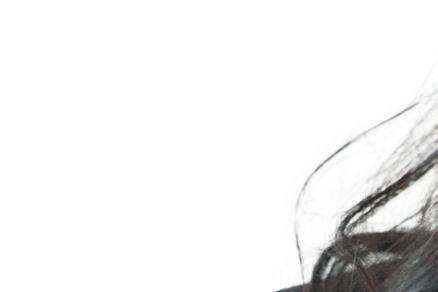








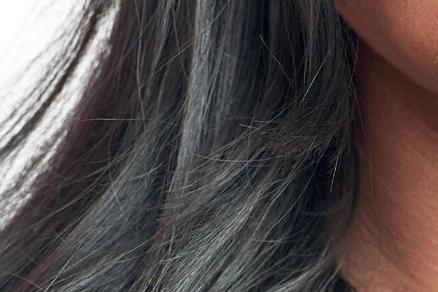











In the book’s analysis of trans moral panic and the ‘gender critical’ cause, or newspaper claims (without foundation) that ‘asylum seekers are barbecuing the queen’s swans’, Sarkar outlines how it’s really the culture of distraction and a normalised manipulation of reality that are damaging society. She will be taking part in the aptly named Book Festival event ‘Immigrants Aren’t Eating Your Pets’, hosted by Glasgow-based Yorkshire author Heather Parry.










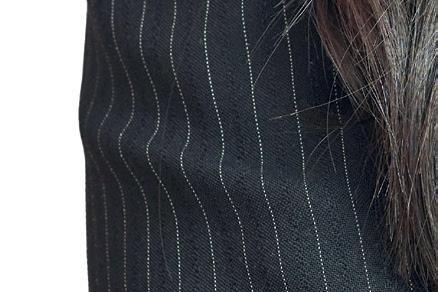




The discussion aims to expose the real minorities that are endangering the public good. Spoiler: it’s rarely the ones the right-wing press want you to think it is, and Sarkar’s book lists many eye-rolling examples when the scapegoating has happened to her personally. Described by The Times in 2018 as ‘the poster girl for the radical left’, she is frequently a target for abuse online, but her principled, well-researched and straighttalking style in interviews has gained her a notoriety of which she has grown to be proud (the clip of her calling Piers Morgan an ‘idiot’ on Good Morning Britain went viral and gained herself hordes of new fans in the process).



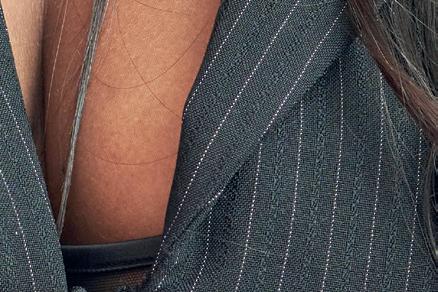






talking style in interviews has gained her a notoriety of which went viral and gained herself If I Speak with editor
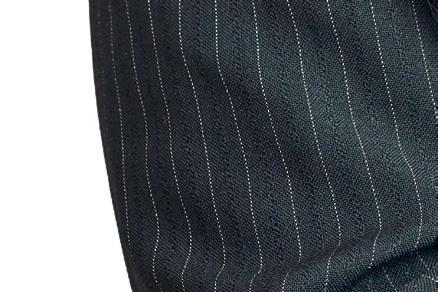





Sarkar will also appear in ‘Changing The Culture’, a panel event alongside Guardian arts correspondent Lanre Bakare and literary translator Jen Calleja to discuss the intersections between class, race and culture. These are topics Sarkar discusses regularly, not only in Minority Rule, but in her weekly podcast If I Speak co-host Moya Lothian-McLean. Sarkar is senior editor at Novara Media, a role that evolved after she met its co-founder Aaron Bastani at a University College London occupation, opposing the hike in tuition fees. It was 2010, Sarkar was 18, and soon after he invited her on to the Novara FM podcast. Fifteen years later, she has come to be regarded as one of Britain’s most prominent left-wing political journalists and a quick-witted commentator to be reckoned with.




Changing The Culture, 15 August, 6.15pm; Immigrants Aren’t Eating Your Pets, 16 August, noon; both events at Edinburgh Futures Institute. really the


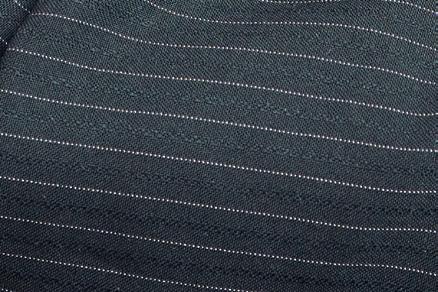















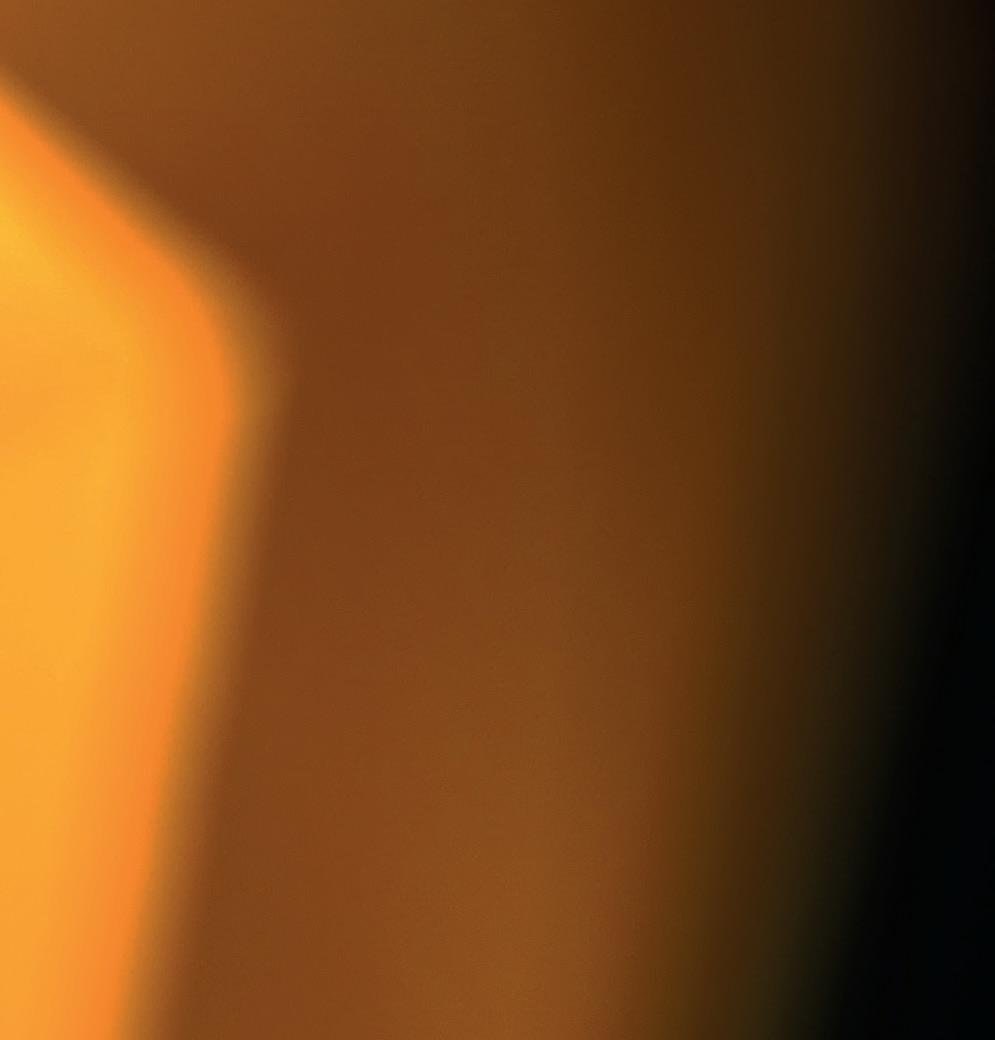




Alex Howard became a bestseller with his Edinburgh-set tale Library Cat and his most recent moggie-inspired story, The Ghost Cat, set in Marchmont. Here he picks his five favourite fictional felines
TABBY MCTAT
To the English-speaking world, Asako Yuzuki, whose novel Butter won the 2024 Waterstones Book Of The Year, looks like an overnight success story. Yet in her native Japan, Yuzuki has been a bestseller for 15 years, with some 20 works of fiction under her belt, and several prestigious prizes to her name. Her subjects range from explorations of female friendship to a portrait of an age-gap relationship told through interweaving short stories. Yuzuki’s prolific output is all the more impressive when you consider that she is still only in her early 40s.
While the author’s newfound international recognition with Butter, her first novel to be translated into English, may sound unlikely (the literary equivalent of a rock band selling out stadiums with the release of their 20th album), it is not hard to see why this particular work caused a sensation. It’s inspired by the real-life case of Kanae Kijima, the ‘Konkatsu killer’, who is currently on death row in Japan for three counts of murdering middle-aged men. Yuzuki’s book contains all the ingredients of a hair-raising psychological thriller, in which Rika, a female journalist, is dispatched to a Tokyo prison to interview Manako Kajii (or Kajimana as she becomes known), a convicted poisoner.
Rika’s fascination with Kajimana, who lured her victims with her wondrous cooking, leads Yuzuki and her protagonist into a profound meditation on misogyny, beauty myths and the politics of the female body, that has echoes of Han Kang’s Nobel Prize-winning The Vegetarian. With several of her earlier works now slated for translation, Butter will hopefully become a gateway to Yuzuki’s compelling and incisive storytelling. (Allan Radcliffe) n McEwan Hall, 23 August, 1.30pm.
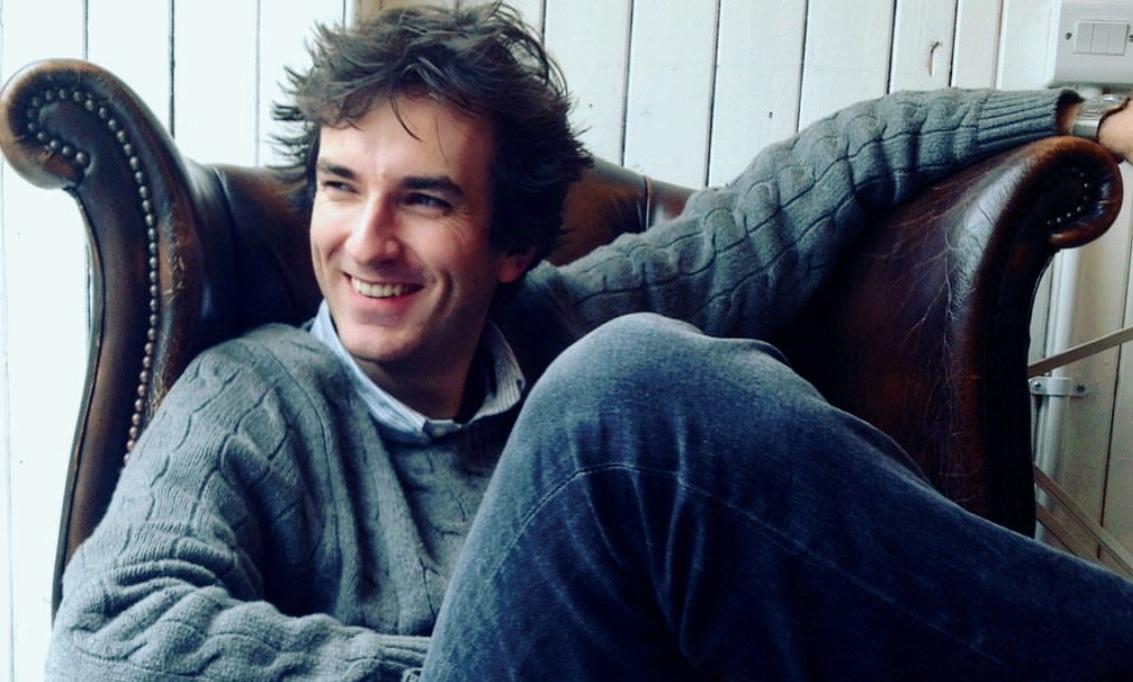
Julia Donaldson’s McTat felt like he’d leapt from a Paddington film. Perhaps it is his ultimate preference for the homely comforts of Prunella and Pat that galvanises this ineffable Britishness. McTat shows us that staying true to yourself is just as important as kindness, companionship and love.
MOUSER
It’s fair to say this tuxedo cat changed my life even if it was decades before I realised. Antonia Barber’s The Mousehole Cat was a seventh birthday present, its heroine creeping back to mind as I picked up the pen to write The Library Cat. Mouser’s odyssey blends incantation, friendship and Cornish folklore in a tale which packs so much in. Like all good children’s books, it is timeless and its messages intergenerational.
BAGHEERA
A panther offering counsel to a petulant man-cub is a realism stress-test, to say the least. And yet Kipling succeeds beautifully in The Jungle Book with Bagheera. The long-suffering feline guardian is just so ‘cat’: disdainful, judgmental, but also reluctantly grateful for the company. Adopt a little boy? If I must. Hoodwink a mesmeric python? Well, it seems I have no choice. A top cat whose kindly, quietly critical nature cannot help but be admired.
Where do you begin with Church from Stephen King’s Pet Sematary? The muddy-eyed rodent, brought back from the dead to spare the heartache of a child, is more than a feline zombie: he stands as a (half) living testament to the horrific consequences of short-circuiting grief. His wobbly gait and ‘not quite right’-ness is perfectly hewn by King with his sucker-punch linguistic efficiency. A scabby stray sometimes roams our garden. ‘Bet he’s been to Pet Sematary,’ my wife will say, with a nervous stare.
They say that there are no small parts, only small actors. Never was this truer than in the case of Wuthering Heights’ Grimalkin. ‘Wuthering Heights doesn’t have a cat!’ I hear you cry. Actually, it does: Grimalkin’s appearance is brief but crackles with eerie portent. The ‘brindled, grey cat’ sashays past Lockwood and is the perfect addendum to Heathcliff’s outburst upon hearing of Cathy’s ghost. Grimalkin reminds us of the importance of feline companionship in lonely times and inspired me to borrow his name for The Ghost Cat. It’s a long family line, ‘Graymalkin’ originally making his literary debut at the heels of Macbeth’s Three Witches.
n Alex Howard: A Cat’s-Eye View Of Edinburgh Life, Edinburgh Futures Institute, 24 August, 6.30pm.

A YA superstar, Chang’s The Nightblood Prince successfully fuses Chinese history and myth to concoct an epic romantasy featuring rival kingdoms and vampire armies.
n 15 August, 4pm.
The activist, model and writer will be aiming to help us with our communication problems in an era when it’s very hard to cut through the noise. n 21 August, 7.30pm.


Another comedian pops into Edinburgh Futures Institute, here with the sole purpose of working out exactly why his life is a tapestry of chaos. Is he unlucky or does he invite the mayhem? n 15 August, 5.45pm.
You can’t argue with that moniker or his mission: to spread the word on words and how great they are for your soul, Yes, it’s Grammar time! n 24 August, 1.30pm.
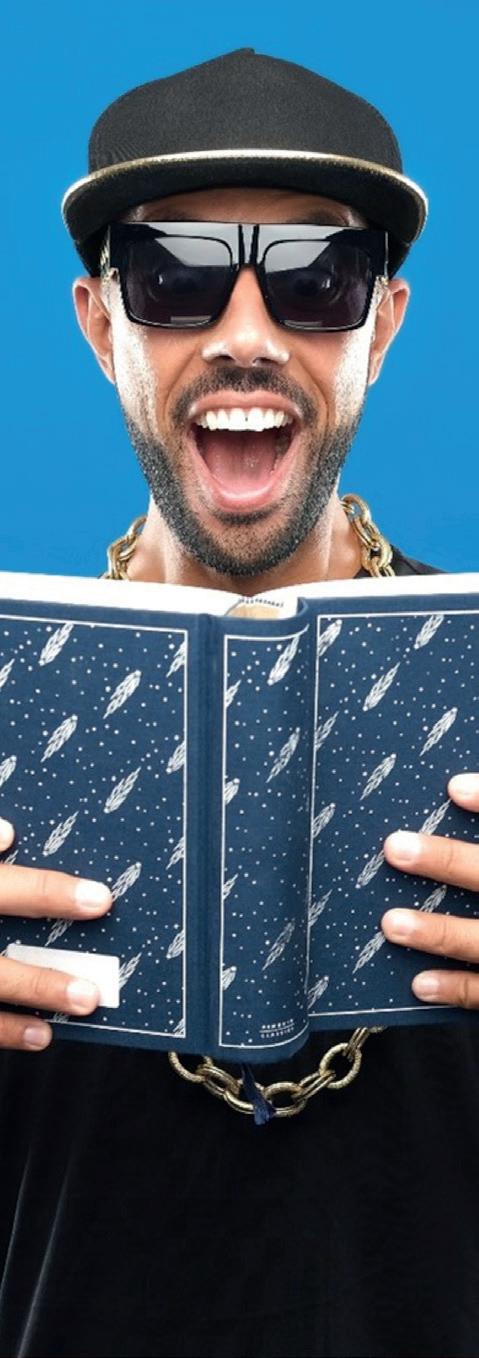

Quite simply one of Scotland’s finest living writers, the Cambridgebased Invernesian has been shortlisted for the Booker no fewer than four times, and is in town with Gliff, about a near-future dystopia. n 17 August, 3.15pm.

Once a tabloid pariah, the risqué comedian has developed into quite the national treasure and is now writing very popular books for both kids and adults. Susan Calman asks the questions. n 14 August, 12.45pm.
Being a core text of the literary canon, Moby Dick has long been ripe for a reboot, and in Call Me Ishmaelle, this author and filmmaker reimagines the tale through the eyes of a runaway orphan.
n 22 August, 6.30pm.



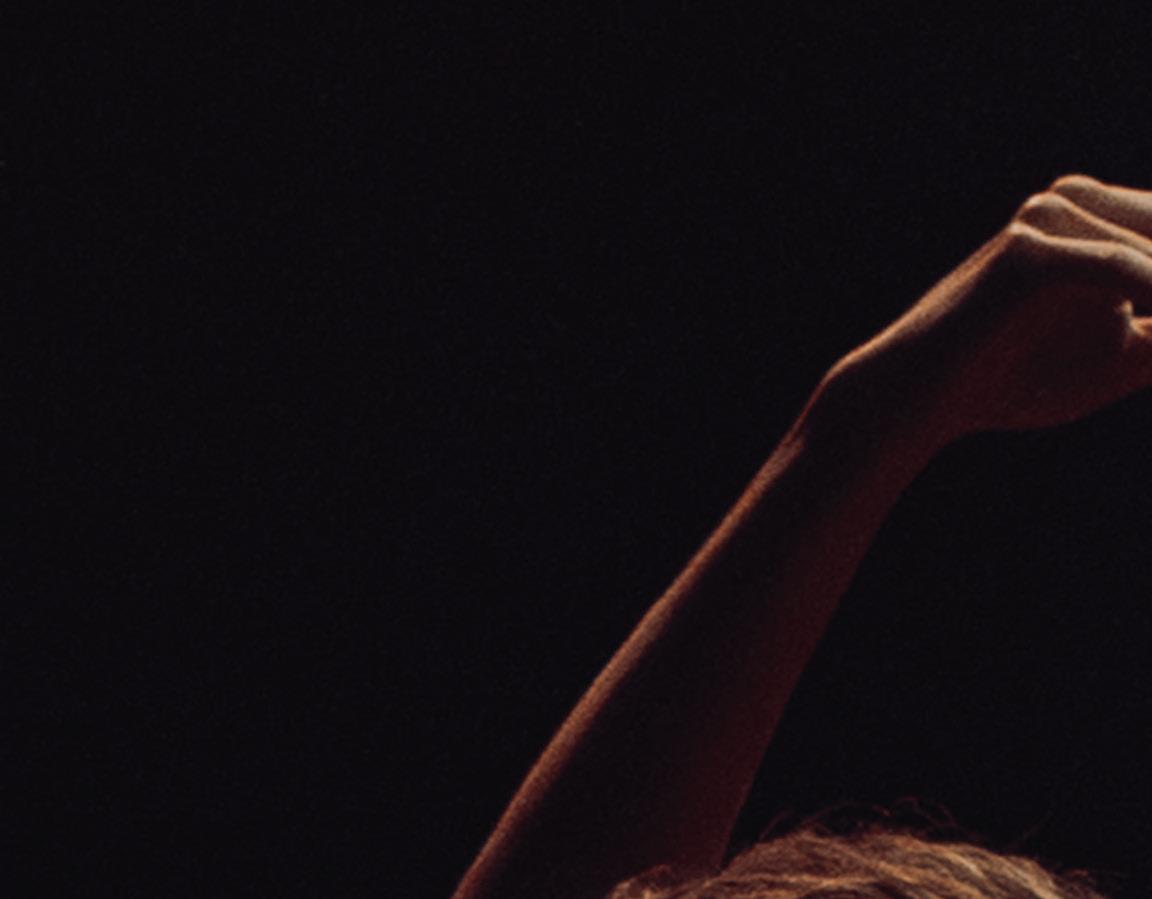
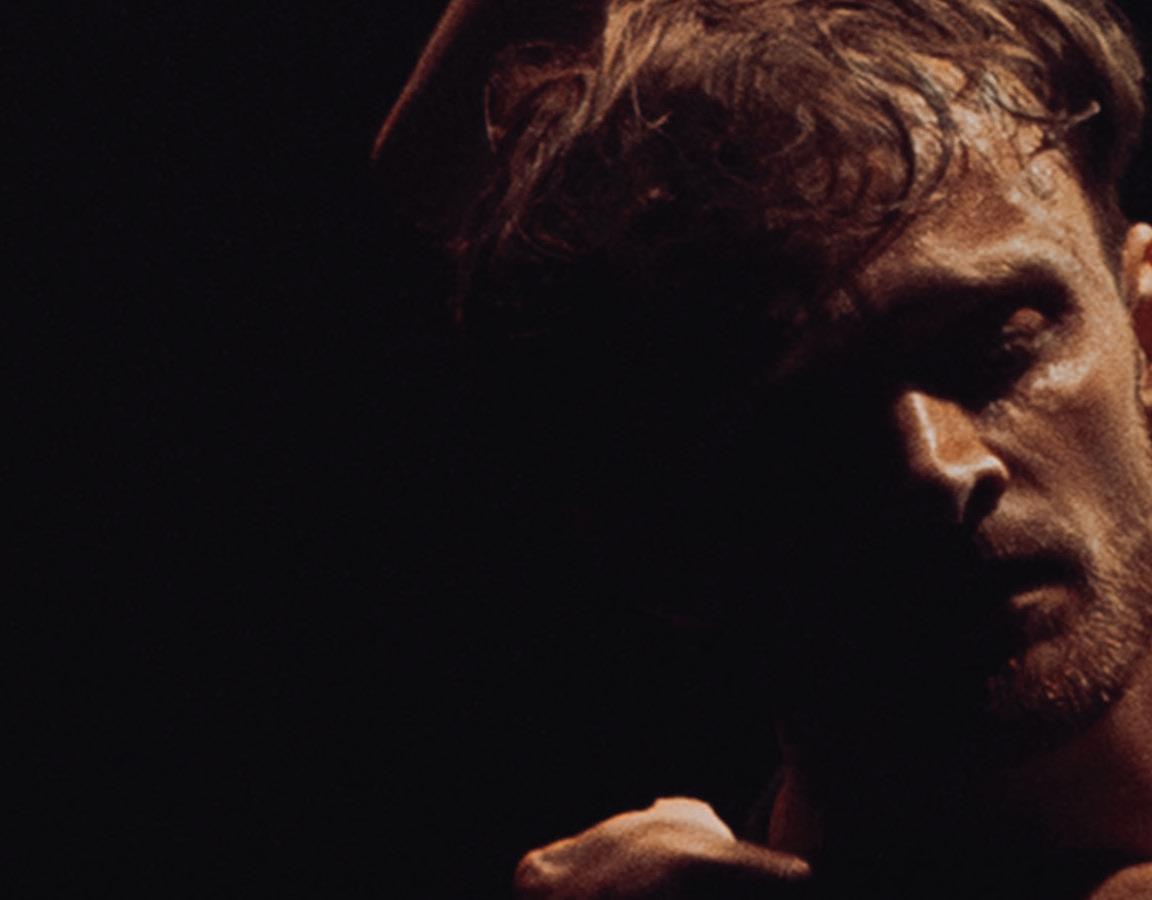











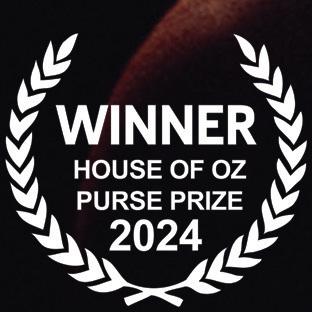
























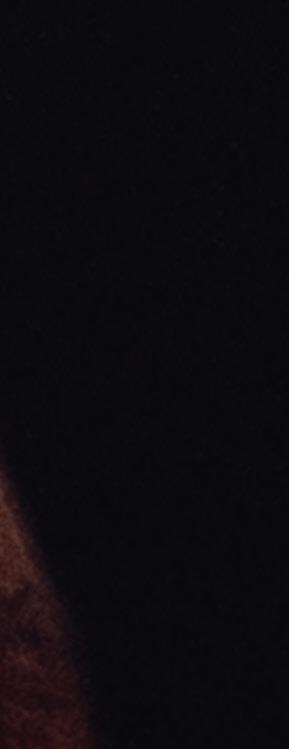




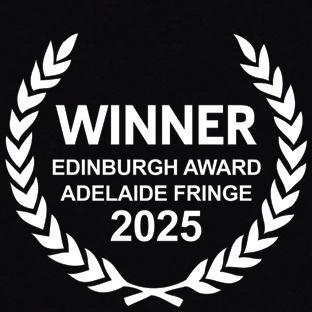







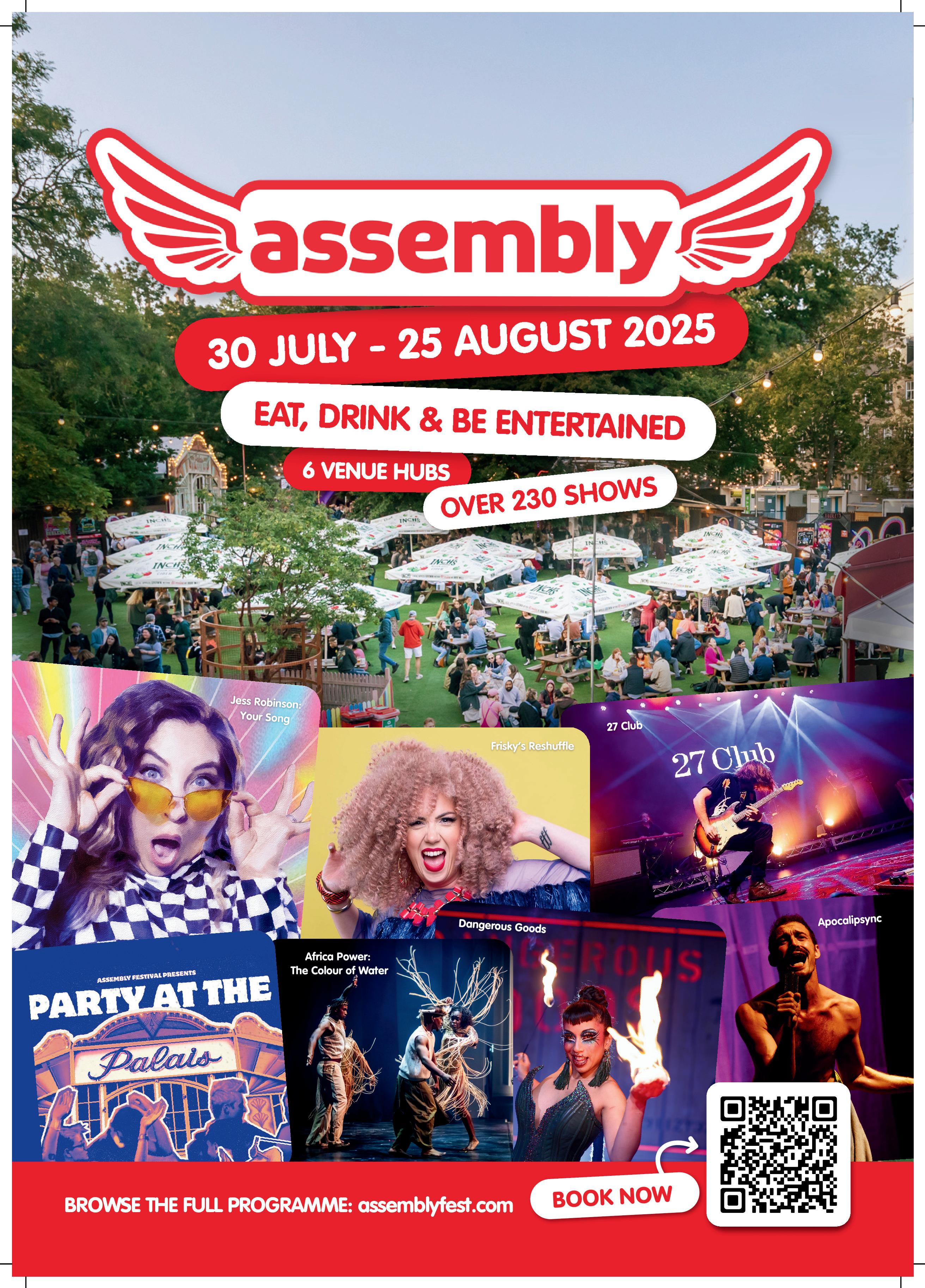
The theatrical sensation, now celebrating its 21st birthday, proves once again to be a very different kind of Festival beast by staying in town even after all the show posters have been taken down. Will you spot the next Camille, Bernie or Meow (Meow) among its ever-evolving cast?
n Famous Spiegeltent, until 31 August, times vary.



Few people would consider Tom Waits to be a rich source for LGBTQ+ pride, but drag king Mr Brake Down has been teasing such themes from the eminent growler’s back catalogue for years. This Fringe marks an evolution in his act as Down moves from whisky-swilling solo performer to the lead in a dynamic full band. In the hyper-masculine world of Waits (with his homeless bums, hookers and rain dogs), Down has unearthed an everexpanding space for queer joy to manifest itself.
Perhaps most admirably, he also seems committed to the more oddball end of Waits’ music, stacking his performance with the deeply unsettling spoken-word piece ‘What’s He Building?’, nonsensical absurdist masterpiece ‘The Piano Has Been Drinking (Not Me) (An Evening With Pete King)’, atonally aggressive ‘Chocolate Jesus’, and even a snippet of the pathosriddled ‘Christmas Card From A Hooker In Minneapolis’, leaning into these lyrically outré tunes with a theatrical flair that grasps at their knowing humour (although don’t worry, Rod Stewart favourite ‘Downtown Train’ also gets a look-in).
Yet the real entertainment lies with Down’s voice which, while not a one-for-one replica of Waits’ unmistakeable croak, contains notes of striking verisimilitude. He seems to implicitly understand the empathy behind these numbers and guides his audience (many of whom have limited knowledge of the Waits oeuvre) through their offbeat emotional register with aplomb.
The between-song banter fails to match the performances themselves in charm or character, yet there’s something vital and invigorating about seeing these sprawling oddities transformed into an ideal avatar for the trans experience. (Kevin Fullerton) n Augustines, until 24 August, 5.15pm.
Subtitled ‘The Best Songs From The Worst Musicals Ever Written’, Arthur Hull dons sweatbands and kicks off his Fringe debut with a frenetic gym-set opener from the musical bomb that was Carrie: turns out Hull is quite the mover. There’s nothing he can do about a steeply raked lecture theatre ill-suited to the intimate cabaret vibe of his show, but via hilariously ick-inducing lyrics from Grease 2 and cracking numbers from Moby Dick and Love Never Dies that fully showcase his emotive voice, Hull gives it his all. Cats may not have been a flop on stage but gets a deserved kicking for its turd of a film adaptation, while a medley from Diana: The Musical raises some of the night’s biggest laughs.
There’s a brilliantly gymnastic intro (young Arthur is circus trained) to a haunting track from Spider-Man: Turn Off The Dark, Broadway’s biggest ever commercial stinker. And by young, we’re talking 20 years old, an age almost impossible to compute with the stage presence, piano skills and vocal maturity this guy possesses: no surprise he scooped the Emerging Artist Award at this year’s Adelaide Fringe. Like his music hero Tim Minchin, the future could be very bright indeed for Arthur Hull. (Paul McLean)
n Gilded Balloon Appleton Tower, until 24 August, 8.45pm.
Willing (real name William Hannagan) bursts onto the stage singing about fighting for someone and wanting to make it right. It’s a tale as old as time, but this is a very modern love story, packed with pop-culture references and Gen Z slang that may go over some heads. As a meme-page admin, Willing resolved to respond to every thirsty gay who slid into his DMs. Thus begins a journey of flings before finding (and potentially losing) his love.
Willing has a boyband-style voice with remarkable range, from self-proclaimed pop bangers to emotive ballads. There’s also poetry, which could be cringey in the wrong hands but here is genuinely emotive. But the connective storytelling falls flat, saddled by a confusing structure. The narrative is muddled and repetitive, and for all its energy, the pacing feels uneven. There’s a sincere story buried in here but, right now, it’s struggling to be heard. (Lauren McKay) n Assembly Rooms, until 24 August, 9.50pm.
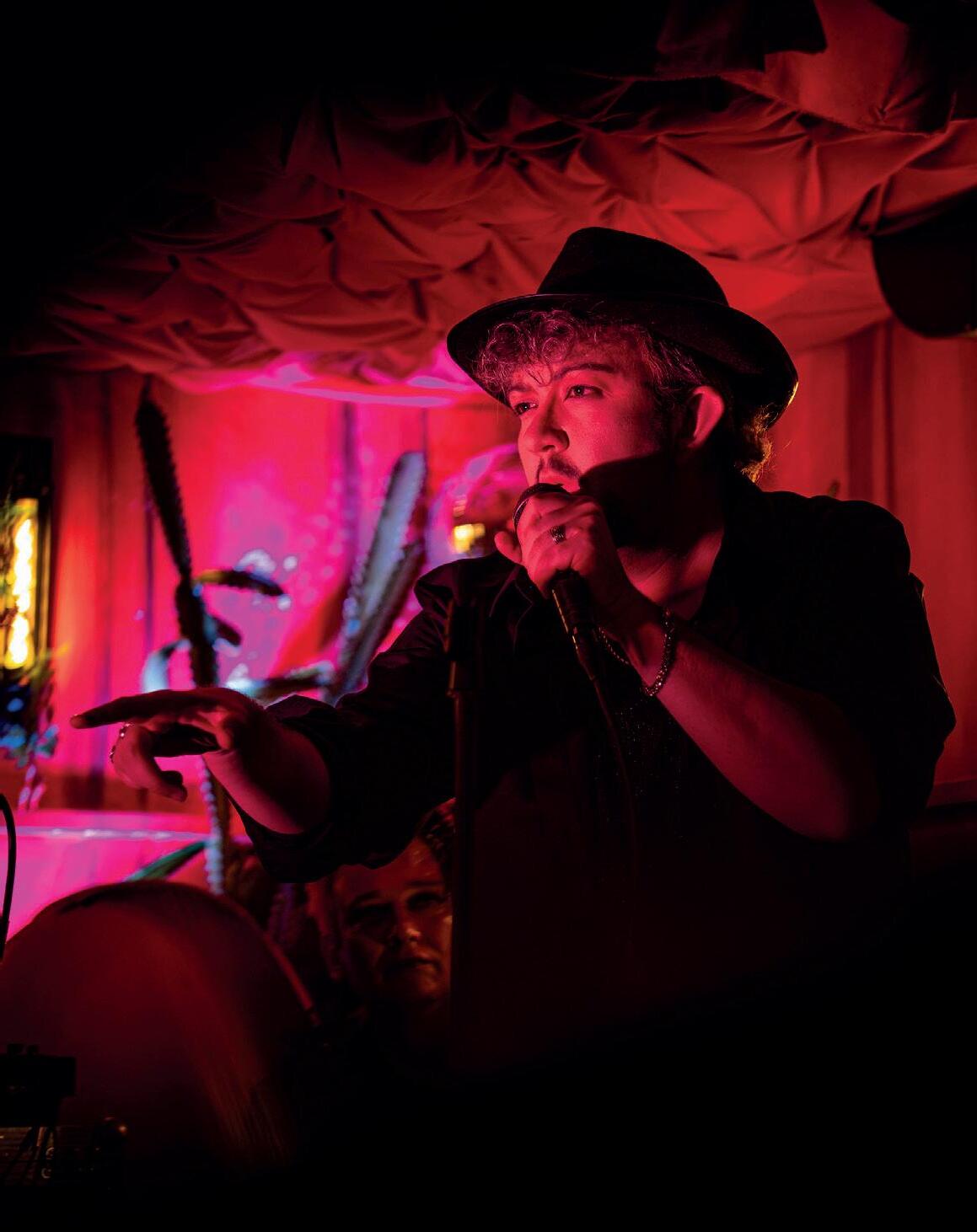
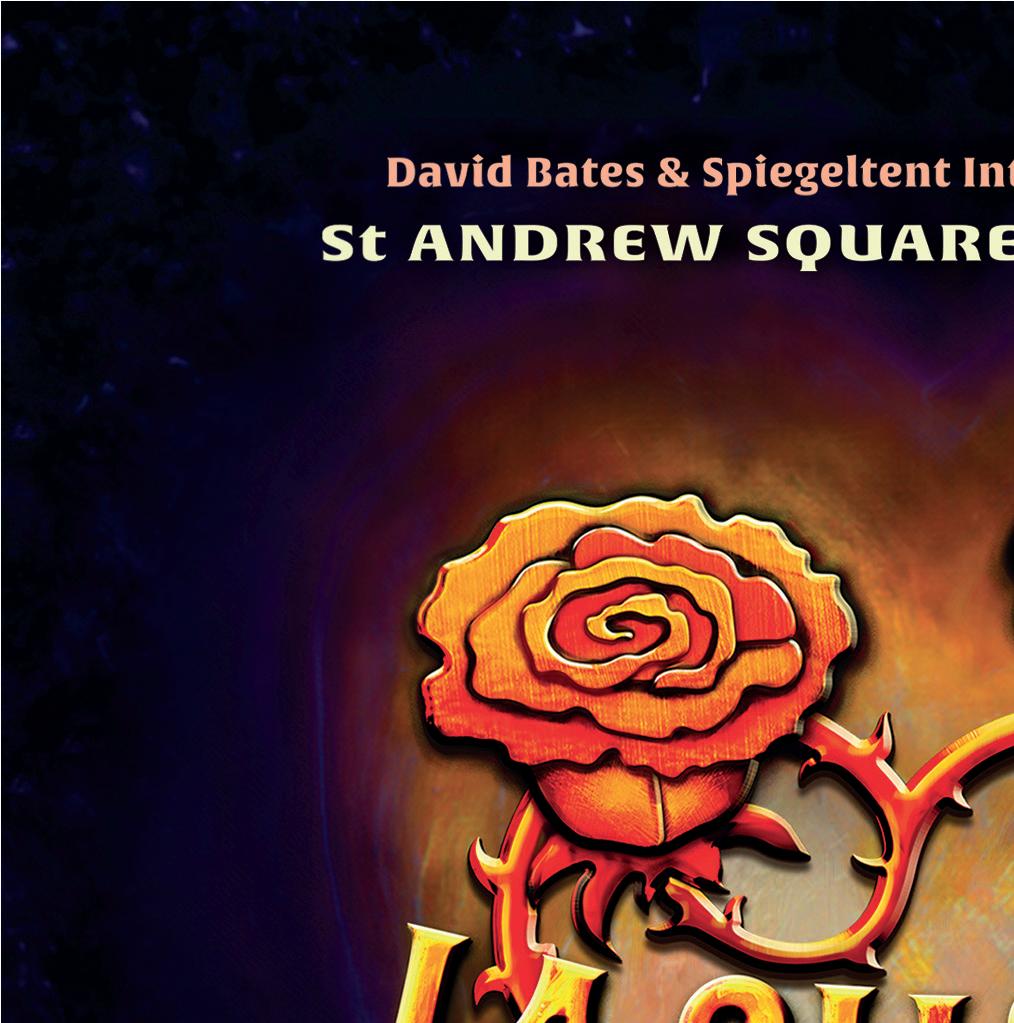

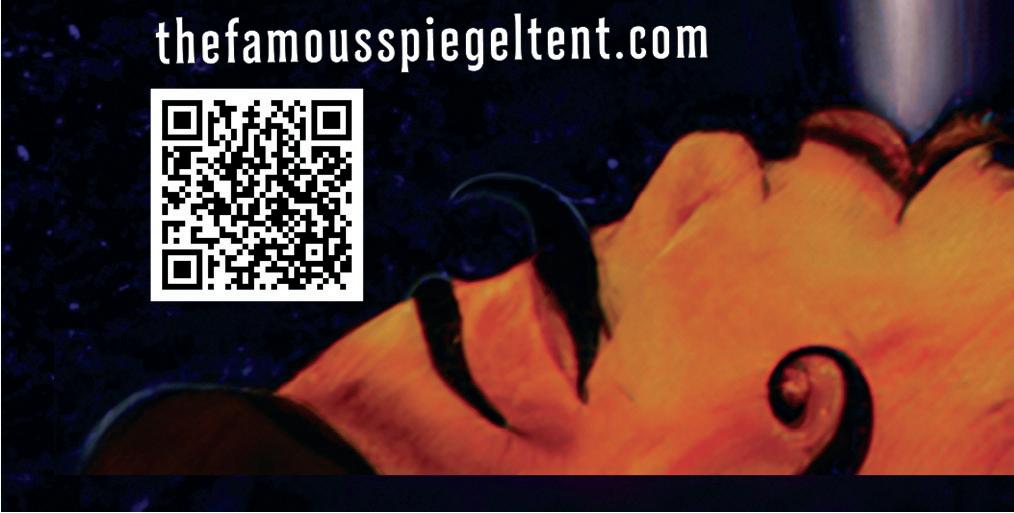
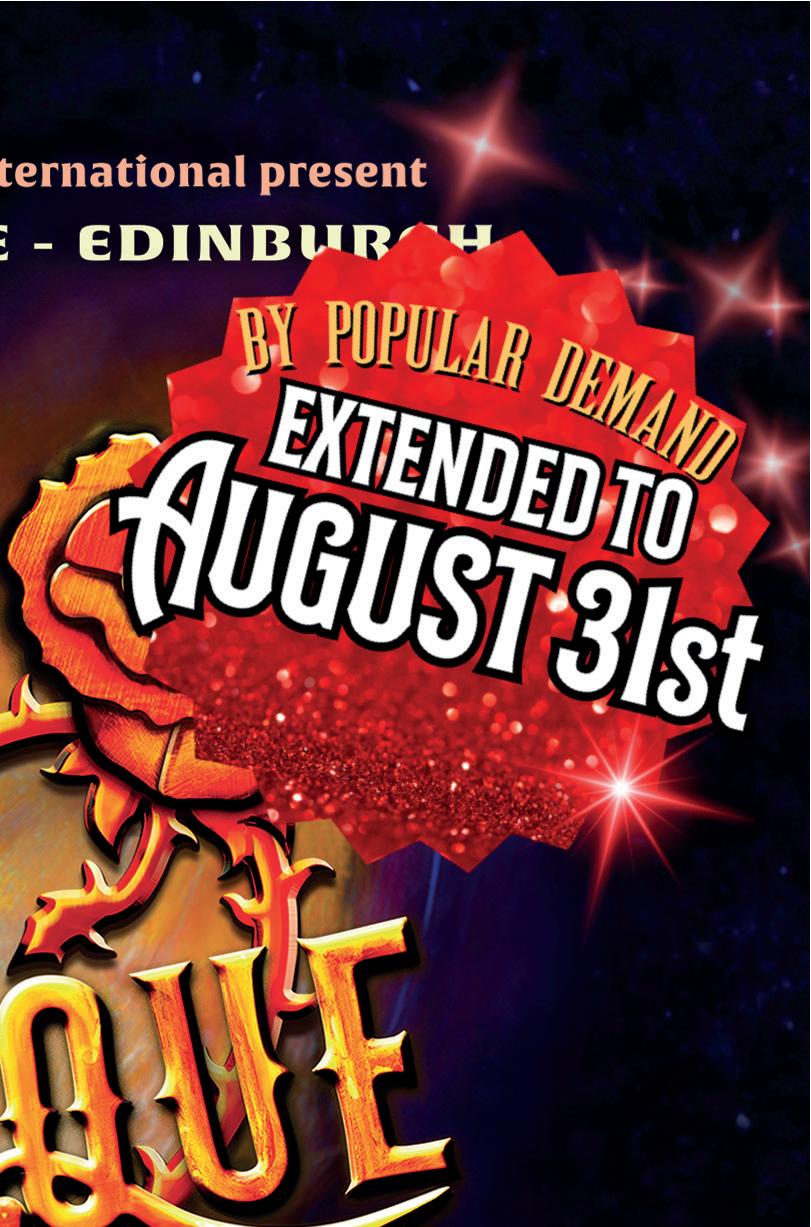



For over two decades Glynis Traill-Nash has been at the epicentre of all things fashion, rubbing shoulders with A-listers and top designers in the front rows of the most exclusive shows. She’s written endlessly about what’s in, what’s out, and what we should save for a rainy day. Traill-Nash is a very big deal and begins her show by informing us of that: if only it had felt a bit more tongue-in-cheek.
This is an hour about all things hot and not in fashion, as well as the trials facing the industry, and how it has all impacted Traill-Nash’s life and worldview. What saves this from being a glitzy exercise in solipsism is the music. The jazz numbers are witty, self-aware and often relatable, even to those of us not ‘in the know’ (wait, Crocs aren’t the height of fashion?). Costume changes tie in perfectly and there’s a particularly funny number about how there are too many songs about Paris, which is, ultimately, all about Paris. Accompanied by the wonderful Joshua Haines, it’s through music that Traill-Nash warms herself to the audience, her penultimate tune a stroke of genius that shifts the tone from joyful absurdity to thoughtful melancholy. She just needs to bring that same sharpness to her spoken-word sections. (Louise Holland)
n Underbelly Bristo Square, until 25 August, 7.45pm.
Magic roughly falls into one of two categories: grand illusion work with extensive setup and props; the other, arguably more skilled variety, is that of close-up misdirection, sleight-of-hand, and an intimate form of deception which relies as much on skill as it does presence. If he was handed the budget, Campbell Glazier could well fit the former. But in Trickster, in this Free Fringe basement bar of Uno Mas, there’s nowhere to hide for a mix of card tricks featuring no stagehands or elaborate props. And it makes the show all the more impressive.
This is proper close-up magic, served with a wry smile and barrels of cheek. And that’s what sets Glazier’s show apart from much of the other magic at this Festival: personality. There’s showmanship without the smarm. Lashings of laughter without forced scripts. This is magic around the pub table with your talented pal. Only this time you actually asked for it. (Dominic Corr)
n Uno Mas, until 24 August, 7pm.
You really can’t fault Jess Robinson. Her shows are always impeccably performed and stuffed full of quality entertainment for all ages; this one is no exception. Your Song is a re-imagining of Elton John’s work as performed not just by Robinson but also ‘the girls’: the voices/impressions who live rent free in her head. Robinson appears radiant in almost as many sparkles and ruffles as Elton himself, including a nod to his footwear in her silver platform boots. She’s an immensely likeable performer and always mesmerising to watch. This hour showcases her pinsharp impressions and versatile singing voice, backed by pianist and musical director Matthew Floyd Jones (formerly of Frisky & Mannish), gamely sporting some Elton-esque glasses.
It’s remarkable how brilliantly she oscillates between very different impressions, each voice taking a line of ‘Don’t Go Breaking My Heart’, for example, moving apparently effortlessly from the likes of Liz Truss to Marge Simpson. The return of some old favourites sees Liza Minnelli in an unexpected and delightfully silly audition, and later her iconic Kate Bush makes a comeback.
Robinson is funny too. Aside from the comedic twisting of Elton’s lyrics, she risks a more edgy, throwaway joke; it gets a mixed reception and deserves better. A true all-rounder, you’d be wise to check the new book she plugs at the end, too. Displaying further depth, it compares her diaries at 23 with those of her grandmother who escaped Nazi persecution. (Marissa Burgess)
n Assembly George Square Gardens, until 24 August, 6.05pm.



The excitable-sounding Haus Of VaVaVoolah present this interactive drag-king show set in a luxury department store, featuring songs, quizzes and NDAs.
n Space Surgeons’ Hall, 18–23 August, 10pm.
A family-friendly immersive show featuring puppetry, music and movement, centred on an encounter with a majestic whale.
n Assembly George Square, until 24 August, 1.25pm.


From Chrome Productions comes this tale of the legendary curly-tailed animals heading to the big city in search of stardom. What they don’t need is to take part in a talent contest run by the Big Bad Wolf.
n Space Surgeons’ Hall, 18–23 August, 10.45pm.
In Siren, La Scala alumna Redman blends evocative songs from the worlds of cabaret and classical music with all-true stories from her life.
n Voodoo Rooms, 19–24 August, 7.50pm.
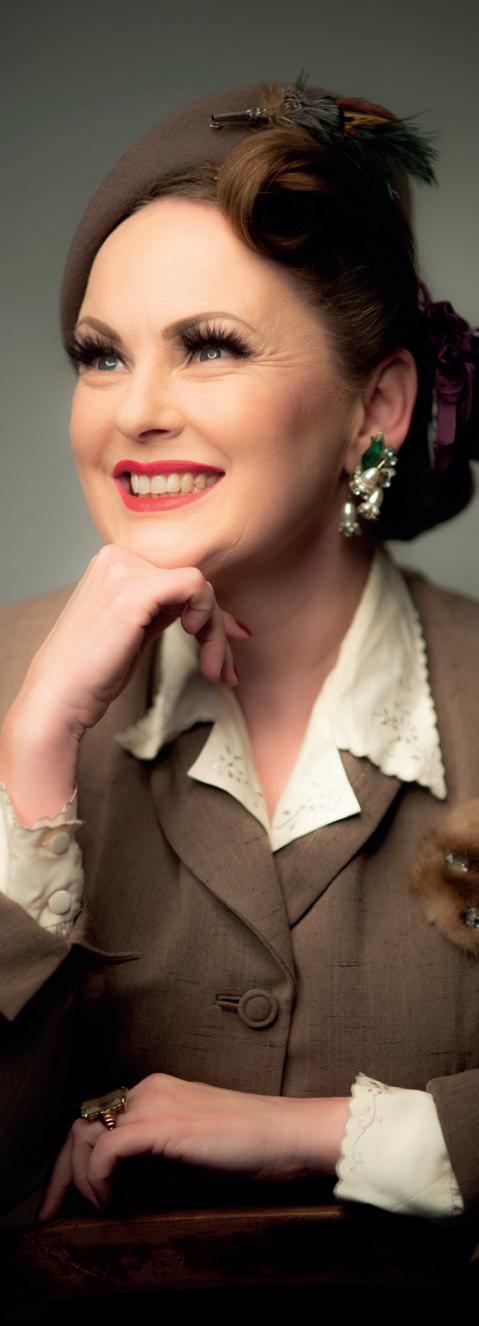

Here comes Magic Man, a nostalgic affair which takes us on a trip through Bolton’s long-term fascination with magic, going all the way back to his childhood.
n Gilded Balloon Appleton Tower, 18–24 August, 7pm.

For a mere 150 minutes, indulge your inner Swedish superstar for this extravaganza of food, cocktails and the chance to belt out your favourite Abba hit.
n Brewhemia, 23 August, 11am.
After a successful 2024 Fringe, Melissa Western is back to celebrate the lives and work of Ella Fitzgerald, Eartha Kitt and Etta James, the E girls who were all at the height of their powers in that eponymous year.
n Jazz Bar, 20–24 August, 5.30pm.




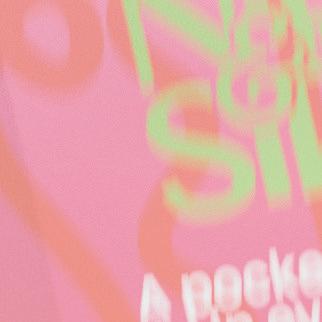



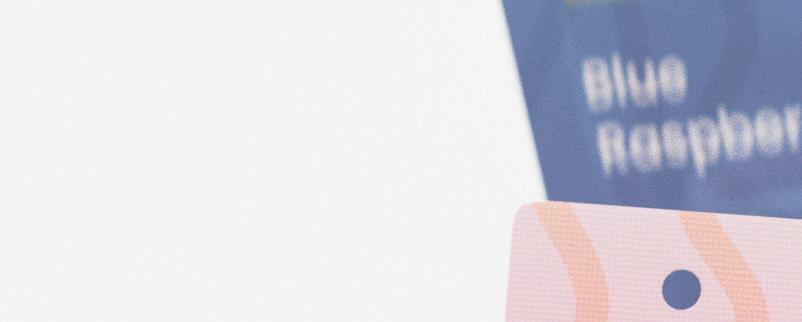


































Keep an eye on this guy as he’s adding dates at large venues such as Cowbarn and McEwan Hall to his run, proving that this Drama King is hot property. Dark comedy but with an upbeat vibe is clearly a surefire winner at the Fringe this year.
n Monkey Barrel, 18–24 August, 2.50pm; Underbelly Bristo Square, 22 August, 10pm; 23 August, 5.30pm.





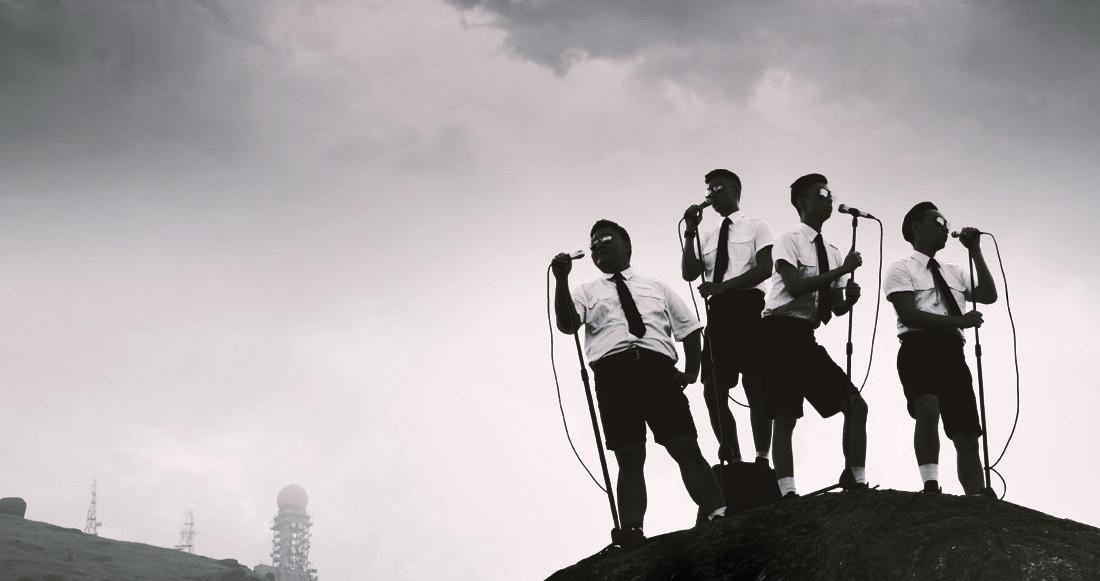








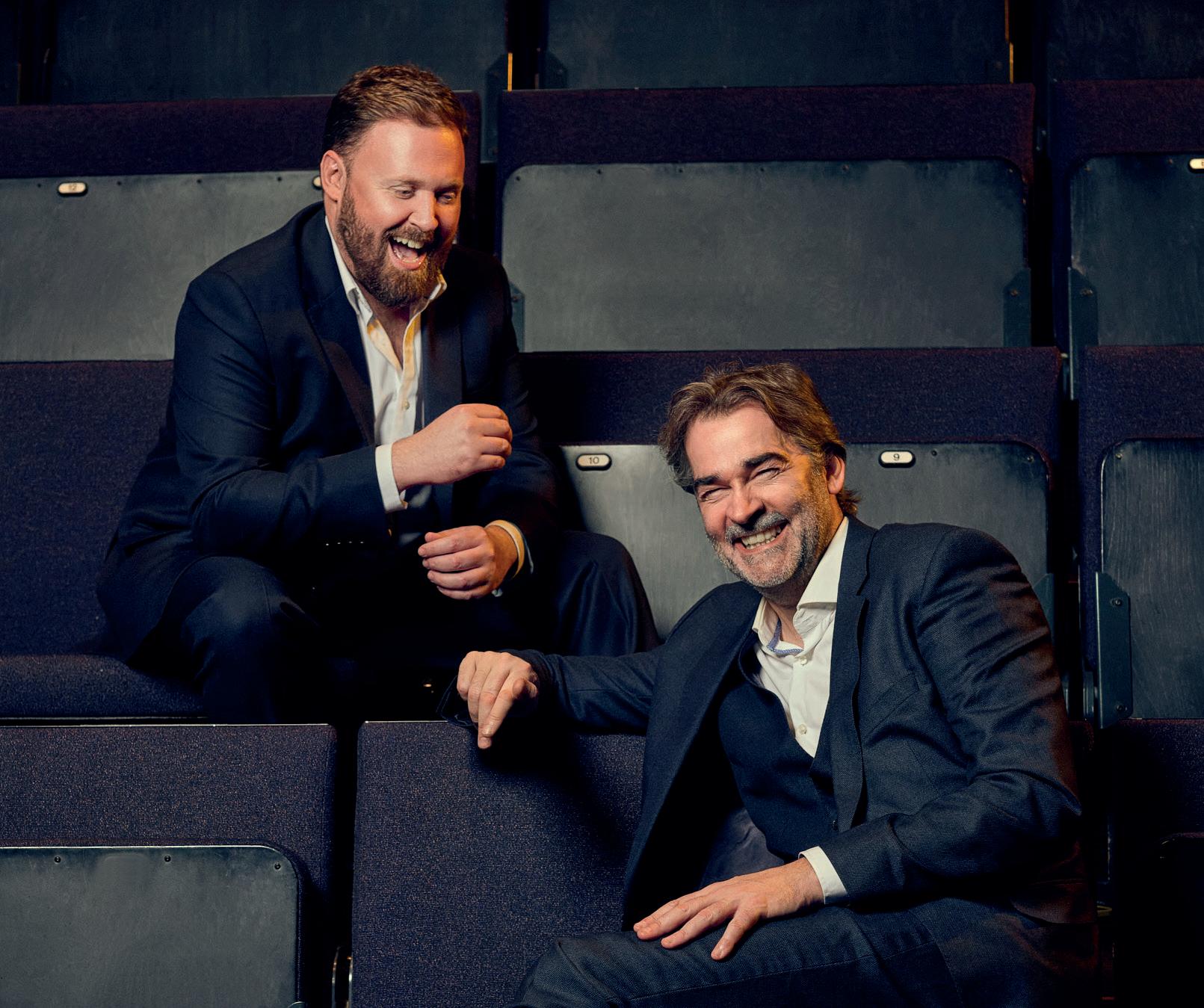
What’s left, career-wise, when a couple of pals have each won the coveted Edinburgh Comedy Award?
Teaming up to play one of music’s ‘most bangable duos’ (their words), that’s what. Adam Riches and John Kearns explain to Murray Robertson why they’re taking to the stage as Michael Ball and Alfie Boe and how the light entertainment legends have brought them closer than ever
For the past nine years, Adam Riches and John Kearns have been texting each other in the guise of musical/ opera singers Michael Ball and Alfie Boe. It began when they realised they were both watching the same ITV special, Ball And Boe: One Night Only. ‘In loads of therapy situations, they’ll get people to hold something or do a voice so that they can mask their true feelings and tell each other honesties,’ says Riches. ‘And I think John and I shared key moments in those years in the guises of Michael Ball and Alfie Boe. We found it easier to get close as friends while being them than we ever would in our own skins.’
In 2020, the comedians decided to go and see the singers in concert. ‘We were just blown away by it,’ says Riches. ‘And then we started talking a little bit more about “what if we did one of their shows verbatim?”’ Over the following years, the pair would glibly tease their nascent idea in interviews, pretending it was to be their next big project ‘as a joke to make each other laugh’ . . . until Soho Theatre finally called their bluff. The pair quickly came up with a catchy title and arranged a photo shoot. ‘We can be honest now: John and I had nothing. We had a great title and a great poster. But then it started to catch fire and suddenly we were faced with the prospect of writing this show that was just a silly in-joke between us.’
When Adam Riches And John Kearns Are Ball And Boe opened in London last December, it was a huge success, and they put much of that down to its traditional set-up. As Kearns points out, ‘in a world where no one wants to do that, you can actually stand out by being that.’ To their delight, the real singers proved to be great sports, turning the tables by going to watch their show. Boe even gave Riches a singing lesson and joined them on stage. ‘They were very, very generous,’ says Riches. ‘It was a unique experience and a really positive one. We have respect and affection for them but they’re prepared to take a few little digs at their own expense.’
If you don’t know your Ball from your Boe, then no matter. ‘A lot of people said that after the show they looked them up and went “oh right, it’s kind of real,”’ says Kearns, whose 20-year-old cousins thought that he and Riches had simply made up their two alter egos. Nevertheless, as Kearns adds, the format is familiar: ‘they know Michael Bublé, they know Rat Pack, they know it’s guys having a bit of banter, having a bit of schtick and singing standards.’
As for whether the pair would like to (re)create another double act, Riches says they’d have to do something outré: ‘Thatcher and Heseltine or something like that,’ he laughs. ‘Ball and Boe are the entry point for the show. Once it gets running, it could be any double act in any era in any kind of medium, because all those regular dynamics that you might expect on stage come true.’
Adam Riches And John Kearns Are Ball And Boe, Pleasance Courtyard, 14–16 August, 11pm.

Hot Chips is an experiment that will evolve as the Fringe continues, Trygve Wakenshaw reassures us, and audience members should come along later in the run to discover how it’s developed. Right now, both Wakenshaw and his sparring partner Barnie Duncan seem to understand that something isn’t quite right about this freeform ride through mime and absurdist sketch comedy. If we were in a lab (and not one of the musty attics of Underbelly Cowgate), the experiment Wakenshaw and Duncan are formulating would be considered bad science.
The grab-bag of purposefully nonsensical sketches here contains moments of inspiration, from a curious sequence about a ‘shorts collector’ to a supremely daft interpretation of Swan Lake, but more often there’s a palpable sense of dead air, the sight of two highly talented performers flailing through a folly. Simply, they’ve hung their coats on premises that aren’t rich enough to match their desire for play and exploration.
Saving the day (just) is Wakenshaw and Duncan’s simmering chemistry and their neartelepathic performance. If at times it leads to an overwhelming sense of indulgence, it also creates an atmosphere of bonhomie that means, although this experiment hasn’t yielded the results they’d like, no one leaves Underbelly in bad spirits. (Kevin Fullerton) n Underbelly Cowgate, until 24 August, 11.10pm.
CLIFF
There’s an awful lot to like about Adele Cliff’s easy-going humour and delivery. Her meet and greet sets the perfect tone (tea and toast at your best friend’s mum’s house, basically) and it’s also cheering to hear her confess an unabashed love of festivals: isn’t it nice to be with someone who wants to be with us? Or does she . . . because Cliff’s belief that all good comedians are liars (‘I have no opinions about your hometown’) is the central premise of her set.
So can we believe a word that comes out of her cheerfully lying lips? This isn’t quite a golden hour for Cliff (and not just because crowdwork on the topic of broken wrists is always going to be fairly niche) but still, her warm presence and low-key adventures keep the crowd laughing along, with a particularly effective running joke about movie trivia building nicely throughout. (Jo Laidlaw)
n Just The Tonic Mash House, until 24 August, 5.05pm.
Marjolein Robertson awakens from under a sheet, as her intrusive thoughts play out. Wondering whether she’s loveable, urging herself not to tell the audience another folk tale, considering whether she could just leave right now. Instead, she gets up and immediately launches into . . . a folk tale about a girl lost on a misty mountain. The parallels are clear: this is a story about keeping going when you’re at your lowest.
Lein is the final part in a Fringe trilogy by this native Shetlander. The first, Marj, dealt with a huge trauma in Robertson’s life. The second, O, was about a period that nearly killed her. Lein (see what she did there?) is about the emotional toll those shows took on her and about surviving the worst year of her life. Living in Amsterdam, she was kicked out of her flat, lost her job and was robbed. But she found a way out, helped by a group of nuns and an improv troupe who led her to storytelling and stand-up.
We should thank those nuns: Robertson has a gift for storytelling and her folk influence lends a perspective that’s rarely seen on the comedy circuit. With these skills, the hour flows beautifully, save for a couple of sections (she does give fair warning that one lengthy bit might not land if you’ve never seen Lord Of The Rings). Lein may complete the trilogy but this doesn’t feel like an ending. Marjolein Robertson is just getting started. (Lauren McKay) n Pleasance Dome, until 24 August, 8.20pm.





When Thanyia Moore tells you that she’s recovered and processed the miscarriage that derailed her 2022 Fringe debut, you believe her. Casually easing into her latest hour with some attentive crowd work, she relates her tale with generosity, clear-eyed recall and seemingly little narrative manipulation. Arriving at that ill-fated Festival with high hopes, considerable financial and logistical backing, and a show about her past as a dancer featuring energetic interludes, she’d only shared her pregnancy with a close circle of intimates. That secrecy and a tendency to shut out loved ones when bad things occur didn’t help when she realised that she was losing her baby before the run of shows had even started.
Incredibly, she held herself together enough to perform and be treated in Edinburgh and London, before returning to the Fringe to finish her version of the Olympics; she leaves the wisdom of that decision open-ended. Inevitably poignant, Moore tenderly guides the crowd through her trauma, finding humour in the sad unusualness of the circumstances and the varying care of the NHS, north and south of the border. Big laughs are at a premium, the context too painful, but there’s unquestionably communal catharsis in August. (Jay Richardson)
Pleasance Courtyard, until 24 August, 5.40pm.
As a middle-aged man bouncing back after a mental-health crisis, Phil Green has decided to dedicate the remainder of his 40s to assisting men on the brink of breakdown or careering towards their existential mid-point in a state of distress. This one-man show, a kind of weird cross between a TED Talk and a self-help group, was born from a genuine, personal low point and is presumably aimed at parodying that demographic with humour and irreverence. Using an acronym identical to a recreational drug as the name for his (non) cult action group raises only a smattering of polite laughter from a full house. Yet, along with a tedious and overlong story about being the ‘youngest ever Chief Scout in the south-east’, this forms the show’s entire structure. It only serves to suck momentum from the performance before things have got going, and Green fails to win back his crowd. Along with a misjudged section about dogs and menstruation, the show feels underworked and is only successful during some clichéd but clever PowerPoint infographics. Green may have to work harder to find a balance in this sideways take on male mental health. (Gary Sullivan)
Banshee Labyrinth, until 24 August, 2.40pm.

Never one to stick to traditional stand-up, Stuart Laws pushes himself again with Stuart Laws Is Stuck, a play-within-a-stand-upset about a murder-mystery on an island full of puffins. Switching (not exactly seamlessly, but that’s part of the fun) between Fringe Set and Puffin Island, ably supported by Kate Hammer on strong puffiny form (she plays them all), Laws takes us through the suspects and intrigue surrounding the death of puffin 1004.
It’s true that the play element has more than a few plot holes and there are points when we start to wonder exactly where it’s going; the high-concept absurdity is sometimes hard to follow. This is highlighted by the more straightforward stand-up sections, because Laws really does know how to land a joke; the call-backs and layers of meaning are masterful, the belly laughs frequent and honest. He’s also good on his toes: when the lighting desk goes on the fritz (which seems to be a genuine accident, though nothing would surprise us by this point) neither he, Hammer or the front row bat an eyelid. Lovely stuff.
Of course, the puffin bits aren’t really about puffins at all; to say more would spoil an ending that’s both moving and meaningful. So, like birds of a feather that flock together, hang in there: it’s all heading towards a resolution that’s full of intricate details and pathos. This show is far from perfect, but it is both funny and intriguing. If this is Laws’ future direction, then more puffin-power to him. (Jo Laidlaw) Monkey Barrel, until 24 August, 9pm.
JORDAN GRAY: IS THAT A COCK IN YOUR POCKET, OR ARE YOU JUST HERE TO KILL ME? llll l
The past three years have been extraordinary for Jordan Gray, and she captures much of the action with an opening montage. In 2022, she was nominated for the Edinburgh Comedy Award and followed that up with a slew of TV appearances including the BAFTA-winning one-off comeback of Channel 4’s Friday Night Live. During that show, Gray, a trans woman, provoked an enormous backlash from certain bigoted viewers for the unique way in which she played the piano (hint: she didn’t use her hands).
Is That A Cock In Your Pocket, Or Are You Just Here To Kill Me? is a blistering riposte to that response, with Gray calling the bluff on the many people who took to Instagram and issued her death threats. Starting with a lyrically dextrous song which addresses the difficulty of writing a follow-up show, Gray calls to mind the selfreferential and meta-satirical musings of early Tim Minchin. Her stand-up material (which makes up the lion’s share of the hour) is blisteringly funny, whether on her awkward resemblance to Russell Brand or her frustration about fellow trans people battling their allies over pedantry.
Throughout, Gray stalks the stage, occasionally contorting herself in a flourish and commanding attention with ease. Despite her concerns about creating a sub-par sequel, this is a fantastic affair with a phenomenal hit rate. One gag, which graphically illustrates the flaw in a particular transphobic attitude, is so brilliantly conceived and expertly delivered that it threatens to bring the roof down.
(Murray Robertson)
n Assembly George Square Gardens, until 24 August, 9.05pm.

Glenn Moore is a man who doesn’t back himself. Unlike other members of his family who exude (unfounded) confidence, he doesn’t speak up when he should; and that can sometimes get him into tricky situations. Like the time he nearly ran out of petrol in Death Valley with his cousins, a tale he tells with high energy and a few detours along the way.
Talking a mile a minute, the jokes come thick and fast. Glenn Moore is renowned for his one-liners and there are plenty peppered throughout. Some will have you guffawing, others will have you rolling your eyes. Comedy being subjective is another angle Moore explores in this show, with the help of a little red book full of tried-and-tested zingers to appease the audience. The back-and-forth disrupts the flow, even if it’s intentional but he gets away with it thanks to the abundant charm and confidence he claims not to have. (Lauren McKay) n Pleasance Courtyard, until 24 August, 5.30pm.
Making decisions is the theme of Tamsyn Kelly’s new show, specifically the one she took to move to Glasgow from her home of Penzance to be with a new boyfriend. Hopefully she’s putting some time into meeting a new cast of characters for her next show, because the ones she left behind are pretty funny: her mum, brother, best mate and terrifying granny all get name-checked, as does the Penzance Sainsbos (lacking in the essentials of metropolitan life).
Of course, building a new life from scratch isn’t easy and as the set develops we learn more about her lad (who makes a cute-couple cameo but really needs to learn to pick up after himself) and her struggle to make friends (surprising, given she’s a hoot at karaoke). It’s hard to know if crowd work is her superpower or if some audiences just don’t understand boundaries: either way she manages to coax a couple of hair-raising confessions as well as a scene-stealing turn on the mic from a smallish crowd. Hot Titty Bungalow is genial enough if not earth-shatteringly original (mental load and love eggs all feature); Kelly’s delivery is sweetly laidback and her clever wordplay is slyly funny in what amounts to a solid hour of comedy. (Jo Laidlaw)
n Monkey Barrel Cabaret Voltaire, until 24 August, 4.20pm.

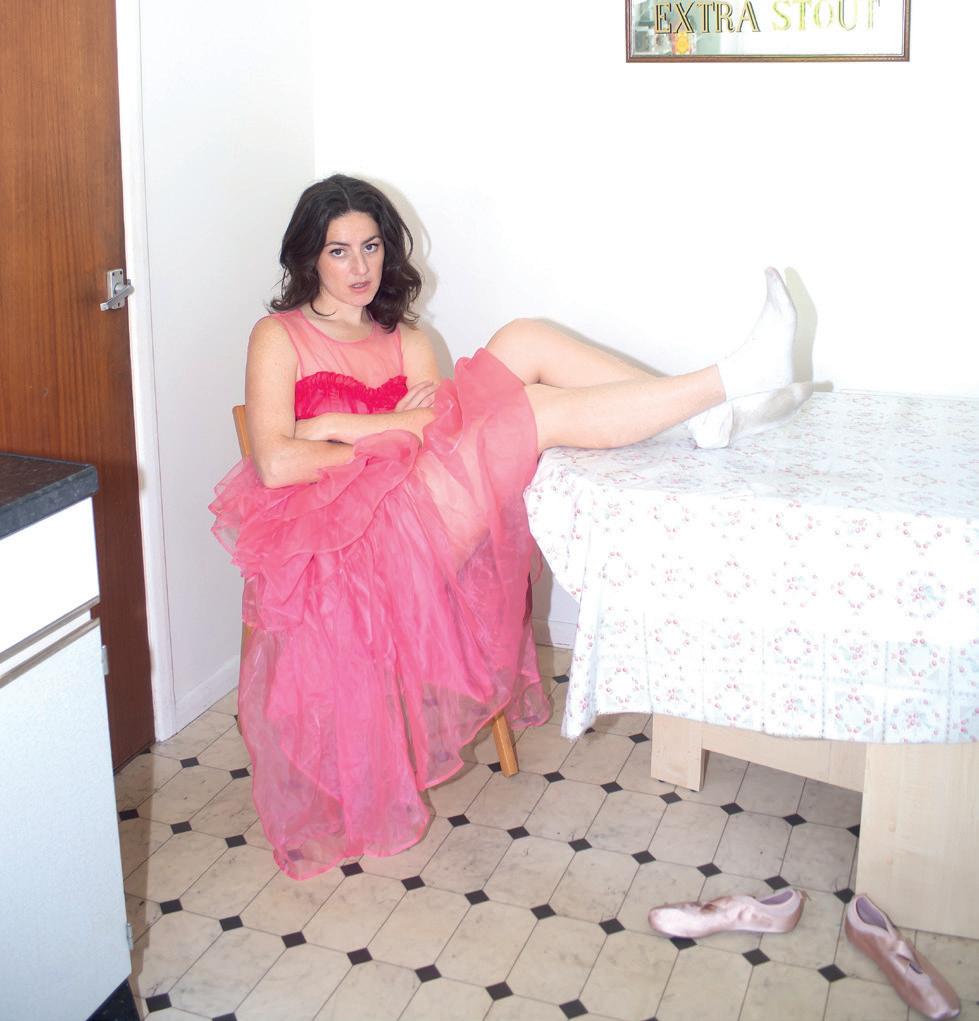





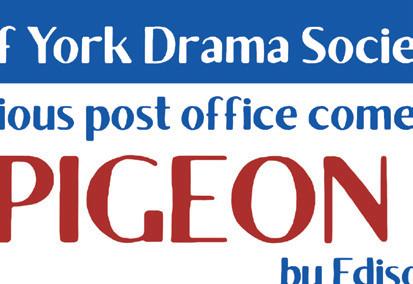
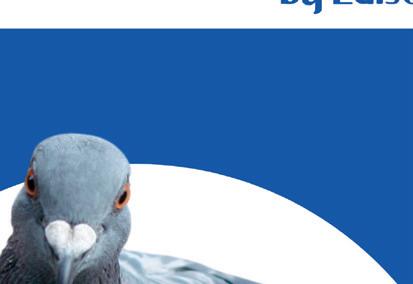

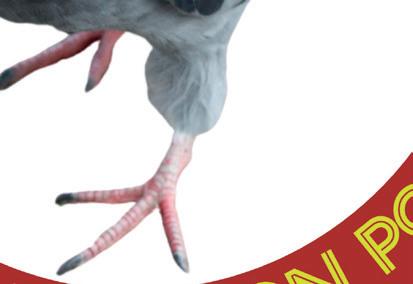










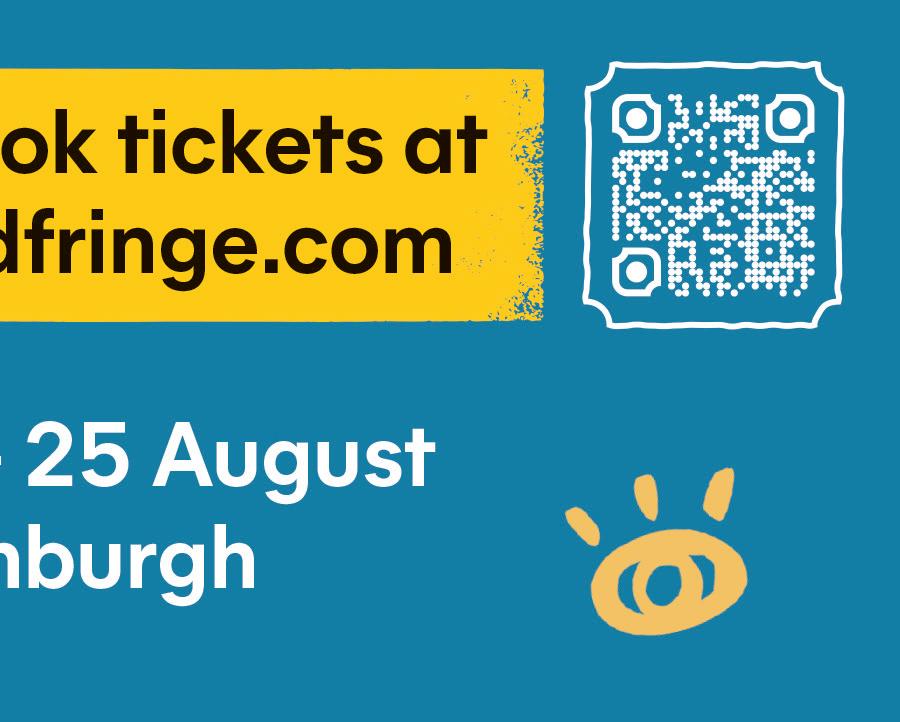
Alison Spittle remembers exactly where she was when she saw photos of Adele’s weight loss. It felt like a betrayal for the fat community: it was their 9/11, she deadpans. Then a life-threatening health scare hospitalised Spittle. Friends sent kilos of Ferrero Rocher in sympathy just as Spittle decided to begin Mounjaro weight loss treatment; she reveals she’s recently lost ‘an XL bully’s worth’. Spittle chirpily unpacks her mixed feelings. She once made it a proud mission to become famous as a larger comedian, and succeeded, with regular TV stints. As a Pointless superfan, being on the show was the best day of her life. She loved being fat, she explains, but the abuse she got and realising she couldn’t fit on rollercoaster rides made her tired.
This is no pity party; in fact Spittle dishes out laughs at a rapid rate. She crafts a very funny and moving set without wallowing, just showing flashes of the pain that led her here. Growing up on an Irish council estate, a dark childhood trauma gets a passing mention, enough for us to understand why comedy became a coping mechanism. Minus the gross-out moments, with this show, Alison Spittle is really spoiling us. (Claire Sawers) n Monkey Barrel, until 24 August, 4.45pm.
Once seen, never forgotten. The elaborately costumed Su Mi is a cartoonish but sexualised clown, whose avowed motherfucking energy is boisterously directed towards the negligible threat of shagging your mum and carving out a space for their own representation. A queer BritishMalaysian performer, Su Mi is channelling some overt adolescent issues, an aspect of the show which is increasingly voiced as their initially loud, intimidating presence and audience interaction settles down.
Sporadically amusing and somewhat discordant, this hour is a varied box of tricks and costume changes, incorporating sometimes baffling musical numbers and countless props, with endless creative applications of the latter in ingenious ways. Despite being brash and bawdy, Su Mi has spilled their guts by the end, the vulnerability they evince apparent in the communal spirit that is ultimately forged with their crowd. From wildly expressive to intimately introspective, this is a diverting and finally feelgood hour. (Jay Richardson) n Underbelly Cowgate, until 24 August, 6.40pm.
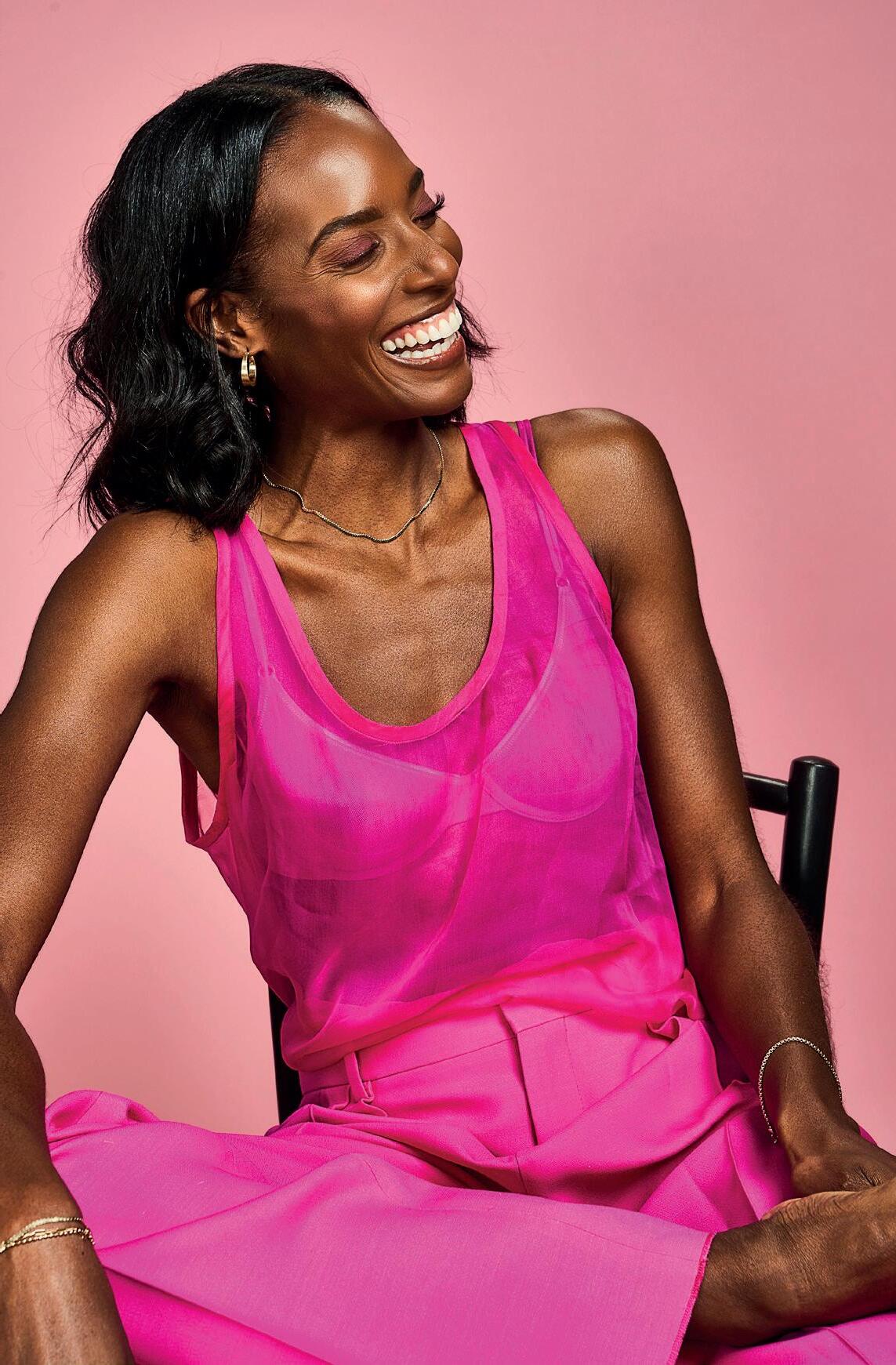


Using a single word to sum up a performer can be a dangerously reductive game, but one keeps popping up when watching Zainab Johnson: raconteur. Granted, it’s a curiously old-fashioned word for a zeitgeisty performer whose set primarily covers all the big millennial preoccupations: buying her first home, dating on the apps, cute fluffy animals, and owning a gun (as a black Muslim woman she is not the DEI they had in mind apparently, but it is easier to get a gun than a husband).
Yet raconteur is the best word to describe her laid-back, conversationally intimate style which once again proves that the right story, told well, can transcend any cultural boundary. Most of an Edinburgh-based audience won’t be troubling the gun store any time soon, but so convincing is her schtick that we’re soon nodding along and seriously considering the relative safety values of gun ownership versus leaving an empty pair of men’s boots in the porch for lone women in houses. She’d be dangerous in telesales.
The final 20 minutes is impossible to describe without spoilers; let’s just say the pay-off is a glorious ‘fuck you’ to comedy gender norms that elicits a genuine roar of joy from an audience she’s held in the palm of her hand from the off. There’s no such thing as an overnight success in this business, but there’s a real sense that Johnson is about to catch a very big wave. (Jo Laidlaw) n Pleasance Courtyard, until 24 August, 6.40pm.















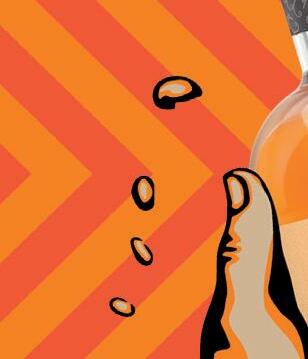

























With her debut character comedy show, Bebe Cave takes us on a journey of devotion, delusion and downright hilarity. Robyn Bell prays at the altar of Christbride

















Ever imagined the fate of a medieval girl who dared to defy tradition? Someone who refused to marry and bear children? For Batilda Bigbum from Littledick, the consequence is a fiery death at the stake.



tale of how she ended up in such a predicament. And what
Christbride, Bebe Cave’s one-woman character show, throws us straight into the flames, opening with her agonised screams before she recounts the absurd and irreverent tale of how she ended up in such a predicament. And what follows is one of the most exhilarating, laugh-friendly hours you’ll spend this Fringe.
Cave is a masterful storyteller, weaving audience interaction, humour and hasty costume changes into a performance that is equal parts theatrical brilliance and comedic gold. With nothing more than a few outfit tweaks and an array of accents, she transforms into characters including Batilda’s disapproving mother, a parade of disastrous suitors and a chorus of nuns, all while maintaining an infectious energy that keeps her audience hooked.

The year is 1384 and Batilda is prepping for a banquet with potential husbands; but this isn’t your typical Middle-Ages courtship. Instead the audience is treated to Batilda serving a medieval GRWM (‘get ready with me’, for the TikTok-illiterate) complete with a fit check and a bardcore rendition of Charli xcx’s ‘360’. Shame her hennin (cone-shaped headdress) couldn’t hide her small forehead. When it comes to choosing a potential mate, things don’t go as planned so she does what any self-respecting weird medieval girl would do: abandons marriage altogether and becomes a bride of Christ instead.


The audience is then taken on a religious journey as Batilda leaves a life of monotony for an existence of devotion. But devotion, like delusion, has its limits. As Batilda’s self-belief ramps up, the line between sainthood and deception blurs and the result involves fake miracles, divine fraud, dark confessions and, of course, a healthy dose of witch accusations.





In an age where credulity runs rampant, a riotous, historical farce about the dangers of unwavering confidence, proving delusion burns just as bright as heresy. Cave’s show is a masterclass of anarchic comedy, blending historical detail and shameless modern humour. Her performance is chaotic, clever and brimming with genuine love for the absurdity of the past. This will make you laugh until your sides hurt and secretly glad you weren’t born in the Middle Ages. Unmissable.
Bebe Cave: Christbride, Pleasance Dome, until 24 August, 5.40pm.

Christbride delivers love for the absurdity of the past. This will make you laugh

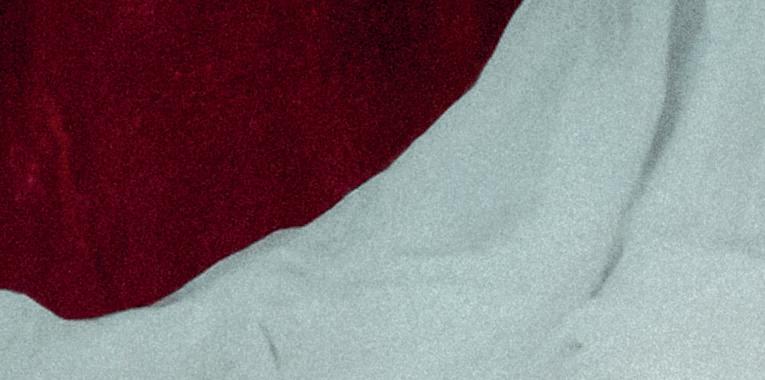






Joe Kent-Walters’ anarchic alter-ego Frankie Monroe has dug one hell of a hole for himself. After being jettisoned from a working men’s club in his native Rotherham and dragged by the ghoulies to the infernal pit for crimes against cabaret, you’d be forgiven for thinking that eating brimstone for breakfast might start to piss on his chips. Not a bit of it. Frankie revels in purgatory until an arch Lancastrian nemesis unleashes a plan so despicable it threatens to undo everything he’s worked for.
Kent-Walters damn near chucks the entirety of the variety genre at his audience, using animation, songs, puppetry and the kind of throwback northern humour Jim Bowen would have bent his own bully to be a part of. His take on character comedy is so relentlessly daft, it doesn’t so much tease out the laughs as wrestle you into compliance. If this sounds a lot, it is; yet nothing feels superfluous. Wielding hilarious crowd participation (fully bog-washed in irony), he constructs a ridiculous world where meat-based miscreants roam freely and a man can forfeit his phone betting on asparagus, yet it all makes complete sense.
He even crams in a recognisable tonal shift, when the scurrilous Vegas Dave (also Kent-Walters) enters halfway through, lampooning hipster bars and inventing a crowd chant for the ages. Writing a follow-up to last year’s Edinburgh Comedy Award Best Newcomerwinning hour might have spooked some, but not Kent-Walters; this show’s creativity would give you the shivers. Who knew eternal damnation could be this much fun? (Gary Sullivan) n Monkey Barrel Cabaret Voltaire, until 24 August, 9.30pm.



We’re in 1940s Noo Yoik and a heinous crime has been committed in the Big Apple. Who will save the day and solve the seemingly unsolvable? Enter Christian Dart’s Detective Gumshoe with his film-noir swagger and questionable accent. The audience are corralled into the action, assisting in the crime’s creation and helping Gumshoe prove his own genius. This is frenetic, fast-paced and genuinely funny. Dart uses exposition to get us where we need to be but it is done with a clever, self-aware touch. With the help of his sister Johanna and her mixing machine at the back, we are transported to an age where women only wore skirts and men solved crimes after a bottle of bourbon.
Gumshoe! is a well-written and thought-through hour masquerading as kitsch and slapstick. And it is very Fringe. Every show will be different, with Dart fuelling his story from each audience’s ideas and responses to the action. The only real gripes are the overused joke about a certain boyband, and a section where he spins a toy gun on his finger for what feels like an age. Those details aside, it must be said that even when things did not always go to plan, they somehow still felt like they had. (Louise Holland)
n Gilded Balloon Appleton Tower, until 24 August, 3.40pm.
There’s an unassuming air to Eric Rushton’s delivery. He’s not quite deadpan, but he is subdued enough to knock out grade-A punchlines with a shrug, basking in a superlative gag rate to conceal the dark heart of his story. Dealing with his declining mental health and inability to maintain romantic relationships, and the near-impossible chance of accessing mental-health services without waiting for months on end, this would be a troubling trauma narrative if the Manchester comedian didn’t ply his crowd with wordplay.
That there’s a buoyancy in the air throughout is testament to Rushton’s deft balance between serious storytelling and shrewd one-liners, combining seemingly disparate material to create a portrait of himself that’s deeply flawed while completely likeable. His sonorous flow of merciless self-deprecation remains an anchor that negotiates male mental health without descending into cliché, but the one-liners are the star here. Plenty of them will stick in the memory. (Kevin Fullerton) n Monkey Barrel Hive, until 24 August, 3.20pm.
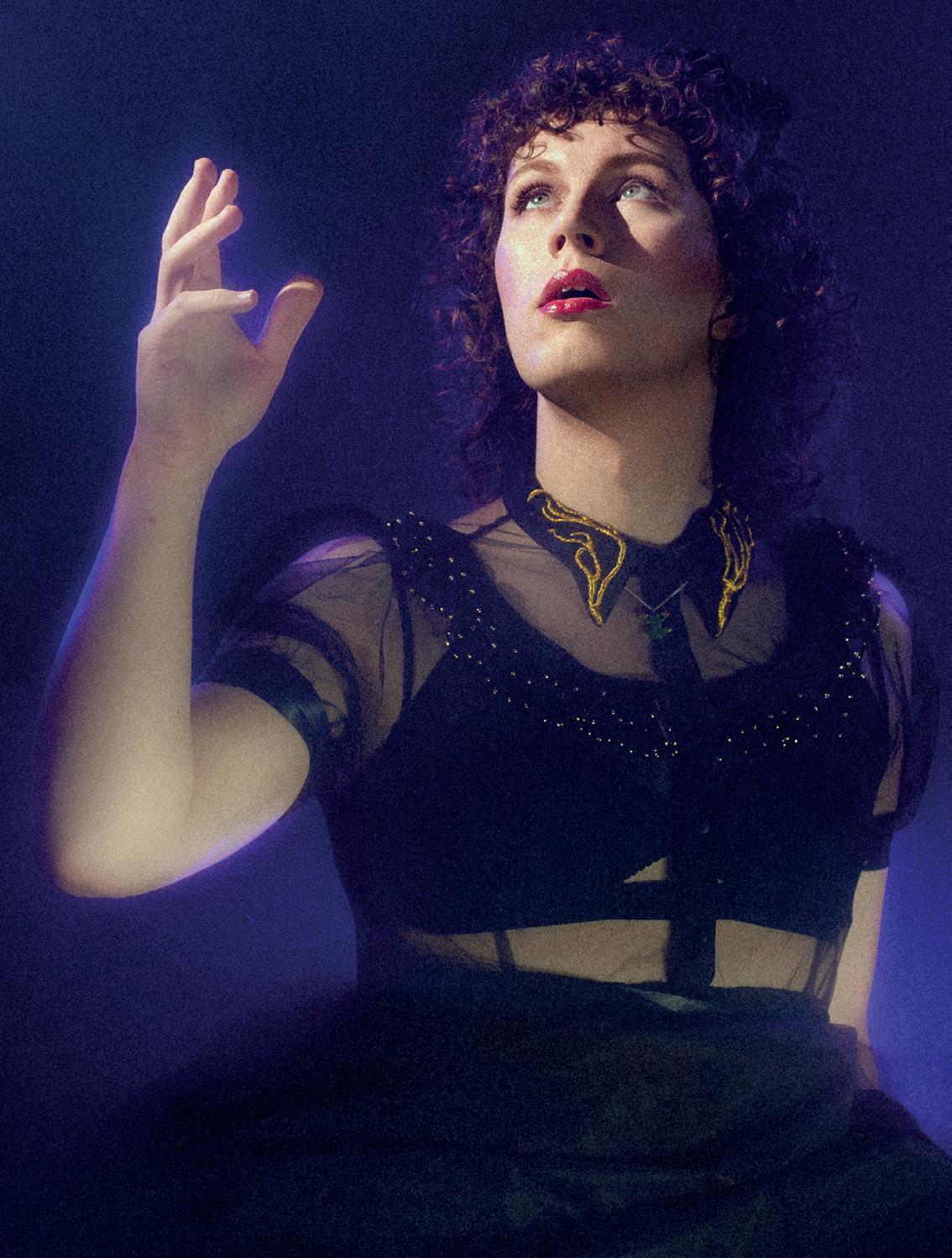
Helen Bauer shares a stage today with her imaginary eight-year-old self; it’s part of some inner-child therapy she is doing. The 34-year-old comedian is also trying to find her compassionate voice and practice self-love but Bauer is struggling with that as she finds selflove a very ‘gauche’, cringey, American concept. For now, the voice from the Trusty Hogs podcast with Catherine Bohart is still shouty, and her schtick mostly bitter and unhinged. She jokes that she keeps wishing ill on her friends and accuses her crowd of being mentally ill, just like her. ‘I can smell the sertraline!’, she nods, gesturing at the audience.
There are confessional glimpses of growth among material about being the biggest, loudest personality in her friendship circle. She pokes fun at her constant need to be witnessed and describes her slow recovery from binge eating. After touching on the dysfunction in her own relationship with her mother, Bauer draws out the collective concerned mother hen in the audience when she announces, slightly unnervingly, that she had surgery only a week earlier. A walking work-in-progress, it feels like she is still in the thick of her therapy ‘journey’ but more laughs might come once she’s had a chance to heal a bit more. (Claire Sawers) n Monkey Barrel, until 24 August, 3.20pm.
A deliberately faltering, faux-dramatic start instantly sets the scene for Dreamweavers and neatly encapsulates the chaos ahead. Real-life siblings (and daughters of comedy royalty Ruby Wax and Ed Bye) Maddy and Marina Bye stalk the room, armed with their dream helmet. They claim it can read and bring to life the subconscious escapades of anyone who wears it, although it looks suspiciously like a colander wrapped in fairy lights.
Frequently laughing at their own daftness, the pair’s commitment is constantly charming, and they share an uncommon chemistry that empowers them to improvise with abandon, often deliberately sabotaging one another to the audience’s delight. A few members of the front row are beckoned onto the stage for some light ribbing and it’s a testament to the sisters’ brilliant crowdwork that they join in with reluctant gusto. Dreamweavers is a wonderful, anarchic sketch show from two superb performers, and despite its unruly flow there’s a great script holding it all together. (Murray Robertson)
n Pleasance Courtyard, until 24 August, 8.20pm.
In a dimly lit bunker, our hero begins her quest to find the perfect two-piece suit. And so the audience are invited along on Sam Nicoresti’s transitional, transgender and occasionally transcendental experience of living. The punches fly early, filthy jokes served ice cold as Nicoresti prowls around the stage in a velvet-brown skirt-suit, taking up every inch of space available to her. She introduces herself as a ‘shit woman’ (the Duolingo version: great in her bedroom, can’t navigate a conversation IRL) but incredible at being trans.
Nicoresti is also an incredible comedian. There’s not an ounce of hesitation; her rapid-fire monologue flows in a quick northern patter that makes it sound like she’s slamming her cousins round the dinner table, not performing a sell-out gig at the Edinburgh Fringe.
A nightmarish scene in a TK Maxx changing room has the audience sweating along with her; a clever subversion of transphobic fears (public masturbation, no less) makes them roar: ‘oh, but you keep laughing at it!’ she teases. They are noticeably hungry for her stories, egging her on. ‘Don’t clap at the puns, girl,’ she scolds one overenthusiastic audience member.
Her monologue is nuanced, self-deprecating, dirty, creative and accomplished. This isn’t the phoenix-from-the-ashes trans narrative, it’s a rich, complicated story of being human: drug-fuelled posttraumatic stress, neurodiversity, believing in magic, family dynamics (what do you call a non-binary aunt or uncle?), and a tender love story. Much like Sam Nicoresti and her foray into skin-tight dressing, this show is bursting beautifully at the seams. (Afreka Thomson) n Pleasance Courtyard, until 24 August, 5.40pm; plus 15 August, 8.20pm; Summerhall, 13 August, 3.40pm.



In a hotly anticipated Fringe debut from this talented Glaswegian comedian, Jack Traynor tells of how his grandad (the ‘big man’ who brought him up) has been reduced by dementia and is living in a nursing home. It sets the comic off, wondering what he will forget when he ‘inevitably’ gets dementia himself. Traynor is a hugely charismatic performer and certainly knows how to pen a gag, shooting out finely tuned punchlines throughout. He’s masterfully quick to respond to folk in the audience too.
The only quibble is that it feels as though he’s not fully committed to his theme. He openly jokes about shoe-horning it in because that’s what’s expected from an Edinburgh show, resulting in an enjoyably silly running visual gag to distract us from its supposed lack. But conversely this gambit sets up the expectation of a more structured show, which he doesn’t quite deliver on. Perhaps he’ll develop more faith in his own theme as the run goes on. Regardless this is a debut that certainly showcases his talents as a stand-up and it’s very clear he’ll go far. (Marissa Burgess) n Pleasance Courtyard, until 24 August, 9.55pm.
lll ll
Candace Bryan’s mother had her when she was just 17, then left her to be raised by a single dad. This show is ostensibly about the search for her mum, but in reality it’s a gag-packed hour of jokes about sex, drugs and daddy issues. Bryan wonders if being raised by a man in his 20s has led her to have toxic masculinity. Indeed, her crass hook-up one-liners echo male American comedians now firmly out of favour. Some are genuinely witty while others elicit a collective groan from the audience, but they come so thick and fast (Bryan would make a joke out of that, too) there’s barely time to react before the next one arrives.
This ‘smutty section’ feels out of place in the story she’s trying to tell about her parent. But the truth is, there’s not much of a tale to impart, as Bryan acknowledges towards the end. The hour-long run-time leaves the material feeling stretched thin and uneven at times, but there are flashes of excellence in this Fringe debut from an amiable comic who balances dirty jokes with moments of genuine insight. (Lauren McKay) n Just The Tonic Nucleus, until 24 August, 3.10pm.
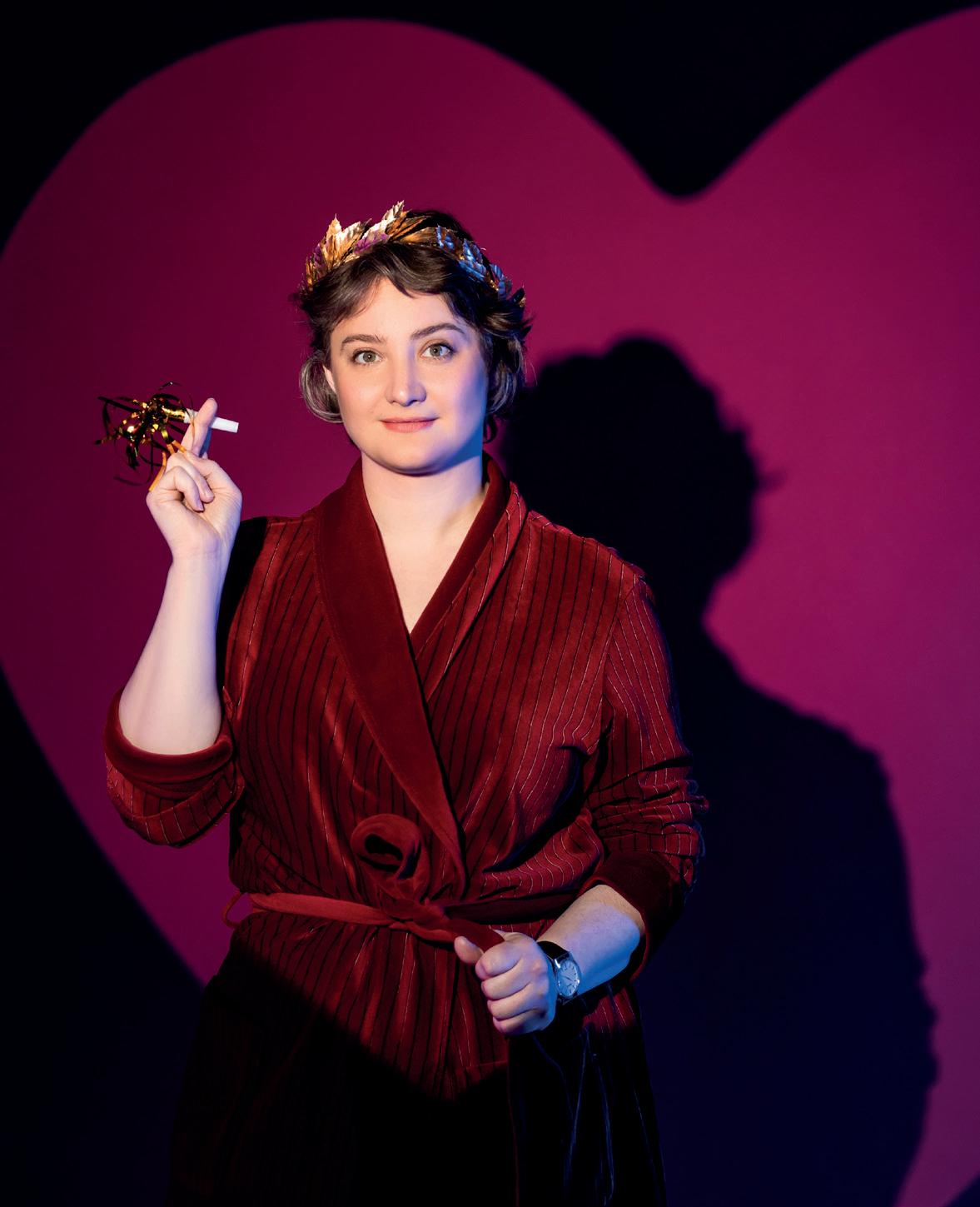

Laura Davis is no stranger to the comedy circuit and has mined through enough ‘day jobs’ to feed several routines. This show is different though; it is intensely raw, personal and chaotic, an energetic hour that takes us on a disjointed memory cruise through heartbreak, mental illness, Virginia Woolf, the dentist, and navigating personal trauma (among many other things). There are plenty of laughs, but it’s very poignant in places and Davis has a defiant fragility. This could come off as awkward or stilted in another’s hands but the Australian knows how to control a room and, most importantly, themselves: you’ll be won over fast.
Despair Is Beneath Us also casts a sharp eye over the state of the world and how we are all quietly complicit through inaction. It’s not a sermon; it feels like a conversation and we need more of those (you may well agree with Davis that being eaten by a lion would be the perfect way to go). The show has some very funny and relatable set pieces amid the frenetic energy, but if you expect to be rolling in the aisles, you’ll likely be disappointed. This is less stand-up and more emotionally charged spokenword/comedic monologue. The overarching message is that you don’t need to understand why someone feels a thing, just that they do feel it, and Davis allows us inside their mind as they work through these issues. Despair Is Beneath Us is connective and well worth your time. (Louise Holland) n Monkey Barrel, until 24 August, 5.45pm.
Stepping out to the nasally whine of Axl Rose crowing ‘Live And Let Die’, Emmanuel Sonubi is met with a roar from an enthusiastic crowd. Countless prime-time TV appearances have cemented his reputation as a dependable comedian, and he continues to make hay from his imposing stature and previous career as a bouncer. He explains that Life After Near Death is about how, a few years ago, he came to terms with a diagnosis of heart disease, a condition that took him to the brink of death. He also has to wear glasses now, and so the inexorable march (and privilege) of ageing is very much on his mind.
Happily, this is no valedictory and, considering the impact that cardiomyopathy has had on Sonubi’s life, it’s surprising that little of the show focuses on it. But it has caused him to rethink some of his past behaviour; a section on the very many drugs he’s taken over the years goes down well with tonight’s middle-aged crowd although it’s the sort of material a club comic might have come out with in the early 2000s.
Sonubi is on firmer ground with his edgier gags, especially when he tackles issues of race. He drops these with tactical scarcity and they raise a nice frisson in an overwhelmingly white room. Insisting that there’s no moral to the show beyond enjoying life, it’s clearly a lesson he himself has taken on board. This is a solid hour of stand-up from an interesting voice. (Murray Robertson) n Pleasance Courtyard, until 25 August, 8.10pm.


Kiwi comic Becky Umbers has a dry, very self-aware humour with plenty of flair: think witty observations about life, relationships and cultural quirks. In Put That Cat Back In The Bag, she tackles everything from horse enthusiasts and ‘train people’ to New Zealand’s famously ‘useless’ national bird, the flightless kiwi (a perfect metaphor for life’s little disappointments). She dissects everyday oddities, finding fun in the mundane, and turns it into comedic gold. Umbers has a knack for detouring into hilarious tangents, only to circle back seamlessly to her original point, leaving the audience both charmed and disarmed.
Straight off the bat, Umbers addresses the elephant in the room: her unmistakable voice. Some might assume that its high-pitched, squeaky and helium-esque tone is a put-on for comedic effect. But no, that’s 100% her, and she leans into it with unapologetic confidence. Put That Cat Back In The Bag plays on the idea of keeping personal idiosyncrasies and all that weird stuff about you under wraps until you’ve sussed out the situation. But thankfully, Umbers gleefully dumps hers out and lets it run wild. Her performance feels refreshingly genuine, balancing wit with wry self-depreciation. The result? A delightfully offbeat, slightly wacky and wholly winning hour of comedy. (Robyn Bell)
n Assembly Roxy, until 24 August, 8.40pm.
As with all of Joz Norris’ previous silly, high-concept Fringe hours over the years, this is another portrayal of an egotistical, attention-seeking idiot. The premise is that tonight, after 30 years of toil and tunnel-vision devotion, Norris is poised to reveal his life’s work. An almighty but secretive undertaking, the character believes himself an auteur genius, despite mangling the names of supposed peers such as Van Gogh and Da Vinci. His wife and child neglected to the point of estrangement, he is nevertheless so giddy, so thrilled by the realisation of his vision that he can’t quite bring himself to fulfil it, masochistically savouring the procrastination and his fantasies of immortality.
While it’s no great spoiler to disclose that Norris may not have split the atom or written The Great American Novel, what impresses is the intricacy and layering of You Wait. Time Passes In a white martial-arts outfit (implying a misguided Western version of Eastern enlightenment), Norris indulges in a doomed dialogue with his own self-regard, laying waste to the best-laid plans of his presentation with escalating manic intensity. There are some lovely, farcical bits of business with his new AI girlfriend. And satisfyingly, the big reveal does not disappoint. (Jay Richardson)
n Pleasance Dome, until 24 August, 7.10pm.


A delight for devotees of Rik Mayall and Ade Edmondson’s cult BBC sitcom (who says those words anymore?) as a trio of superfans combine to pay a loving tribute.
n Underbelly Bristo Square, 24 August, 3.10pm.
The Manchester media mogul (maybe over-selling it) must have loved his jaunt to The Stand so much last year that he’s here again, with further tales and confessions.
n The Stand 2, 17–24 August, 4.45pm.

The Ghosts star has a couple of shows on the go this August; this one is String v Spitta, about two children’s entertainers who don’t get on but decide to join forces.
n Assembly George Square Studios, 15–17 August, 9.40pm.


A Fringe return for one of the stand-out co-stars of I Think You Should Leave With Tim Robinson, featuring a typically obtuse title. This year it’s Don’t Ask: A Variety Show With Friends
n Pleasance Courtyard, 18–24 August, 8.30pm.
You may recall the TV version from 20-odd years ago, Doubletake, and this is the live affair which insists You Can Be A Celebrity Too. Quick reassurance: Trump won’t actually be there in person. It might just look that way.
n Assembly Checkpoint, 20–23 August, 7.40pm.

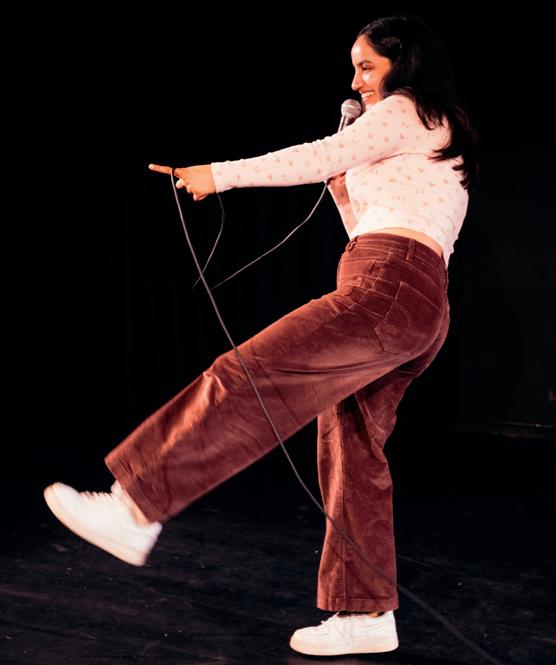
The 2023 Edinburgh Comedy Award Best Newcomer is laying aside her naturally polite demeanour and is getting tough on all of our asses. How To Be A Baddie feels like a stretch, though.
n Monkey Barrel, until 24 August, 6.25pm.

Big in Edinburgh far too long ago and finally back with a pun-heavy show title: Guess Who’s Bec, Bec Again? Bec Hill’s Bec! (Tell A Friend), the Adelaideborn comic has charm in abundance.
n Gilded Balloon Appleton Tower, until 24 August, 7pm.


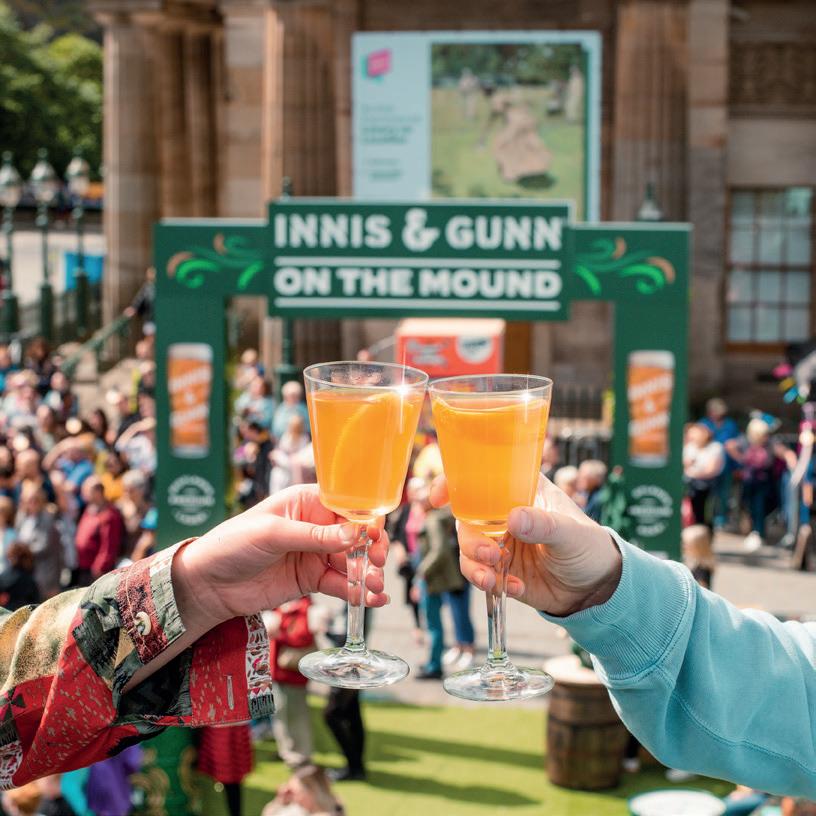

Visit Innis & Gunn on The Mound to experience the best of Scottish food, drink and entertainment.
Open 11TH July to 24TH August























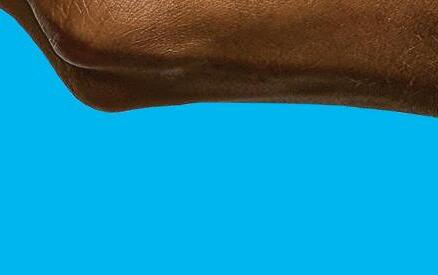























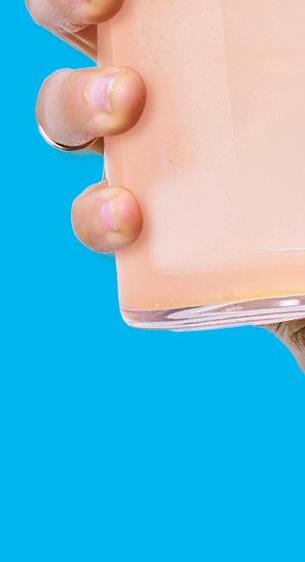
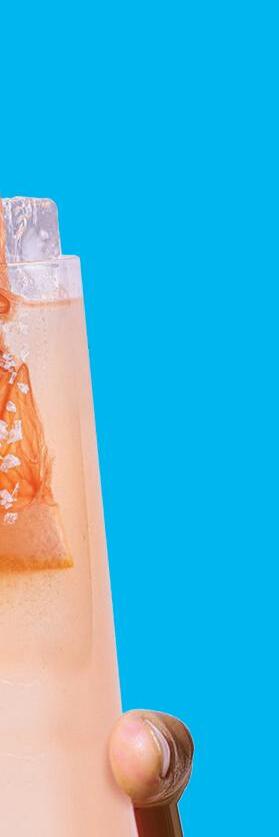
















































































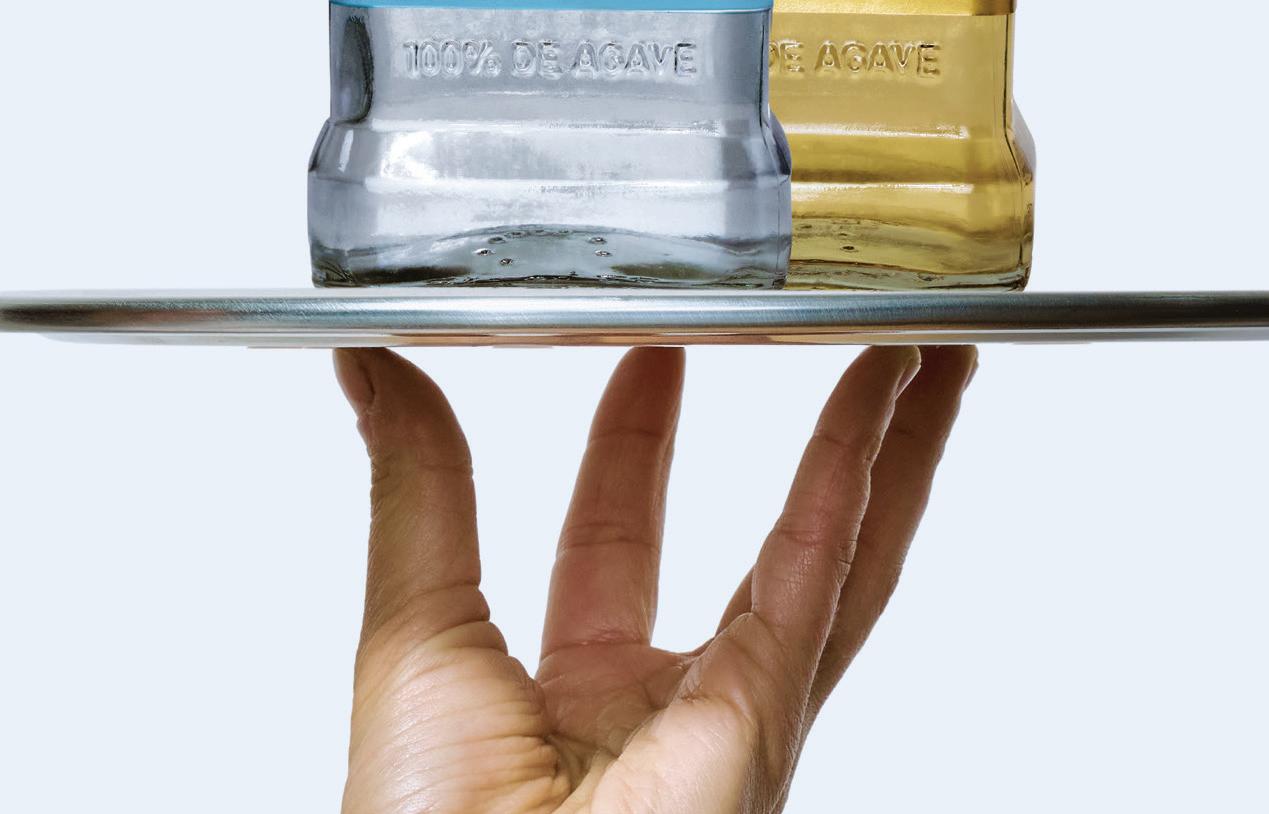










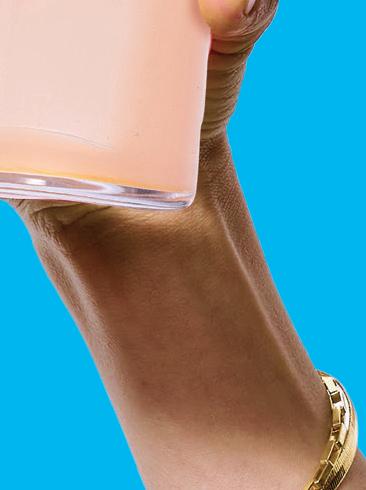





























As part of the Basque Showcase, this solo piece comes from Cielo Raso dance company. First performed in 2023, the hour-long work touches on loss, disillusionment, absence, love, demons and the imagination. Some of the big stuff, pretty much, and created with an elegance that should enthral. n Assembly Dance Base, 19–24 August, 7.50pm.


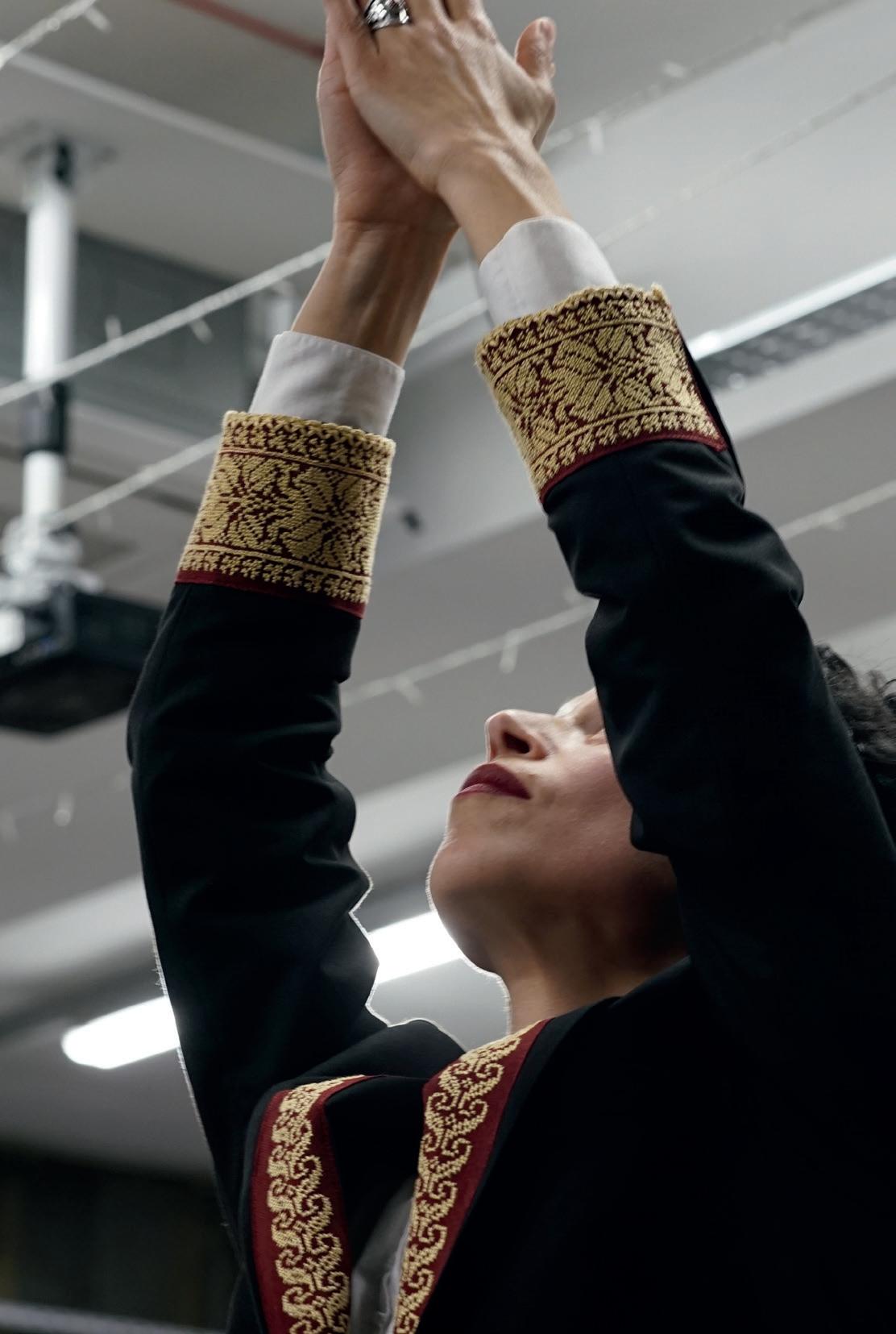
The roots of the crisis in Gaza run deep and wide. Ahead of her dance performance investigating colonialism’s legacy, Farah Saleh tells Haneen Al Eid that thinking is fine but taking action is far better
Farah Saleh understands that we cannot decolonise our curriculums, art and future unless we take collective responsibility for the past and present. In her performance lecture, Balfour Reparations, she confronts the deep colonial roots of the UK in Palestine and, through this, addresses a wider global decolonial incentive. ‘Who controls the narrative?’ she says. ‘For me, it’s very important that Palestinians re-appropriate their narrative and teach it.’
Saleh’s afrofuturistic performance wills you to imagine a 2045 in which the Palestinian people are promised reparations by the UK government. ‘We are here today in this genocide also because of Balfour,’ Saleh explains. ‘Balfour was a Scotsman, an academic and a politician. He had lots of power and wrote the infamous Balfour Declaration where he promised Palestine as a national home for the Jewish people, while ignoring and denying the political rights and self-determination of Palestinians.’ Her Fringe performance explores the history of Palestinian statehood, while also imploring her audience to consider seven realistic initiatives for reparations.
As a member of the Palestinian diaspora, Saleh illuminates the enduring spirit of art in the context of global resistance. ‘It really supports us to stay put in our land,’ she says on the act of making art, ‘and if we’re not living in our land, art supports us to stay sane.’ Like most forms of resistance, art thrives when it is both consumed and created collaboratively. This is why Saleh has also co-organised a showcase at the Welcome To The Fringe, Palestine mini-festival in Portobello. ‘An important aspect of presenting this at the Fringe is for the exchange of
practices and human experiences between Palestinian artists and artists in the UK,’ she says. Ultimately, Saleh, who is part of the team decolonising the University Of Edinburgh curriculum, is interested in much more than internalising the Palestinian people’s pain.
First, politicians must understand that the Global Majority have become resentfully aware of Western hypocrisy, in which decolonisation has become ‘just theoretical or rhetorical with no action,’ Saleh notes. ‘I think people are really, really sick of the Global North and their control over the Global Majority. We really feel it on our skin.’ Second, the performance is a call to action, hence its participatory form which invites the audience to become members of the reparations’ evaluation committee. ‘I am interested in participation and active spectatorship rather than anything passive,’ says Saleh. ‘Only thinking intellectually rather than living a particular experience is a colonial concept.’ Feeling is essential, but beyond that, we must react. ‘It is less about empathy and more about effect; the force that changes something inside of you,’ Saleh notes. ‘You don’t know what exactly, but you feel that it goes towards action, towards you doing some kind of action. That is what I would like audience members to do after the performance: feel, do, think. Thinking is also fine for me, I’m not totally against the intellect, but it can’t only be that.’
Balfour Reparations, Summerhall, 13–25 August, 4.30pm; Welcome To The Fringe, Palestine, Portobello Town Hall, until 15 August.







Set against a black stage cloth with only a few black ropes to play with, Imago conjures a world where we can slip and slide between the elements. That’s partly thanks to a gorgeously evocative soundscape (composed by Nicolas Bernier), beautiful lighting design (Sophie Tang) and stunning performances from Eowynn and Isak Enquist. Their sinewy, angular forms strain and resist, using the ropes and each other to find purchase, create shape and, eventually, gain height.
Corporeal Imago was founded by two former members of Cirque du Soleil, and it shows. Both dancers are as comfortable in the air as on the ground, their aerial movements blurring boundaries between acrobatics, circus and dance. The Enquists are so comfortable in this new form that you almost have to remind yourself their performances are full of difficulty and jeopardy. They make whipping through the air look entirely natural, the ropes that support and confine becoming another character, creating movement and sculptural stillness. However, the lack of narrative drive means it’s a succession of beautiful moments rather than an emotional journey; this encourages us to look on, rather than truly engage. Still, there’s plenty to enjoy in this visually satisfying, boundary-breaking piece. (Jo Laidlaw)
Assembly Roxy, until 24 August, 1pm.
Hani Dance’s sensually abstract piece is inspired by the Romulus and Remus foundation myth of Rome. But don’t come to Inlet looking for narrative; it’s a melting, misty dream of arresting images and subtle textures, driven by Saeed Hani’s powerful, expressive style of choreography. This makes it unnervingly thrilling even in its most opaque moments.
Three naked dancers (Michele Scappa, Francesco Ferrari and Ana F Melero) are part-hidden behind square blocks, topped with heavy metal balls. They use their bodies to create curious shapes: bulbous eyes from upside down buttocks, antennae feet. They limpet on top of each other, making a multi-clawed creature. As they begin to stretch upright, their gaits become more mammalian. Soon they are hefting the concrete blocks around, as if building a civilisation from scratch.
At one point, one dancer lifts Melero horizontally, and startlingly, in Marc Thein’s lighting, she transforms into a classical statue. There are brooding passages of knotted bodies, triskelion arms, crushing fights, and a hallucinogenic nightmare backed by a glowing red column, as Melero writhes feral as a wolf mother. Inlet takes risks and doesn’t always reveal its hand, but it keeps moving forward, towards something, even if it isn’t a reflection of ourselves we want to see. (Lucy Ribchester)
Assembly Dance Base, until 23 August, 5.30pm.





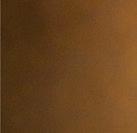




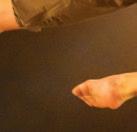


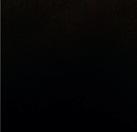

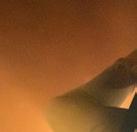





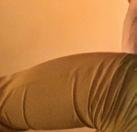

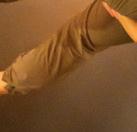





















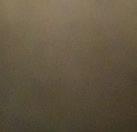

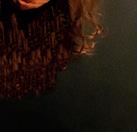



WOLF
Disco music is pulsing, spotlights are flickering and acrobats are sprinting across the stage. What could they be running from?
Whatever it is, it’s surely no match for performer Sam Letch who opens proceedings by lifting no fewer than six of the cast at once. In this piece, named after the most feral forest predator, Australian company Circa are here to demonstrate who the alphas of the circus pack are, and they are not messing around.
The choreography, by Yaron Lifschitz and the cast, never lets up its pace. In Libby McDonnell’s slash-patterned costumes, they take turns to pounce, climb and cling to each other. It’s balletic and athletic, tender and fierce. The balances are wildly creative, and the control these performers display is near immaculate. There are stumbles at the performance tonight, but their recovery is always swift; and is it any wonder when they are pushing themselves to such insane feats?
One acrobat summits and descends another like they are a mountain. They make pillars of bodies and tilt them together, locked in an A-frame. Christina Zauner dances a thrashing aerialstrap solo, with splayed feet at gnarled angles. There’s a rough, cub-like play to the inventive acrobatics, and sometimes the impact with which the dancers throw themselves at the movement (and each other) looks as painful as lupine fangs biting flesh. All of this is set to a fight-or-flight, throbbing soundtrack from DJ Ori Lichtik, making for a thrilling, savage ride. (Lucy Ribchester)
Underbelly Circus Hub, until 23 August, 6.20pm.
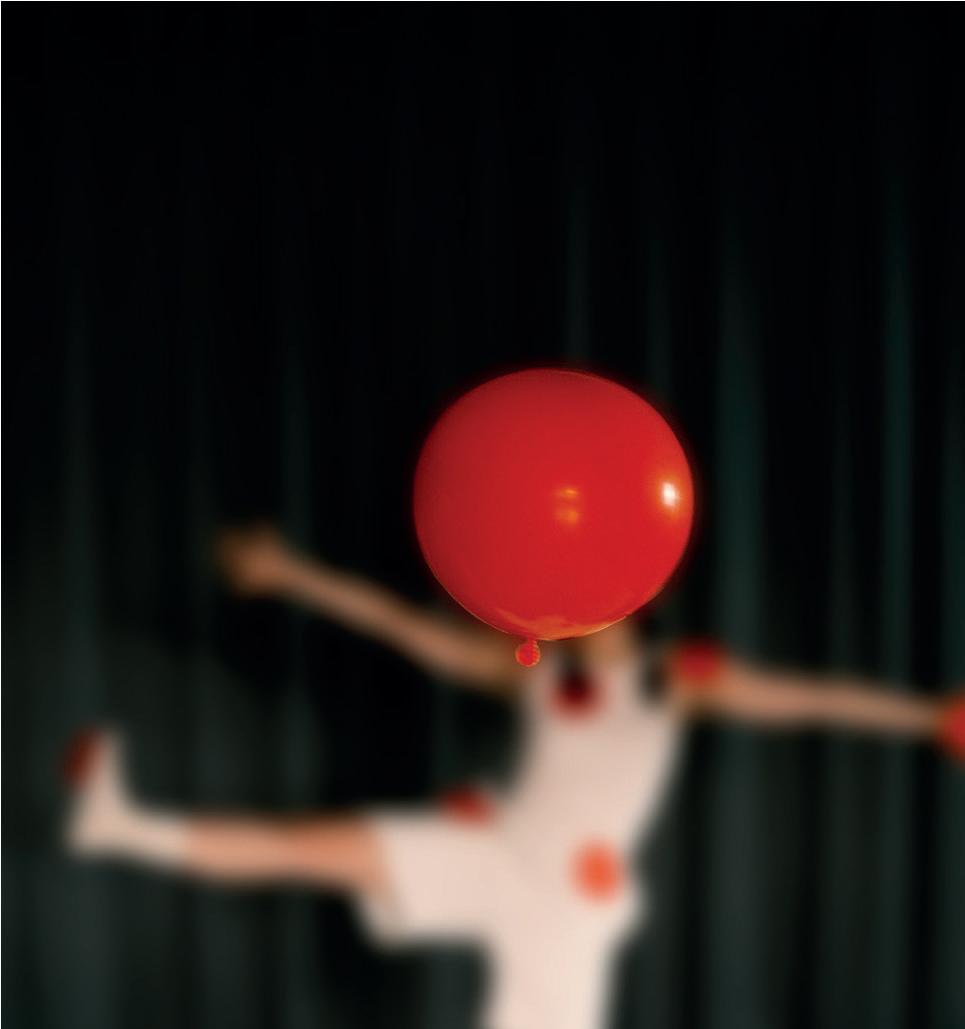

“I have never been just myself; I am a product of both myself and the poeple around me’’
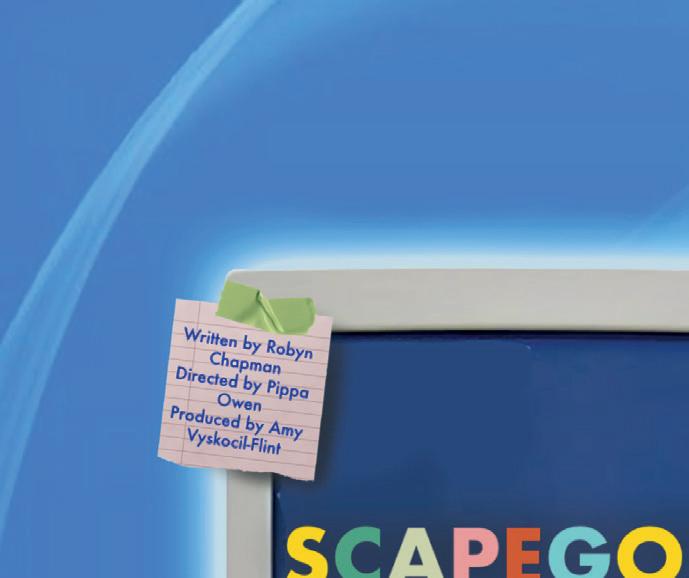


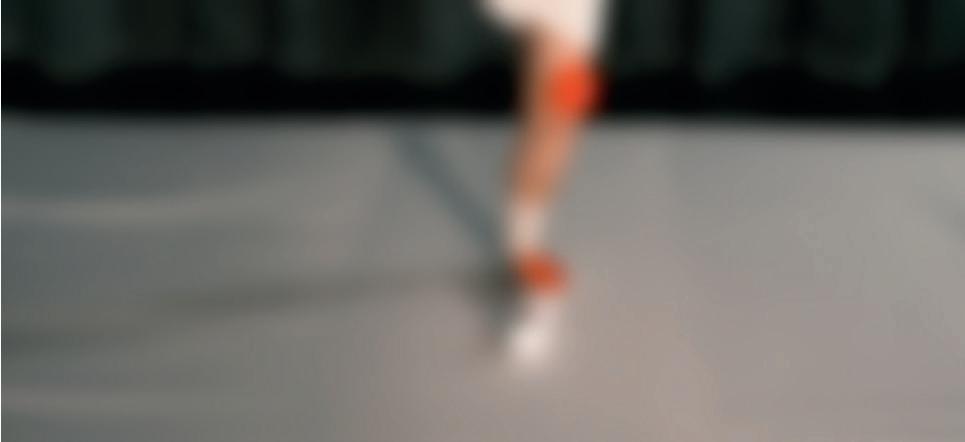














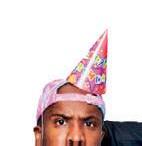
















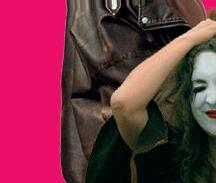



















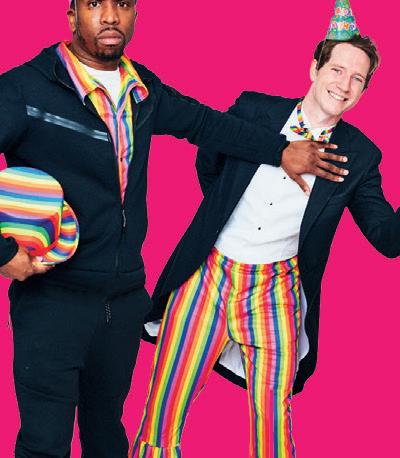


















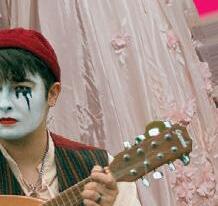
















Serious about community and engagement, the team behind Small Town Boys provide an interactive, passionate and fabulous experience.
Jo Laidlaw insists that you take a step inside
Right from the start of Small Town Boys, there’s a sense of something different in the air. Even climbing the steps at Zoo Southside feels a bit like piling up one of those difficult-tonegotiate staircases at some dingy Cowgate club. As the audience enter, we become part of the action (bring your dancing shoes) and a cast of eight professional dancers are supplemented by a community cast that fill the stage. It’s clear that Thomas Small’s Dundee-based Shaper/Caper company is serious about engagement and inclusion; a burning desire to create, to process and to protest drives the urgency of this piece as much as the Hi-NRG beats of its fabulous soundtrack.
As signalled by the title, the story is familiar: young gay man escapes to the big city and finds queer joy at Paradise (named after the iconic London club). But it’s the 1980s so the HIV/AIDS pandemic looms large. That’s ahead of us though, and the opening is pure delight, with deceptively simple, stripped-back choreography producing the kind of dancing we all secretly think we can do, given the right song and enough room on the dancefloor. Of course, we cannot, yet the ‘I could if I wanted to’ energy is another way to blur the boundaries between us mere mortals and the cast.
A section starring a set of toilet doors is hilarious and brilliantly inventive, while the solos and beautifully tender balletic pas de deux that set up the storyline are perfectly executed. The set incorporates a bank of TVs which signal change and ratchet up the tension as they broadcast news stories from the 80s. The infamous ‘tombstone’ HIV advert appears, mixed into a pounding disco beat that truly makes the hairs on your neck stand up. From here, there’s grief and outrage in equal measure, with the tiniest movements all embodied with passion, precision and power.
Small demands a lot from the cast, and the acting required is occasionally a stretch, but each dancer is utterly convincing in their storytelling. It’s never less than wildly creative either and there’s always a detail to catch the eye: condoms, placards, messages written on the body. Beautifully danced and brilliantly conceived, this is an important lesson in queer history and (even if some younger folk seem confused by a Thatcher cameo) it’s gorgeous to see all ages being equally moved by its intensity and relevance.
Small Town Boys, Zoo Southside, until 17 August, 7.15pm.
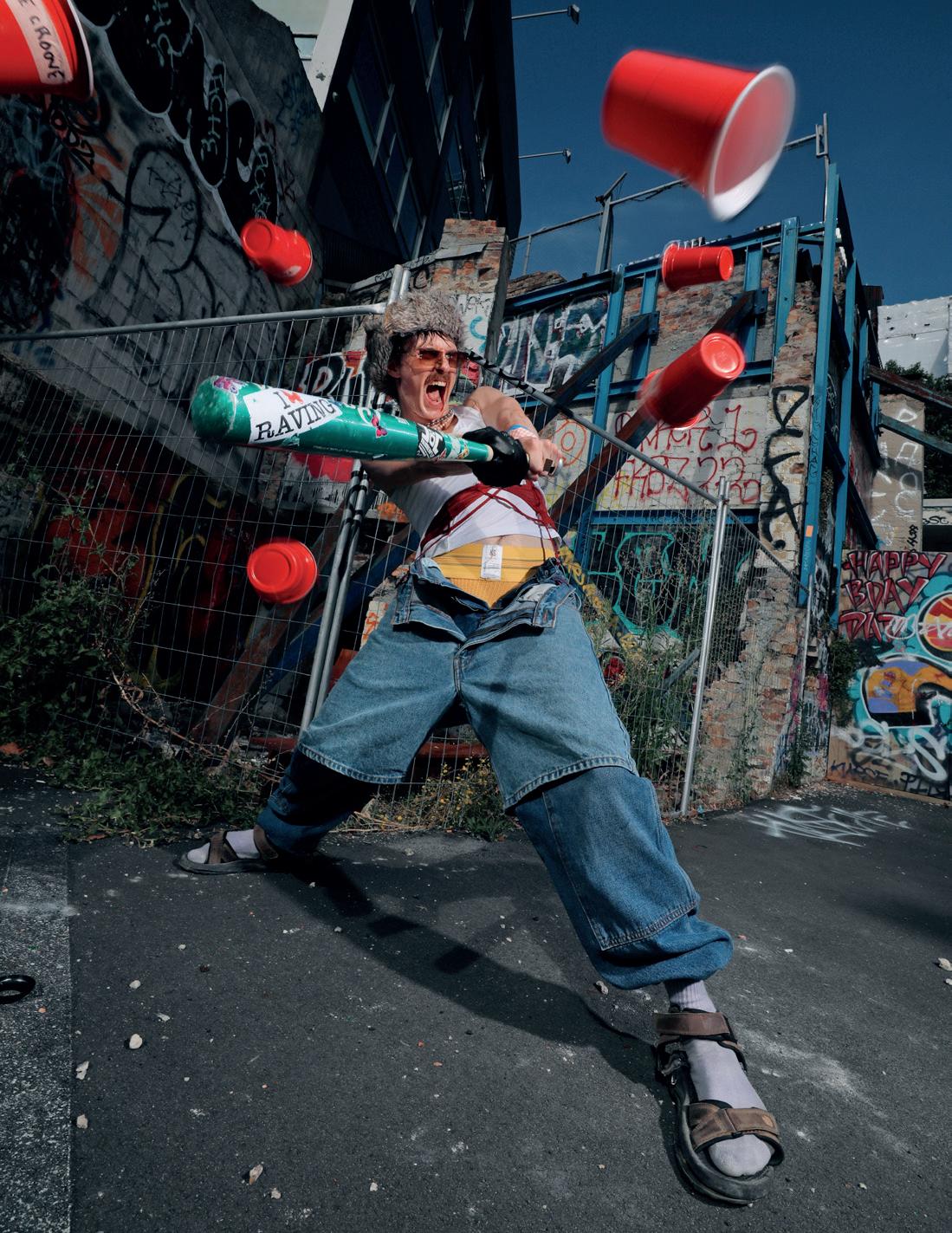
Dance has a history entwined with endurance. There was the deadly dancing plague that swept Europe in the 16th century, possibly caused by poisoned rye. Then there were the American 1920s dance marathons, where contestants would dance day and night for cash prizes, sometimes for weeks at a time. More recently, pieces like Andreas Constantinou’s Mass Effect or Emma Martin’s Night Dances have experimented with the idea of dance exhaustion, the latter melding shamanic spirituality with club dancing, as the performers reach a state of euphoria even as their bodies are drained.
Into this tradition The Butterfly Who Flew Into The Rave comes thumping. Three dancers (Oli Mathiesen, Lucy Lynch and Sharvon Mortimer) throw themselves into an hour of relentless techno drills to Suburban Knight’s Nocturbulous Behaviour album, passing through states of emotional intensity: grit, aggression, ecstasy. At times they move with the precision of the possessed, at others they come apart into states of wildness.
Sometimes they all look up, raising their eyes and arms as if the bone-shaking beats of the rave are a god they must appease. As well as shamanism, the piece has echoes of Gregorian chants in its cycles of repetition.
The audience share this intensity too; even watching it feels physically merciless. The room is sweltering, the bass makes your organs tremble, the strobes are blinding. Some people will feel transcended, others as if they are undergoing CIAenhanced interrogation. But however your own body responds, the mental focus and stamina of the dancers is truly something to behold. (Lucy Ribchester)
n Summerhall, until 25 August, 6.05pm.
Guinea-founded, Montreal-based Cirque Kalabanté, headed up by Yamoussa Bangoura, is back with a brand-new piece, after the success of 2023’s Afrique En Cirque WOW (World Of Words) finds the company in similar territory to its last production, celebrating Guinean culture through dance, vignettes of rural life, and call-and-response banter with the audience, as well as showcasing the cast’s astounding talents for tumbling.
This show feels a little bit darker in tone, and there is something not quite coherent about it. After a brooding opening, with performers swirling around the floor in regal blue capes, they split into two groups to chase and grapple with one another in acrobatic stage fights. It’s a unique frame for a circus set, but feels at odds with the otherwise joyous vibe. Similarly the act from contortionist Mohamed Ben Sylla (a star in the troupe) contains a strange mixture of showy tricks and unease, when he writhes and twists in ropes held by two men.
It is a treat, however, to see Bangoura on aerial straps, and once again his kora playing and singing are breathtaking. The group are back on upbeat form for a wild and athletic finale that has us mouthing that show title. (Lucy Ribchester) n Assembly Hall, until 25 August, 4.10pm.
It’s not such a leap to imagine Lewis Major Projects soon moving from the Fringe to the International Festival, such is the majesty and skill of their work. Triptych Redux builds on Triptych and Lien’s success last year, premiering some new work here and featuring Major himself. The Australian choreographer (a former sheep shearer turned gymnast then dancer) returns to the stage for the first time since 2015 when his dance career was cut short by a broken back. ‘Unfolding’ is an intense, elemental sequence, growing from underwater calm into a squally storm of limbs. Four bodies spiral under lighting designer Fausto Brusamolino’s dizzying pyramid of barcode lines, then one dancer appears to balance on a tightrope of moving light. Finally, two nymph bodies peacefully entangle on the floor, dappled in white sun speckles. In ‘Epilogue Act 1: Lament’, Rebecca Bassett-Graham is lifted for the entire duet by Stefaan Morrow. Her feet never touch the ground; bodies longing and interlocking, wrapping, folding in acrobatic grace. From the opening of ‘Prologue’ with its trio of dancers swirling like jewellerybox ballerinas in black crop tops, to the closing ‘Epilogue: Act 2’ with its corkscrew helix arms and liquid floorwork, this is astonishing, sinewy poetry. (Claire Sawers) n Zoo Southside, until 24 August, 9.30pm.
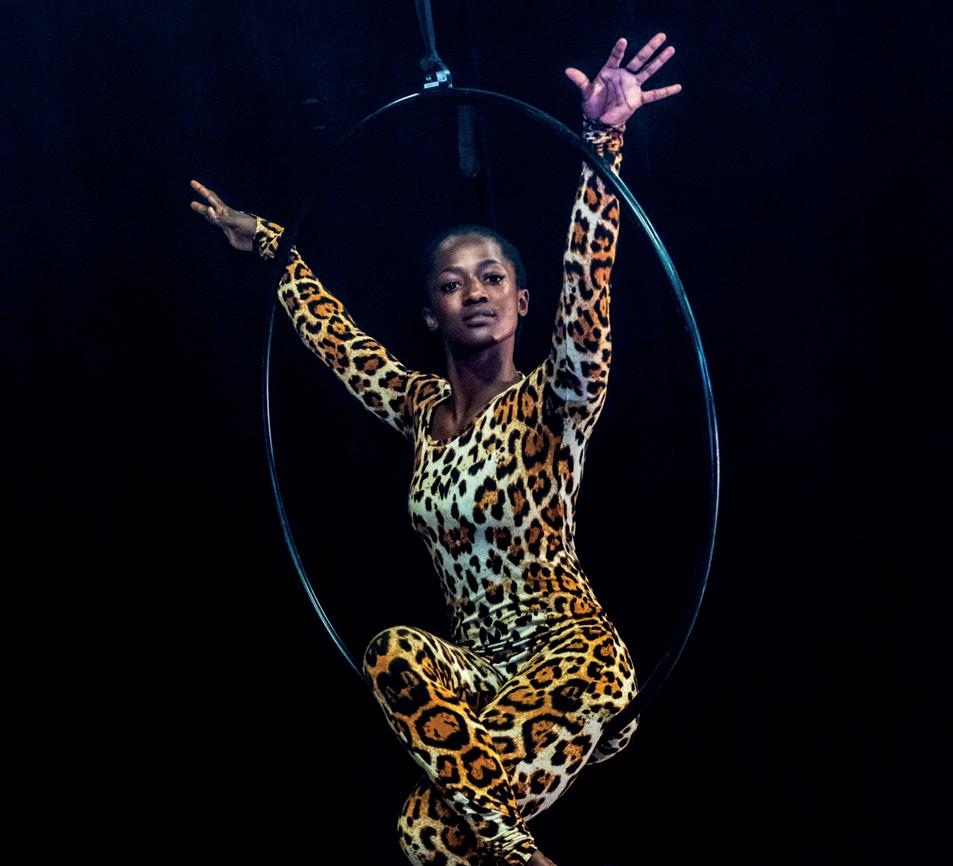


From acclaimed choreographer Alice Ripoll comes this piece about silenced cultures and magical disappearances, performed by the superbly-named Hiltinho Fantástico.
n Assembly Dance Base, 19–24 August, 7pm.
Award-winning group Impermanence deliver a work about Mary Richardson, the suffragette who later adopted fascism as her go-to ideology. Six dancers get to the heart of this awful decision.
n Zoo Southside, 19–24 August, 7.25pm.


Ray Bradbury’s book about the temperature at which paper will burn is the inspiration for this intimate one-on-one multimedia experience from Japan. n C venues, 18–25 August, times vary.
From Spain comes this piece whose title is French for the English word ‘tied’, as three dancers take to the stage in order to seek a way towards freedom n Assembly Dance Base, 19–24 August, 2.30pm.

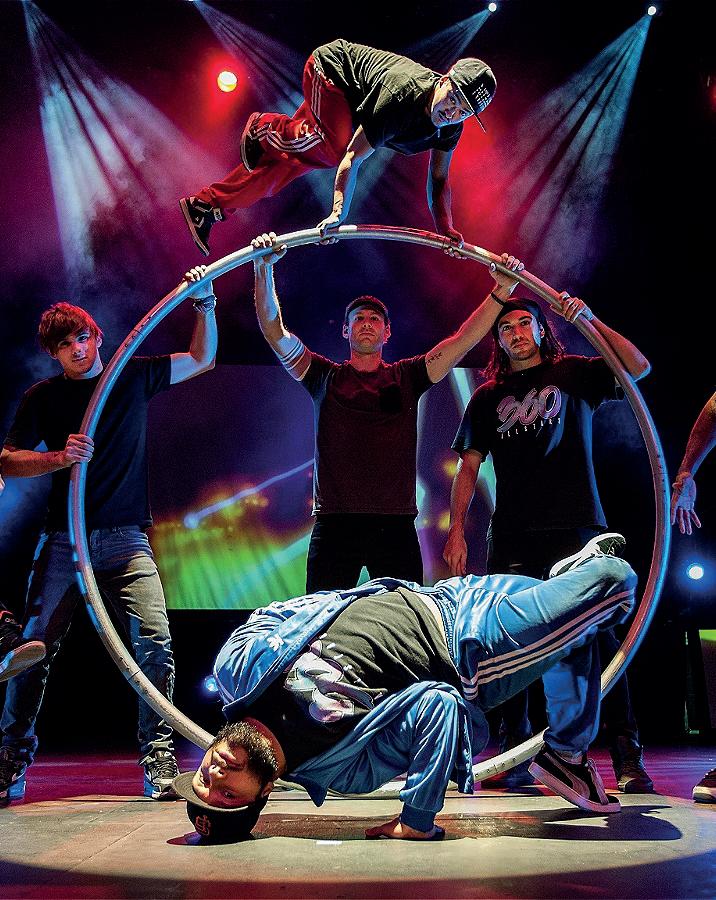
This multi-national troupe have a variety of skills including BMX flatlanding, breakdancing and basketball freestyling as they whip up a rotation storm.
n Assembly Hall, until 25 August, 2.20pm.

Acrobatic clown Arielle Lauzon plays the chaotic Nancy, a hostess with the leastess who is not quite ready to open up the party she’s invited us all to. Some of her pals will entertain you in the meantime.
n Underbelly Circus Hub, until 23 August, 1.05pm.
As part of the Beanbag Concert Series comes this reinterpretation of Johann Sebastian’s work, with hip hop and contemporary dance pushing its way into the classicalmusic realm.
n Usher Hall, 20 August, 7.30pm.
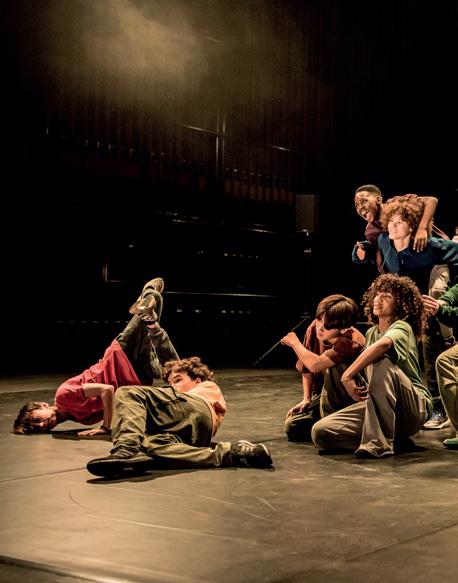



But not just any old James Bond. Our James Bond. The big man: Sean. Have a late morning fix of 007 featuring the Edinburgher’s run of classic spy capers spanning 1962’s Dr No (pictured) to 1971’s Diamonds Are Forever, with the likes of Thunderball and From Russia With Love all in there too. n Filmhouse, 15–20 August, 11am.
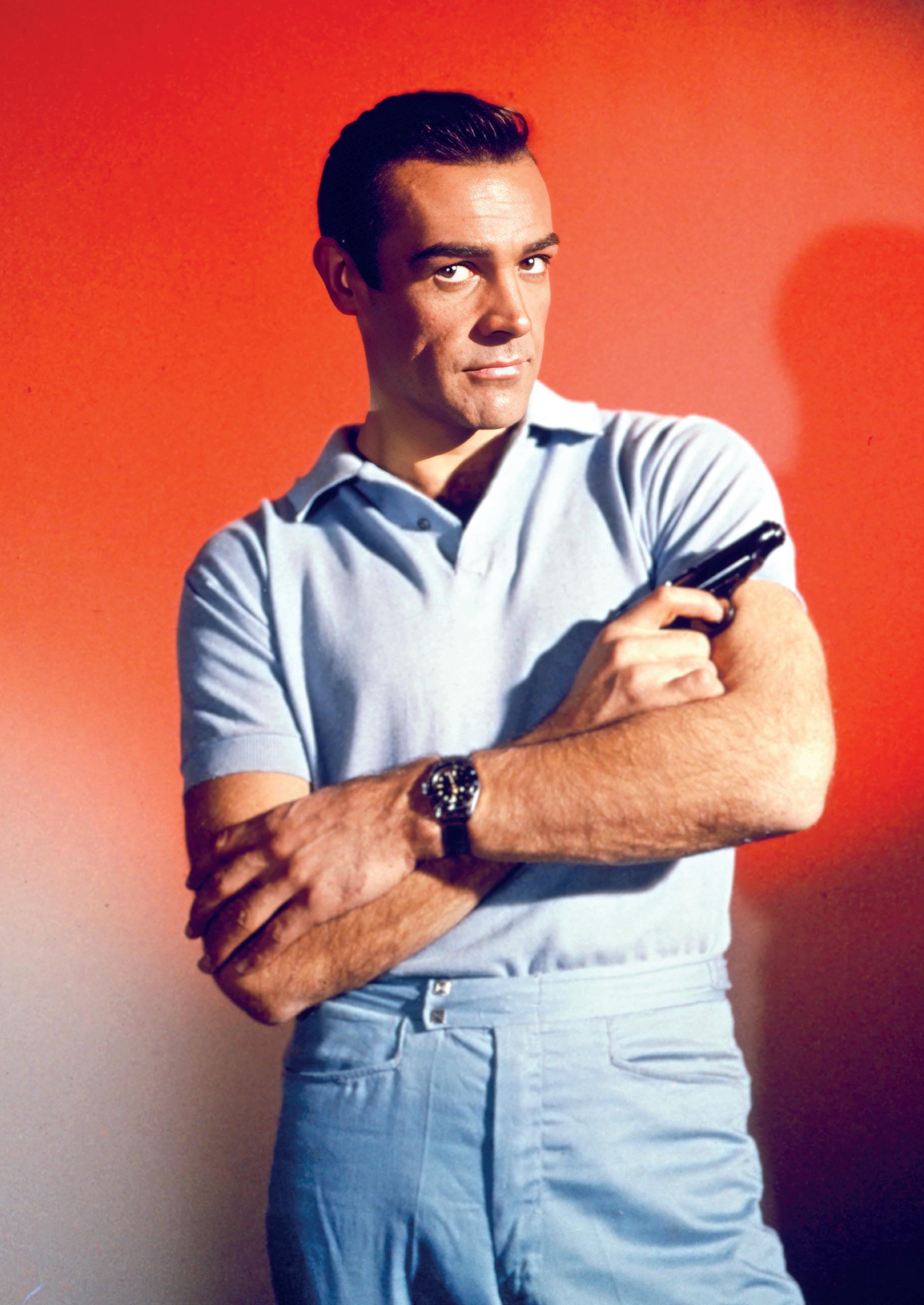





AThe daring director of Red Road, Fish Tank and Bird is heading to Edinburgh to talk about her career. Kevin Fullerton takes a deep dive into what makes Andrea Arnold’s back catalogue both bleak and deeply human
ndrea Arnold isn’t interested in welcoming you into her character’s world; she wants to send you crashing headfirst into their mind. Her camera doesn’t trail behind its protagonist or place them into a wider context with a grand, panoramic establishing shot. Instead, she travels alongside them in tight close-ups and (her past two films notwithstanding) an even tighter 4:3 aspect ratio, studying them with the familiarity of an attentive friend, bolstered by the sturdy poetry of her perennial cinematographer Robbie Ryan.
Aspect ratios are key to how Arnold thinks about her intimate character studies, which include international successes like Red Road, Fish Tank, Wuthering Heights, American Honey, Cow and, most recently, Bird. ‘It makes [my characters] really important,’ she said of 4:3 in an interview with Filmmaker Magazine. ‘They’re not small in the middle of something. It gives them real respect and importance. It’s a very human frame, I think.’
Themes of respect and humanity are key to this English filmmaker’s oeuvre, which centre on lower-working class people negotiating through landscapes of economic depression and limited choices. It’s no coincidence that her career came to maturity in the mid-2000s, at a time when right-wing papers began a campaign against hoodies, ‘chav’ became a common pejorative, reality shows like The Scheme or Benefits Street portrayed the working classes as scroungers, and British thrillers such as Eden Lake and Harry Brown preyed on the fears that youth culture was going feral. Whether deliberately or not, Arnold’s early features were a rebuttal to the classist sentiments of the time. Alongside her peers Shane Meadows and Clio Barnard, she repurposed the aesthetic of social realism to tell contemporary working-class stories that
foregrounded shared humanity more than the chasm of difference. Unlike well-meaning forebears such as Ken Loach, her troubled teens aren’t mere archetypes for political grandstanding but they are complicated, quite often wholly unlikeable, and usually muddling through a life that hasn’t sought fit to provide them with any opportunities.
Like Mia, the 15-year-old tearaway from Fish Tank, or Star from American Honey (her only US film to date, though one that bears all the hallmarks of her British works), her protagonists are interested in escape through money, fame or (as in Bird) the spark of imagination. Yet their fate is to be ferried from disappointment to disappointment by a society reluctant to acknowledge their existence and even less willing to offer a helping hand.
If Arnold’s filmography seems unremittingly bleak (and, at times, it is), then by the same token she revels in moments of passionate connection. We are trapped in the subjective view of her protagonists, who are usually reacting to an immediate moment rather than planning for a distant future that might never come. But when they meet someone significant, suddenly the screen seems to widen at the sight of a friendly smile or an intense stare. Lacking anything else, these are people scanning the horizon for a glimmer of connection. Arnold’s films don’t endure simply because of their incisive portrait of the UK’s most marginalised figures, but because they are about reaching across the psychic divide that separates human consciousness.
Red Road (retrospective screening), Cameo, 19 August, 11am; In Conversation: Andrea Arnold, Central Hall, 19 August, 2pm.




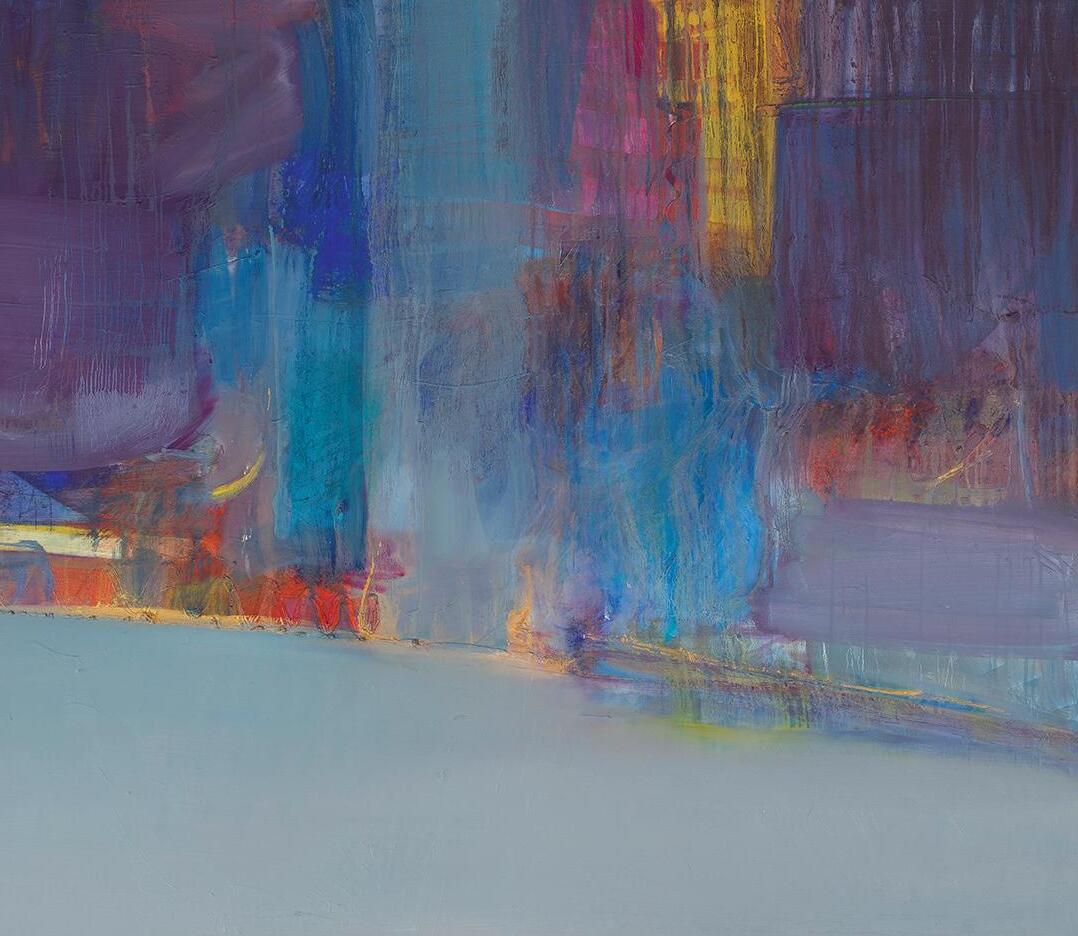











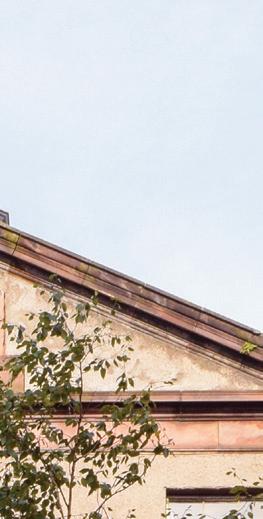

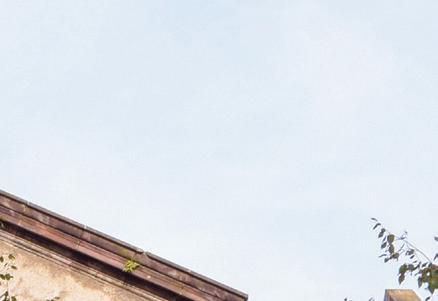


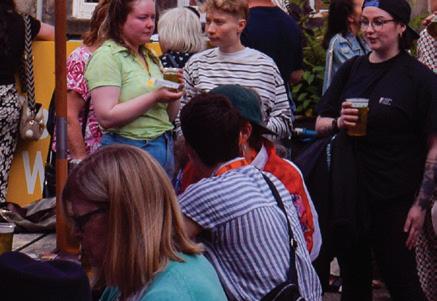



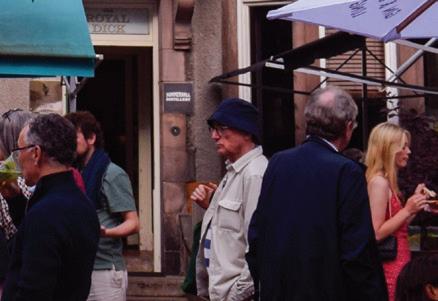


In the aftermath of sexual assault, a big gaping hole opens up in English professor Agnes’ life (Eva Victor, who also writes, directs and stars) and they become both metaphorically and literally stuck. Sorry, Baby unfolds in a non-linear fashion and only indirectly refers to the assault as ‘the bad thing’. Victor elegantly expresses the interiority of Agnes’ complex feelings with extraordinary emotional pitch in a sensitively handled reframing of the trauma narrative. It’s laced with humour, tenderness and huge respect for survivors.
Agnes cherishes their close friendship with Lydie (Naomi Acke) who appears in the opening chapter on a visit to the Massachusetts home they once shared while studying at university. It’s a cosy introduction in a film that flips through time to reveal startling events in an understated way, with precise composition and framing.
At one point Victor makes you feel like the air has left the room during an awkward reunion dinner with fellow graduates when someone mentions the person who assaulted them. Victor translates the seismic waves of a dissociative episode without a character even uttering a word. This is deeply intuitive and witty filmmaking, with a slow-burn intensity that perfectly matches the soundtrack provided by Lucy Dacus. (Katherine McLaughlin)
n Cameo, 14 August, 8.45pm; Filmhouse, 14 August, 9.15pm; Vue, 15 August, 1.15pm.
Shooting has just wrapped on a film about a slew of racist attacks on the Muslim community in Germany. The director, Yigit (Serkan Kaya), is thrilled with his work, but there is tension among the majority-Muslim crew about the final scene in which a real Qu’ran is burnt. When the film reel mysteriously vanishes, suspicions abound.
Marketed as a thriller, Hysteria is a rather unusual example of its genre. Most of the tension comes from the attempts of assistant director Elif (Devrim Lingnau) to hide the fact that she’s lost the keys to Yigit’s apartment, allowing for the film’s theft. The stakes never feel particularly high, however, and events that run through the film are occasionally difficult to follow.
Hysteria is still very worthwhile though. The central moral conflict, the burning of the Qu’ran and the questions it raises, is interesting, as almost every character is of Turkish descent with varying degrees of connection to Islam. They disagree not only on the burning but the entire existence of their film and its portrayal of the attacks. Hysteria recognises that the immigrant experience is not one-size-fits-all, nor does Islamophobia impact everyone in the same way. That’s what makes this so engaging despite the lack of genuine suspense. (Isy Santini)
n Cameo, 18 August, 4.15pm & 19 August, 9.15pm; Vue, 20 August, 6pm & 8.15pm.



‘A computer will not make a film as good as mine in 4500 years.’ This Werner Herzog quote acts as the launchpad for a knotted examination of generative AI, in which a machine-learning tool has been trained on Herzog’s body of work to write a murder mystery. Within a matter of minutes, the line between reality and deepfakery becomes impossible to distinguish as the meme-able Bavarian’s aesthetic is (somewhat) replicated. Who is a real actor and who is a synthetic recreation? Are the visual artefacts appearing on screen a product of machine learning or a deliberate red herring from director Piotr Winiewicz? Is the absurdist dialogue and baffling structure an artistic choice in the manner of F For Fake or a technical glitch?
Herzog’s oeuvre proves the perfect inspiration for these meditations, given that he’s forever seemed like an alien observing humankind from afar. His preternatural communication with the limitations of people is channelled within the convoluted plotting (which ostensibly concerns the murder of a man in the fictional town of Getunkirchenburg) and the anxious discussions about how the development of civilisation is not so different to the iterative advancement of technology itself.
Much like Herzog’s deepfake, the viewer becomes a detective scouring the screen for evidence of deception. Among its misdirections and unintentional tangents into surrealist humour, one thing becomes abundantly clear: the tectonic plates of reality are shifting beneath our feet. Whether that leads to the corruption or enrichment of art remains an open question. (Kevin Fullerton) n Filmhouse, 18 August, 8.45pm, 20 August, 7.15pm; Cameo, 19 August, 7pm; Vue, 20 August, 1pm.
Cutting Through Rocks is a striking new documentary that captures one woman’s quiet rebellion in the heart of rural Iran. It tells the story of Sara Shahverdi, the first woman elected to the village council in her rural community. Co-directed by Sara Khaki and Mohammadreza Eyni, the film chronicles Shahverdi’s attempts to challenge patriarchal norms that pervade the very sand around her. She does this by fighting for the rights of women, teaching teenage girls to ride motorcycles and working to end child marriage.
Khaki and Eyni capture her resistance through moments of everyday perseverance. They approach Shahverdi’s journey with restraint and clarity, as the film patiently accumulates details that speak about the strength of a woman and her mission. Vast, open landscapes contrast with the suffocating scrutiny Shahverdi faces, emphasising the isolation of her path. Her courage lies in simply moving forward.
What sets Cutting Through Rocks apart is its refusal to frame Shahverdi as either a victim or a heroine. Her story is told with a raw honesty; no pity, no romanticism. There is pain, but it is almost nonchalant, interspersed with many moments of joy. The steady glimpses of smiles, shared laughter and small acts of big courage, all come together to give the film a deep emotional resonance.
Cutting Through Rocks is a layered, moving portrait of how the courage of one woman to claim her autonomy can set off a ripple effect, inspiring others and unsettling even the most entrenched of patriarchal structures. (Aashna Sharma) n Cameo, 18 August, 9.30pm; Filmhouse, 19 August, 12.45pm; Vue, 19 August, 6.30pm, 20 August, 3.30pm.


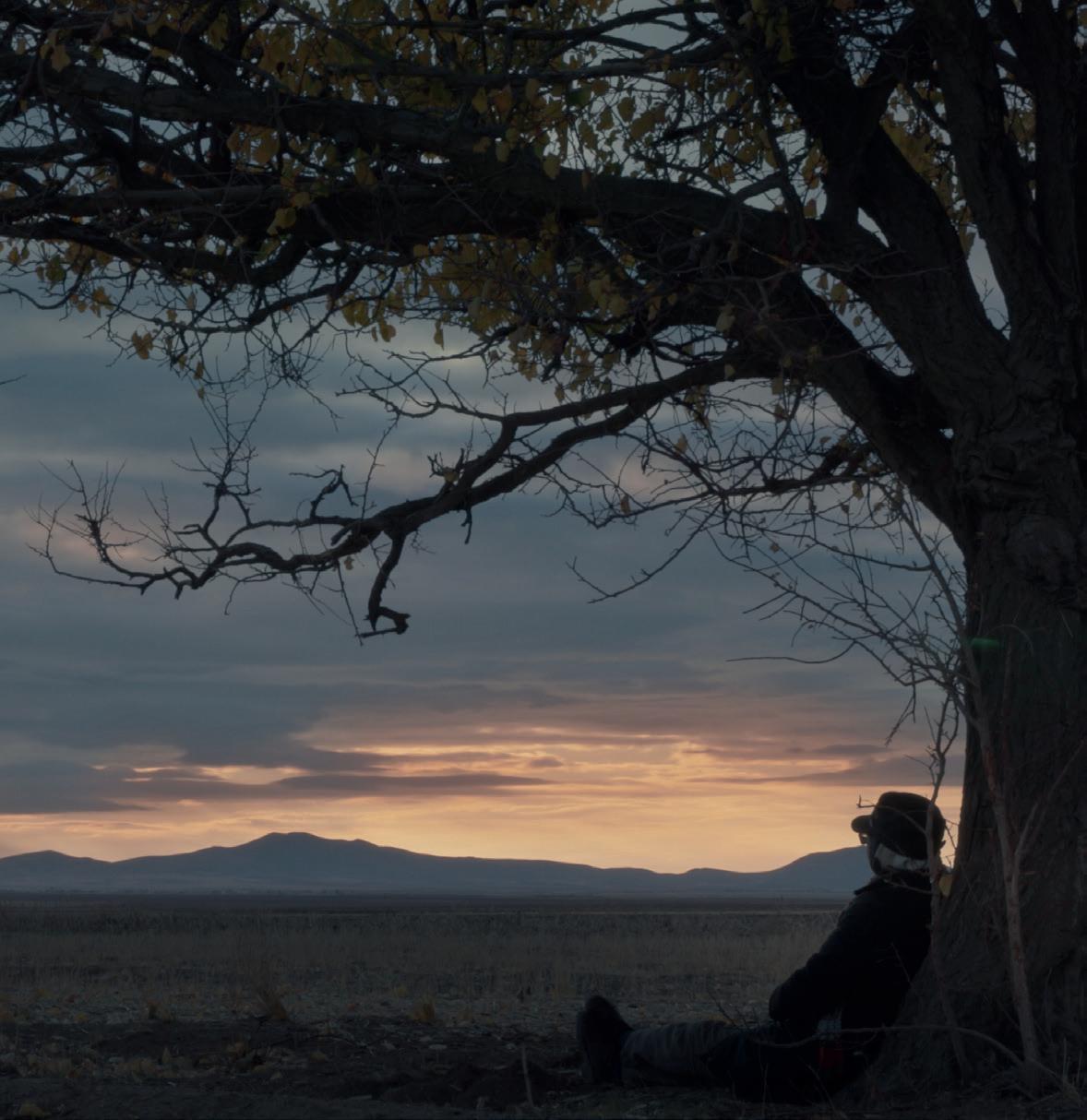
A sly stab at the true-crime genre, Charlie Shackleton’s film is like looking at one of those chalk outlines which cops once used to mark out dead bodies. Except in the space where the corpse should be is a movie that never was. Originally, Shackleton planned a documentary based on the book The Zodiac Killer Cover-Up: The Silenced Badge by Lyndon E Lafferty, a cop who seemingly came into contact with the serial murderer who stalked the San Francisco Bay Area in the 1970s. When the family of Lafferty (who died in 2016) refused to grant the rights, Shackleton abandoned his project.
Yet having scouted locations, he refused to let it go; and so here he crafts a mock-doc of sorts, visiting the spots where he would have filmed and explaining to the viewer with droll voiceover just how the film might have looked. One particularly clever moment sees him conjure up a credits sequence, lampooning the all-too-familiar opening reels used by the streamers for their generic true-crime docs. Shackleton examines our thirst for grisly murders, and, if nothing else, it’ll pique your interest in the unsolved Zodiac case. (James Mottram) n Filmhouse, 15 August, 1.30pm, 17 August, 12.30pm; Vue, 15 August, 9.15pm, 16 August, 9pm.
A festival darling, Canadian writer-director Grace Glowicki’s lo-fi gothic comedy is a genuine Frankenstein’s monster, an arthouse curiosity/hybrid of weirdo student-film aesthetics, slapstick gore and oddball poetry. Dead Lover is the story of an unnamed gravedigger, played by Glowicki, a smelly, ‘fetid creature’ who seeks to break her cycle of pungent loneliness when she meets dubious poet Swimmer (co-writer Ben Petrie) after his sister’s funeral. When she gets word that Swimmer has become lost at sea, the gravedigger embarks on a mission to resurrect her lover and satisfy her own desires.
Opening with a quote from Mary Shelley, Dead Lover dives deep into a dank well of psychosexual imagery, with seeds, bushes and extremely extended digits. Despite a rather repetitive narrative, the moral feels hopeful rather than grim; when it comes to finding romance ‘never stop digging . . . maybe love is about digging deep’.
Dead Lover uses deliberately retro visual stylings, aggressive strobe lighting and dollarstore puppetry to create a seedy love affair that’s willing to delve into body horror and outright necrophilia. For obvious reasons, Glowicki’s gothic romance won’t be to everyone’s taste, but it’s a promisingly offbeat and original piece of dark gallows humour. (Eddie Harrison) n Cameo, 18 August, 11.55pm; Vue, 19 August, 4.15pm; Filmhouse, 19 August, 8.30pm.
















Mark Cousins talks to the iconic British producer about his glorious life in cinema, where he has worked with heavyweight directors such as Nic Roeg, Bernardo Bertolucci and Takeshi Miike.
Central Hall, 15 August, 8.30pm.
The heavily anticipated world premiere of Paul Sng’s innovative documentary on Irvine Welsh has a starry cast of voices including those belonging to Maxine Peake, Stephen Graham, Nick Cave and Michael Pedersen.
Cameo, 20 August, 9pm.
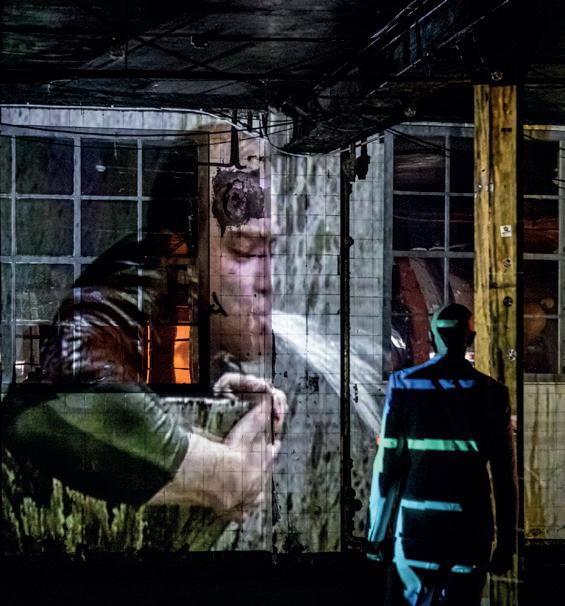

From German-French director Dominik Moll comes this crime drama which exposes institutional corruption after a civilian is mysteriously injured during a riot in Paris.
Filmhouse, 15 August, 4.15pm; 16 August, 5.30pm; 19 August, 6.15pm; 20 August, 11am.
If a feature-length lm is just too much for you right now, get along to one of these events as a whole host of compact but bijou animations are screened.
Cameo, 16 August, 10.30am; Filmhouse, 19 August, 3.15pm; Vue, 19 August, 9.30pm, 20 August, 3pm.


Sam Riley stars as a bored tennis coach whose life of post-work hedonism is turned upside down when he meets a troubled family.
Cameo, 15 August, 5.35pm; Hawthornden, 16 August, 3.30pm; Filmhouse, 16 August, 8.15pm; Vue, 17 August, 3.15pm.

A dark comedy set in New York, its story of spite and envy revolves around a struggling writer who meets a socialite at a lavish party.
Filmhouse, 15 August, 9.45pm; Cameo, 16 August, 9.15pm; Vue, 17 August, 3.30pm; Hawthornden, 17 August, 8.45pm.
Chosen by lmmaker Kevin Macdonald, this Palme D’Or winner of 1958 is a visceral examination of the impact WW2 had on the Soviet psyche.
Filmhouse, 17 August, 11am.







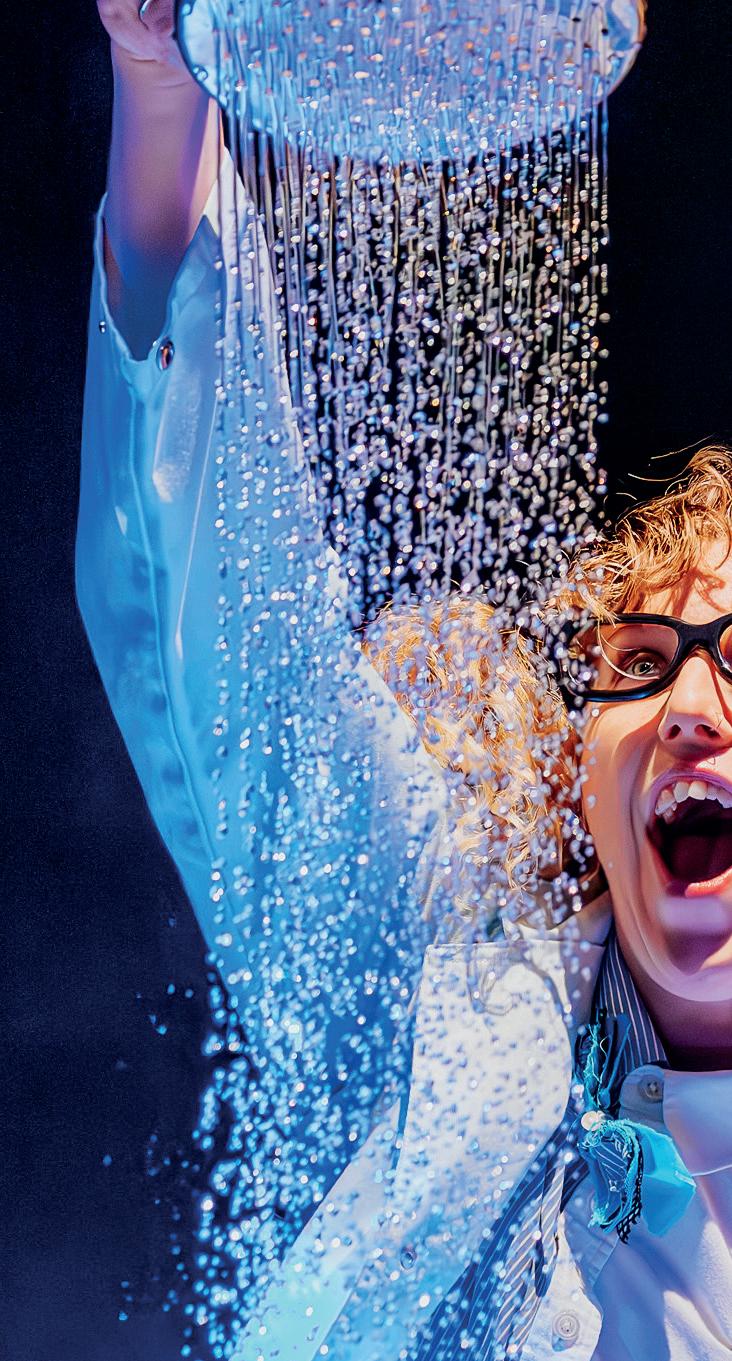
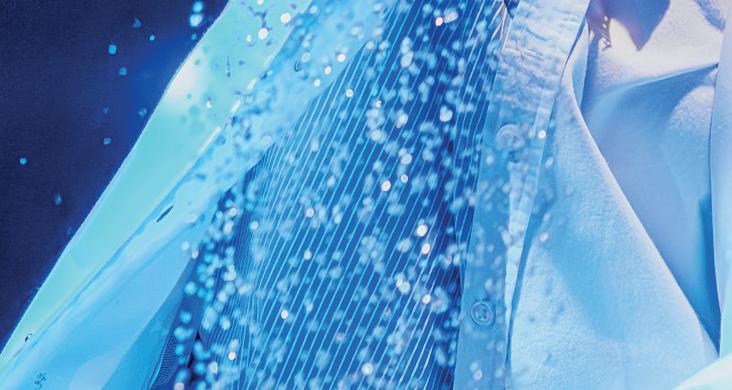
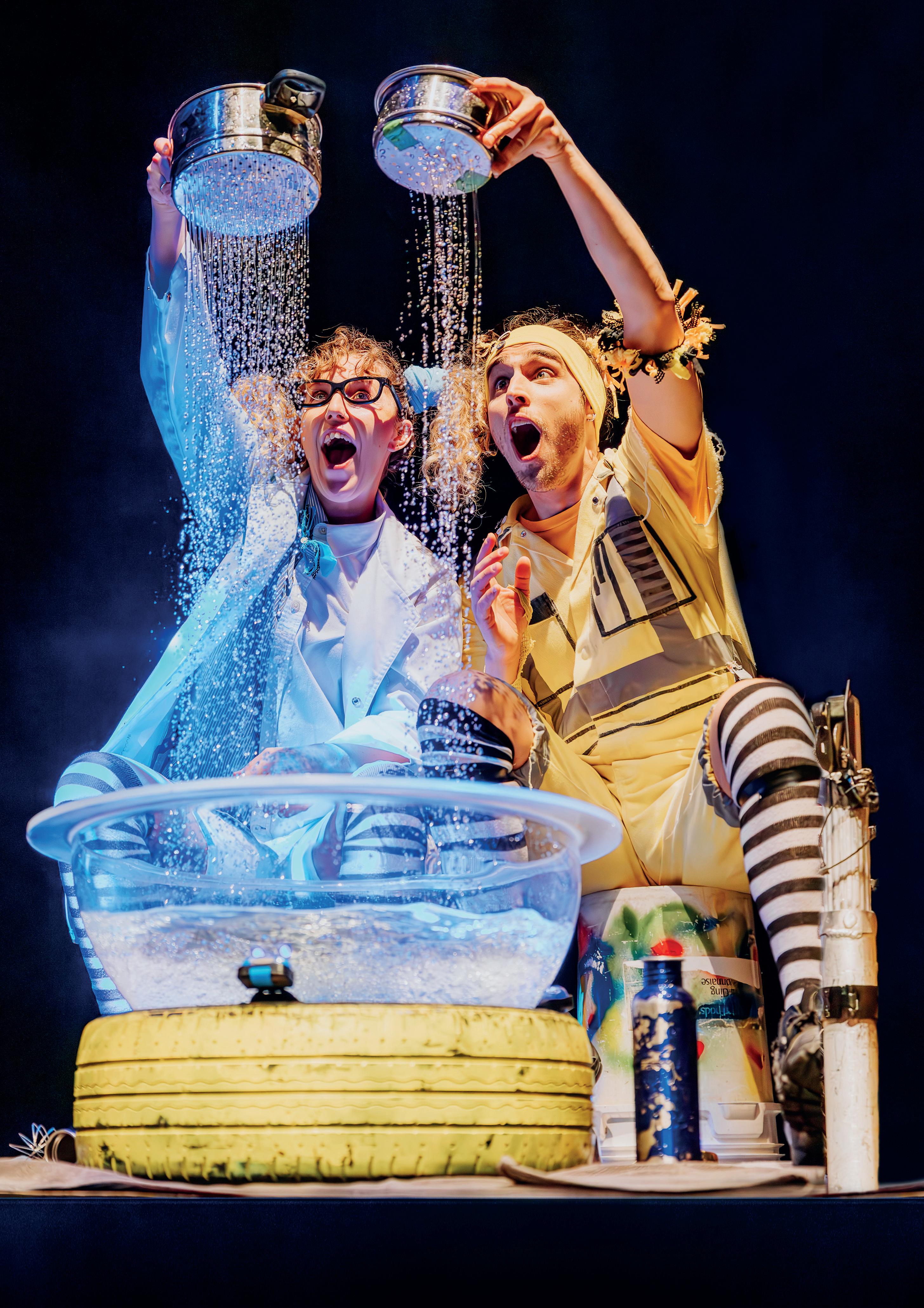
Four curious individuals team up with a mysterious recycling machine to gather up a whole heap of rubbish and turn it into music. Junkyard Beats is the ideal name for a company who make shows about sustainability while never forgetting that a key way to educate kids properly is to make learning fun. Assembly George Square, until 24 August, 1.50pm.
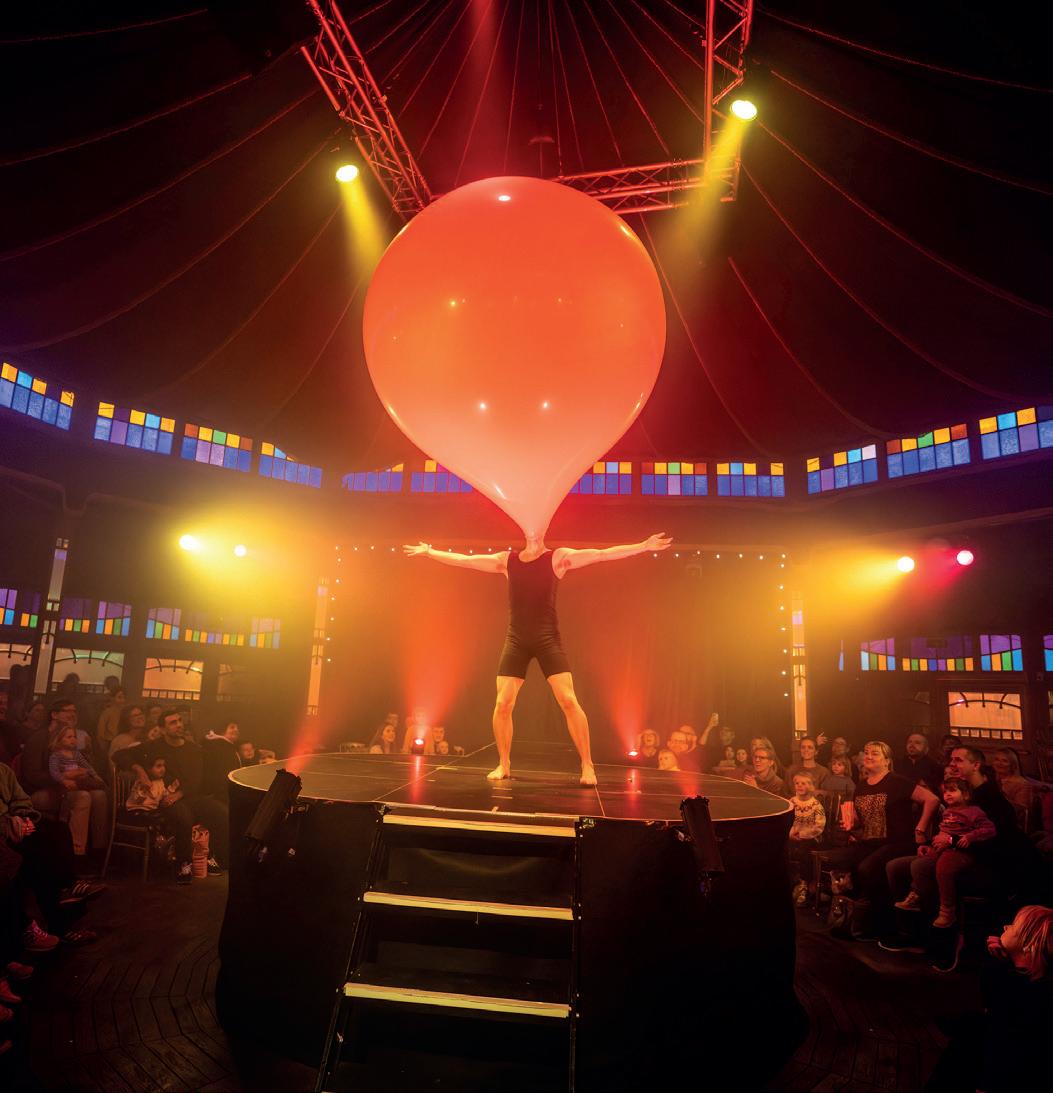

There are plenty of kids’ shows at the Fringe that mix magic and science, but not so many mixing magic and history. And there can be hardly any which, on top of that, throw in feminism, queer empowerment and musical numbers, all in the space of an hour and five minutes. Rabbits Out Of The Hat is a new production from vaudevillian duo Norvil & Josephine (performing together since 2006) which aims high with its blend of conjuring, politics and narrative. Though it doesn’t always hit the mark, you have to admire their desire to entertain, educate and subvert.
Norvil is the classic Edwardian illusionist: top-hatted, moustachioed, commanding the stage and demanding his sister Josephine stay in her place as his spangly, corseted assistant. Only, secretly, Norvil dreams of being the bespangled one himself, yearning over a pair of pink sequinned tap shoes. Josephine meanwhile has joined the suffragettes and doesn’t want to play second fiddle any longer. It’s a wonderful concept for a magic act and I don’t think it’s a spoiler (in a kids’ show) to say that we do get there in the end.
However, between A and B the story feels muddled and underplayed, and the characters not quite fleshed out enough for the drama they represent. Still, the setting is sumptuous, the tricks brilliantly pulled off (a kid gasps as an antique table levitates) and the historical programme notes, covering pioneers in magic, votes for women and the history of top hats, are an added take-home treat. (Lucy Ribchester) Pleasance Dome, until 24 Aug, 11.35am.
There is much to love in this sweet kids’ show from east London circus crew, Revel Puck. Hans Christian Andersen’s classic tale gets a bouncy, modern makeover, performed by four impressive acrobats in bright, tie-dye boilersuits. Will ‘ugly’ duckling Lou ever find a friend? Come to think of it, says Lou, is it still ok to call someone ugly? Will Presley the tortoise ever become a champion sprinter? And how does the performer spinning fast upside down on that giant hula hoop not crush their fingers?
The tale is told through dance, circus skills and music; classic tunes from The Proclaimers and Gloria Gaynor go down well with the grown-ups, as does the Pink Panther theme during an adventure story bit about pirates and secret agents. There are featherlight routines on aerial silks and flying trapeze, all under the big top (or ‘chapiteau’ as we learn it is called in French). The messages about friendships and embracing differences are sprinkled in lightly; babies will be busy appreciating the sight of a whole grown man disappearing into a giant yellow balloon while toddlers and older kids learn the plus sides of living a life slightly off-kilter.
(Claire Sawers)
Underbelly Circus Hub, until 23 August, 11am.
When a show features the word ‘explosive’ in the title and is performed by a man whose legal middle name is ‘Danger’ (Magnus Danger Magnus, who tells us this causes no end of trouble at passport control), you really ought to know what to expect. Think less CBeebies’ Maddie explaining how paint is made and more ‘let’s throw some smoking chemicals together and see what happens’. But for all the madcap antics Magnus stirs up throughout, he covers a huge number of experiments at a pace that never lets our attention drop.
This might not be for every kid; there are bangs, sprayed water, fountains of foam and lots of fire. But there are also thoughtful explanations of the science behind each experiment that hit a good balance between spelling out the facts and keeping it simple enough to digest. And Magnus’ awe at the magic of mixing chemicals is genuinely infectious. (Lucy Ribchester)
Assembly George Square, until 25 August, 10.30am.





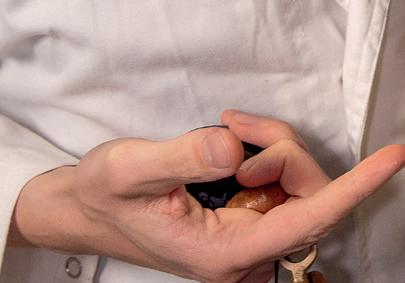



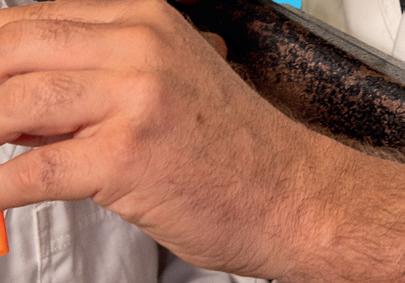








Ireland’s most notoriously complex book adapted for kids? Yes, James Joyce’s famous experimental novel Ulysses is cleverly retold here in 45 minutes by Galway theatre company Branar. Storyteller Helen Gregg does an exquisite job in her tweed trousers and beret, turning pages on three giant pop-up books, and moving cardboard cut-outs around a Dublin hospital, cemetery and library. She introduces Leopold Bloom, Stephen Dedalus and dozens more, slipping into Ulsterman vowels, opera song or drunken drawl, as required.
You can almost smell the pork kidney frying in butter and taste the many, many pints as Gregg guides us to mass, onto the beach and into Molly Bloom’s bedroom. You’ll See stops short of any sexy stuff from the original text (this is a kids’ show after all) but we get the gist of sleazy Blazes Boylan’s dishonourable intentions, and there are laughs when Gregg says wearily ‘he thinks he’s brilliant’.
The delivery is dense but playful, with smart point-of-view swaps from the beautifully illustrated cut-outs mirroring Joyce’s many narrative shifts. Recommended for adults who have faked reading the book but want to dive in, bookish kids with good attention spans, or Ulysses stans, ready for a lovely literary homage. (Claire Sawers)
Pleasance Courtyard, until 24 August, noon.
The Flying Bubble Show is a magical, high-flying spectacle that delivers exactly what it promises: a soaring performer and a dazzling cascade of bubbles. Maxwell The Bubbleologist transforms a simple childhood delight into a mesmerising, family-friendly experience that captivates audiences of all ages. Throughout the hour, Maxwell defies gravity, floating effortlessly around the big top tent, while conjuring up thousands of bubbles. This isn’t just bubble-blowing, it’s artistry, with ropes, intricate wands and even juggling of bubbles, all while flying around the venue. His genuine passion for bubbles is infectious, making the performance as joyful for the audience as it clearly is for him. The show seamlessly shifts from playful chaos to serene dream-like moments, with each bubble trick more impressive than the last. A visual feast that sparks wonder and nostalgia: pure, bubbly delight from start to finish. (Robyn Bell)
Underbelly Circus Hub, until 23 August, 3.10pm.
You’re An Instrument! is a surprisingly deceptive children’s show. Beginning with a pair of boffins explaining their research, it takes an abrupt turn for the wild when an audience volunteer swallows a pill and becomes capable of making sounds simply by moving. Amid raucous audience interaction, kids are invited on stage to shake, rattle and roll objects, generating a spontaneous improvised jam that ends up somewhere between a riot in primary school and musique concrète.
By the time the scientists admit they were cheating (they would never take untested pills to make music), the audience have been involved in experimental music, indulged in the joy of making fart sounds into a tune, and engaged with the potential playfulness of electronic noise manipulation. The last third of this show reveals its trickery: although the secret cannot be revealed outside of this venue, their apparent magic is the application of rigorous science. Explaining how it all works only adds to the mystery and fun, and the crowd are invited to join in for one last session.
With the scientists pitching their delivery to a younger audience, the show strikes the right balance between education and play, and even if the action does descend into unfocused chaos in its middle, they pull it back well with their explanations. Tipping the hat to both the importance of scientific seriousness and messing about for the sake of it, You’re An Instrument! chases and achieves the elusive goal of a children’s show that’s neither patronising nor tedious. (Gareth K Vile)
Pleasance Courtyard, until 25 August, 10.30am.

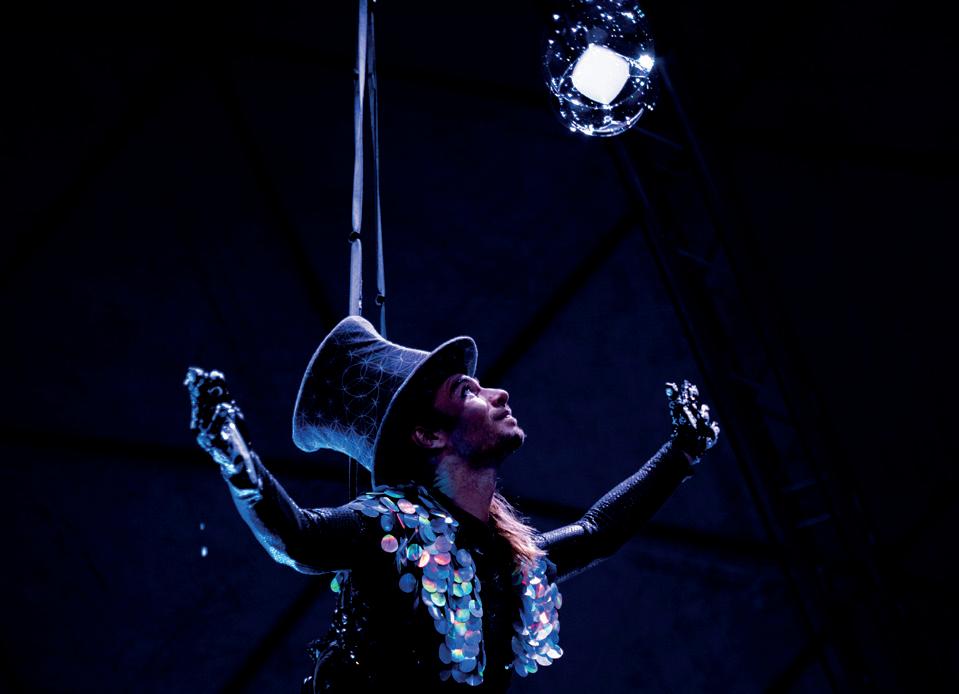

Tim Licata is on a mission to deceive, but not for nefarious reasons. His madcap mischief is built around impressive trickery and entertaining magic. n Little Plaza, until 24 August, 11.10am.
Join Darryl J Carrington as he unveils a very mysterious box and its extremely adventurous contents for a silent clowning celebration of playing.
n Underbelly Bristo Square, until 25 August, 11.30am.


All hail The Great Baldini as he regales us with tales he’s had with his magical dog Baldwin, all of which led up to the greatest moment of them all: trying to recreate Harry Houdini’s finest escape.
n Space Surgeons’ Hall, until 16 August, 3.10pm.
Once upon a time, James Campbell was one of the few comedy names in quality live children’s entertainment but he’s back and surrounded by a plethora of them. See the OG in action.
n Gilded Balloon Patter House, until 17 August, 11.30am.
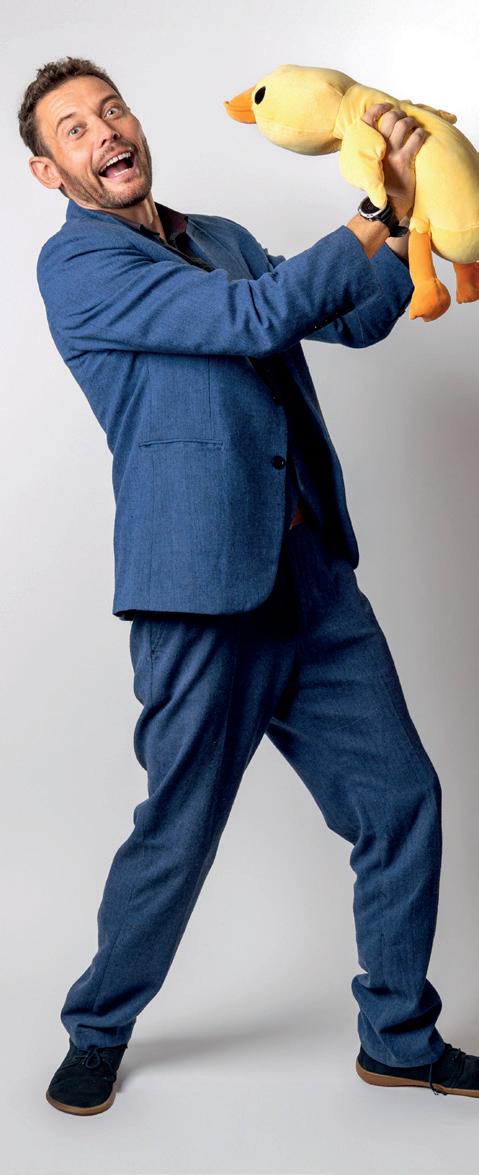

Games, storytelling and actual robots dominate proceedings here as the cheeky A.L.Ex aims to be the funniest slab of artificial intelligence across the entire solar system.
n Gilded Balloon Patter House, until 17 August, 11.40am.
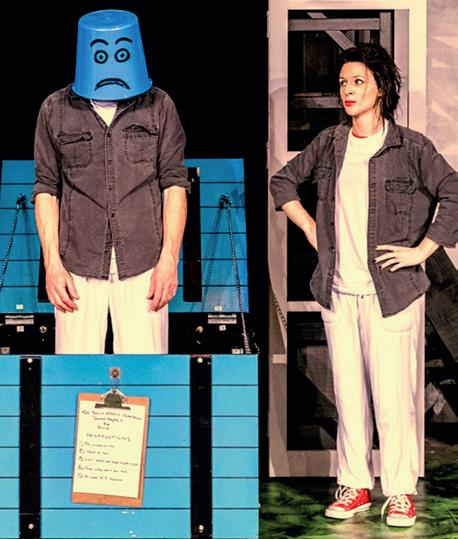
Ladders, confetti and brooms don’t act as they normally do in this slapstick circus affair from New Zealand’s Rollicking Entertainment set in a magician’s house.
n Assembly Rooms, until 17 August, 12.30pm.
He may be Under Pressure!, but the good Doktor won’t let that get in the way of him producing a blitz of science to examine the stresses of modern living. But in a fun way, naturally.
n Pleasance Courtyard, until 25 August, 1.40pm.
























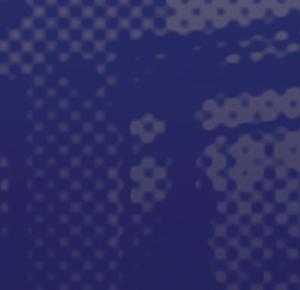





This very welcome addition to the Fringe calendar will hopefully be a permanent fixture in Augusts to come, though it will have to go some to match the inaugural event’s line-up. For the remainder of this month, the likes of Men Without Hats, Baby Lasagna (pictured), Thumpasaurus, Throwing Muses and Mercury Rev will be making the Angele cry with joy. n La Belle Angele, until 30 August.


‘Don’t let some pretty bitch take you down,’ was something Shakespeare never actually wrote, but perhaps might have if he’d been writing about the merciless ambitions flying around a highschool netball team. This comically fabulous reworking of Macbeth from Crash Theatre Co sees Lady Macbeth (Mac) desperate to be captain of the Dunsinane Hellhounds. But coach Duncan is having none of it, promoting instead a succession of girls whom Mac picks off in turn, spreading rumours about them or breaking their ankles (Tonya Harding-style), and when all else fails, just being an outright bitch.
This is The Scottish Play via Mean Girls, with musical numbers to boot. The whole thing could have descended into farce, resting on the incongruous lunacy of the setting against Shakespeare’s language, which is interspersed throughout. But Courtney McManus’ performance as Duncan, and her own sharp script, bring depth to make this a savvy update of the play’s horribly translatable themes. (Lucy Ribchester)
n Assembly George Square Studios, until 25 August, 4.15pm.
In this shaggy tale of self-discovery, Jay Eddy reflects on their journey to adulthood and place in American society today. They bring their story to life with strong storytelling skills and a mostly excellent electro-pop soundtrack of original material, and while it is easy to be swept along with Eddy’s passionate words and songs, an emotional build is lacking, with a climax that feels slightly unearned. The staging is simple, as Eddy has slimmed down the full band to just them with a guitar and some backing tracks. They easily hold their own onstage and never seem overwhelmed by the large venue or lengthy runtime of 105 minutes.
Eddy’s delivery is energetic and keeps things moving, sometimes pulling us into their anxious state but rarely giving us an insight into their feelings on any given subject. We get very little idea of the characters in their life beyond brief snapshots, and while we’re told this is a love story, the romance between Eddy and their partner is not established. Given the show’s name, perhaps the meandering nature of this story and lack of clear catharsis is actually the point. Still, given Eddy’s strong performance and wonderful songcraft, it would be nice if this journey took us somewhere. (Sean Greenhorn) n Gilded Balloon Appleton Tower, until 24 August, 1.30pm.
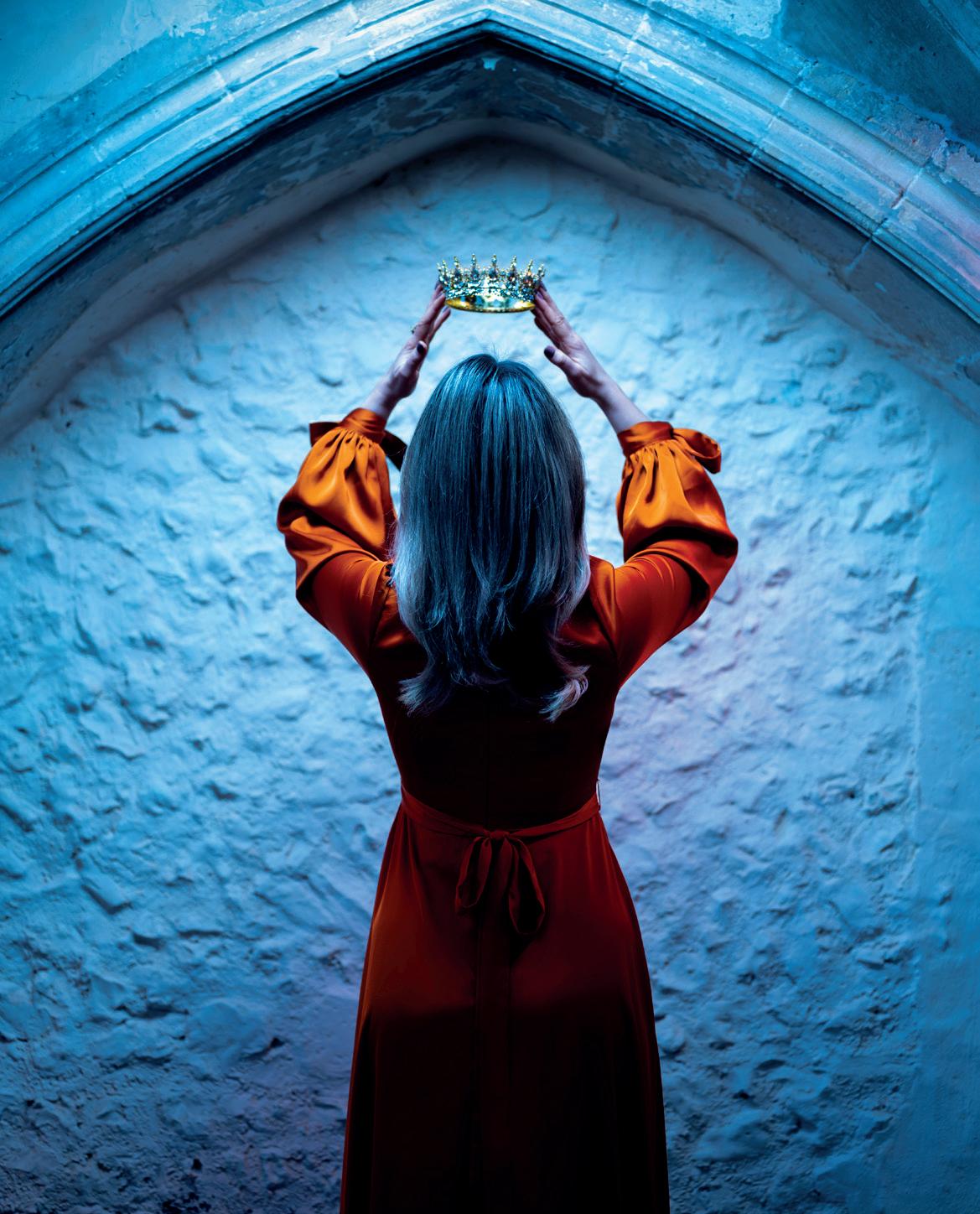

Despite its small cast and intimate venue, The Queen Is Mad is an impressively polished new musical from Tom James McGrath and Amy Clare Tasker. Maria Coyne plays Joanna Of Castile, older sister of Catherine Of Aragon and the titular madwoman. Her story is a cross between Jane Eyre’s Bertha Mason and Marie Antoinette: a disobedient woman deemed insane by her husband and father, stripped of power and locked away until death. Told through a contemporary feminist lens, Joanna’s designation of madness exposes the follies of the male ego when threatened by a woman in charge.
Brian Raftery and Robert Finlayson play Joanna’s husband and father, respectively. In a critique of male egotism, one turns out a drunkard, the other a murderous megalomaniac. Their relationship together is mirrored in a pair of campy Spanish courtesans, likewise played by Raftery and Finlayson, who provide some comic relief while also standing in for 14th-century tabloids. Their gossipmongering is a reminder that Joanna’s history, like the madwomen who came after her, has thus far been written by rumours.
The music is expertly performed, even if songs like ‘Rage’ (with its title sung repeatedly in the chorus) feel too literal. When these lyrics are coupled with Joanna’s first-person narration, the musical seems to hold the audience’s hand a bit too tightly, as if the writers worried the story would get lost in minimal staging and a three-person cast. Nevertheless, some stand-out songs such as ‘Locked Away’ allied to Coyne’s siren-like vocals do enough to distract from the show’s less subtle moments. (Evie Glen) n Zoo Southside, until 24 August, 4.15pm.
What is love? If your response includes the words ‘baby don’t hurt me’ then you’re exactly the right person for this world premiere of a new musical, at a Fringe which is proving to be fertile ground for the form. This one is a direct address show (Six-style) about the fight to save love in a world that doesn’t deserve it. Our heroes? The world’s greatest lovers (natch) in boyband form (obvs). Sign. Me. Up.
It’s true the format places some restrictions on plot and script; there’s no real set to speak of and the endless quest to find a new, youthful audience for musical theatre means some lines are so of-the-moment that they feel a little throwaway. The boyband device leads to more mid-song key changes than are strictly necessary, too. But these are minor carps: you’d have to have a heart of stone not to fall for this high-octane, feelgood show. The cast of five don’t leave anything in the tank; there’s slick dancing, gorgeous voices, tight harmonies, clear characterisation.
In true boyband style you’ve got to pick a favourite, which is an impossible task, but Jordon Bolden clearly relishes every second on stage, while Rickens Anantua’s gravitas grounds the whole piece. At its best, it’s smart and funny; reframing the lovers as influencers is an interesting concept, reminding us that we’ve always looked to others to show us how to love. Then again, love doesn’t have to be that deep. Like this show, sometimes it’s simply a pleasure. (Jo Laidlaw) n Pleasance Courtyard, until 24 August, 6pm.


Meet Mr Dellamort. Like his cinematic cousin in Meet Joe Black, his name barely disguises a personification of Death. The saturnine Mr Dellamort (Robert Tripolino) is the Grim Reaper himself in this new musical from MTTM Theatrics, but in an unexpectedly romantic narrative, maybe he’s not so grim; three strangers get letters inviting them to Dellamort’s secluded seaside manor on New Year’s Eve, but why?
Drugged-up Mina, self-absorbed diva Rhonda and leather-shorts-clad Barry all have their own designs on the host, unable to imagine his real purpose for them. The twist comes when they’re unexpectedly joined by demure normie Sue who Dellamort can’t help taking a shine to. With a spooky theremin soundtrack, director Abigail Zealey Bess’ lively ensemble production benefits from some energetic playing and strident, goth-rock showtunes. This feels like an entire Broadway show crammed into an hour, but such brisk ambition makes for a highly entertaining romp. (Eddie Harrison)
n C aquila, until 24 August, 7pm.
A slice of Americana that isn’t too sweet, Jackie!!! is a riveting musical comedy with a sharpwitted edge. We follow young Jacqueline Bouvier from humble dreams of becoming a journalist to stepping into the daunting role of US First Lady. Complete with iconic pillbox hat and pink suit, Jackie stumbles deep into the upper echelons of American society and doesn’t like what she finds. Navigating the reality of being part of one of history’s most influential families, she tries to keep her own dreams from being stifled. This struggle for fame, political power and independence is combined here with hilarious impersonations and that infamous rendition of ‘Happy Birthday’.
Written and composed by Joe McNeice, Max Alexander-Taylor and Nancy Edwards, Jackie!!! has all the drama of musical theatre mixed with a sprinkle of Saturday Night Live and a cast who look like they’re having as much fun as we are. The performances include satisfying mischievous political humour, a high note that’ll make you gasp, and catchy numbers that should leave the audience giggling to themselves for days. Hopefully this talented production will be back for another bite of the Fringe in years to come. (Rachel Morrell) n Gilded Balloon Patter House, until 25 August, 6.30pm.


A heavily anticipated Up Late with classical artistry clashing against leftfield experimentation for a performance that will explore both their individual and collaborative properties.
n The Hub, 23 August, 10pm.
If you love your glorious harmonies then this is for you as Jam Theatre deliver the hits from a decade that was far from shy in providing them.
n Greyfriars Kirk, 22 August, 2pm; Canongate Kirk, 23 August, 3pm.

Subtitled ‘A New Horizon In Scottish-Chinese Music’, this promises a tapestry of rhythms and melodies which bridge the gap between tradition and innovation.
n Space Surgeons’ Hall, 19–23 August, 6pm.


This year’s EIF closing concert zeroes in on an acclaimed oratorio, given a fresh clean by Edinburgh Festival Chorus and RSNO with Thomas Søndergård conducting.
n Usher Hall, 24 August, 7.30pm.
Finally, about time we had a Van Gogh musical and here it is with a focus on the tormented painter’s later years and the correspondence he had with his brother Theo.
n Gilded Balloon Museum, until 21 August, 9pm.

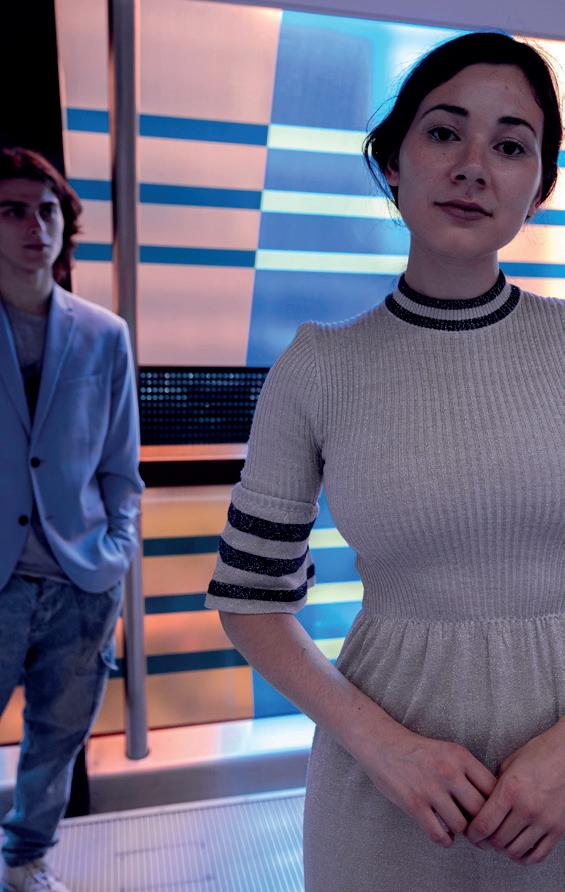
From Igor Labutin comes this immersive fusion of various influences to produce a musical which looks at what happens when seemingly innocent tools can become threats to humanity.
n Greenside George Street, until 16 August, 7.45pm.

The darker aspects of the suffragette movement come under the microscope in this musical set around the 1908 rally at Hyde Park. A tale of resilience and empowerment.
n Augustines, 18–22 August, 11am.



“You owe it to yourself to see this show”

It's a roller disco about immigration. Obvs.
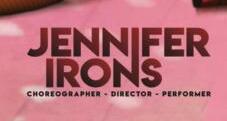
15:35 | 18 - 24 AUG ASSEMBLY GEORGE SQUARE: STUDIO TWO


































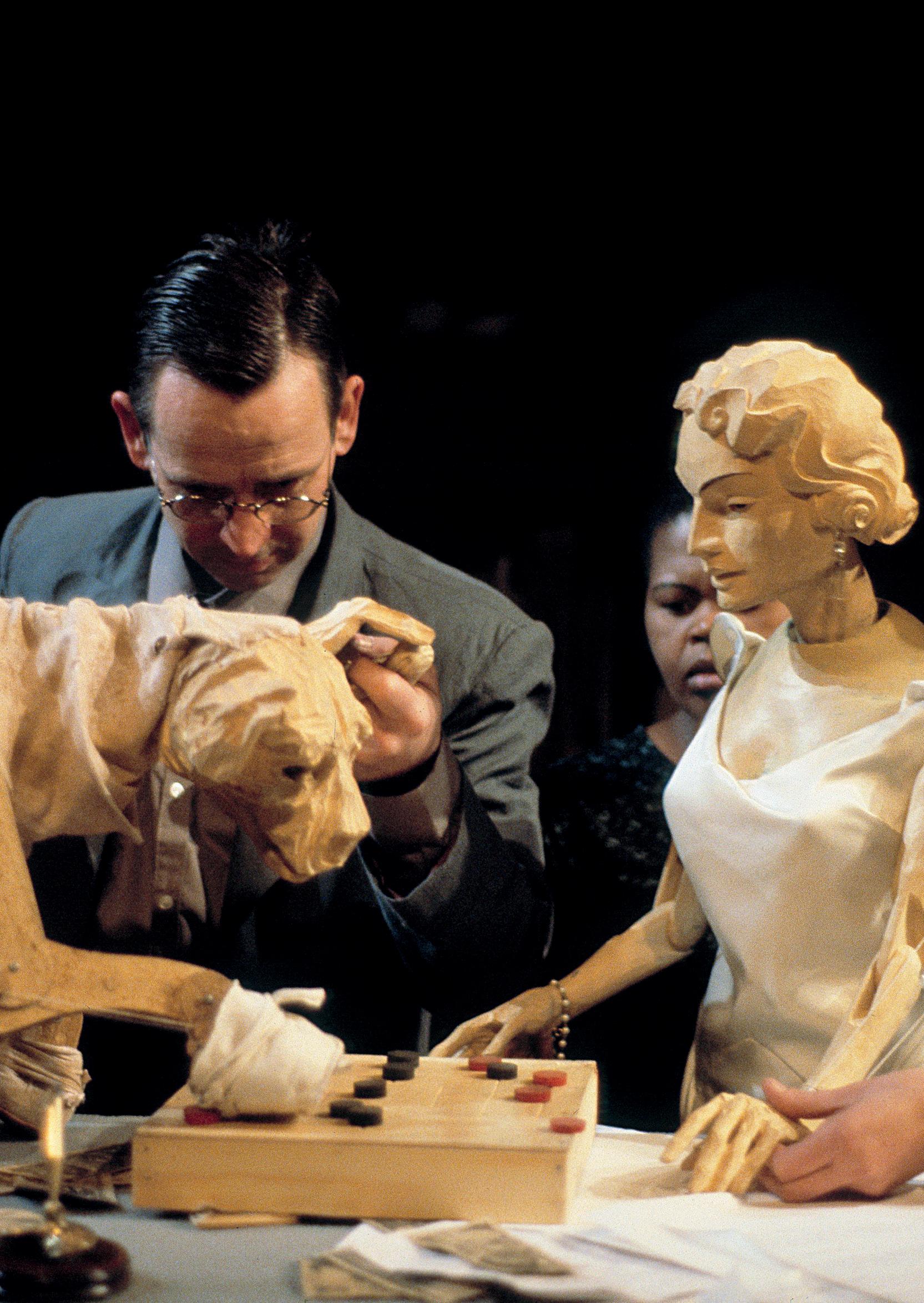
When William Kentridge and Handspring Puppet Company collaborated on a project in the mid90s, they most likely didn’t expect it to still be around 30 years later and as relevant now as it was back then. The ongoing debate about colonialism as well as the climate emergency reverberate across this tale of greed. n Lyceum Theatre, 20–23 August, 7.30pm.

It’s hard for one person to fill an hour. Especially on a Saturday afternoon in August, upstairs at Le Monde, trying to be heard over the Oasis widows ordering cocktails as Pitbull hums in the background. But Elis Pear has a story to tell, and she powers through, sharing her experiences as an autistic academic and sex worker navigating a lonely mental-health crisis, far away from her home in Brazil.
She’s charged, political and unafraid to share her experiences of racism and sexism, and with confronting introspection too. There are moments of raw emotion, real anger and real tears, but also flashes of self-consciousness. The sound effects sometimes distract, feeling obvious or mistimed, and the comically loud, weeping violins risk undermining some of the show’s most emotionally charged moments.
When it works, it’s candid and sharply observed. Bitter Baby is a meandering story of identity and self-discovery, told with passion, that could become something powerful. (Afreka Thomson)
n Le Monde, until 25 August, 2pm.
Feeling the floor vibrate with bass is the perfect way to start this delight of a show where the combined energy of grime, drill, garage and reggae is matched by the cast of Blaze FM’s incredible lyricism, charm and talent. Charting the events of the Blaze family as they run a pirate radio station, we travel through time. Beginning in the heady days of Y2K, they experience the events of recent history, including the gentrification of Hackney, rising knife crime, the demonisation of drill rap and the devastation caused by the Windrush scandal. With superb musicality, the cast perform in a variety of styles: grime, drill and nostalgic 2000’s garage riffs alongside classic reggae, interspersed with a variety of listener calls. But as each of the characters enjoys their own individual genre, they also combine as a unit in shared experience, history and a desire to speak out. From a party atmosphere to the depths of tragedy, the audience experience moments of joy, grief and resilience. Making an enthralling show that successfully transitions from celebratory highs to powerful emotion is a hard thing to pull off, but this piece of political theatre from The Big House receives a standing ovation. (Rachel Morrell)
n Pleasance Courtyard, until 25 August, 4.45pm.
‘Kurt Cobain was trans,’ declares Emma Frankland at the top of her show. She’s dressed as the rock icon as she says this. More accurately, she’s dressed as Cobain as he looked during Nirvana’s career-defining MTV Unplugged show. Her set is a meticulous recreation of how the television studio looked on that night, but this is more radical declaration than tribute act. ‘Kurt Cobain was trans,’ repeats Frankland, over and over in as many permutations as she can think of, changing Cobain’s pronouns to she/her and recounting her own obsession with grunge’s accidental populist. Frankland vividly anticipates pushback to her argument, imagining the disdain of transphobes at the idea or the reluctance of hyper-masculine music nerds unwilling to let go of ‘one of the good guys’ of the rock world. Soon, she’s unmoored herself from the MTV Unplugged gig altogether for an elliptically told story of her own life as a trans woman and the solace that Nirvana’s music brought her. That famous show in 1993 becomes a refrain in a larger, more abstract story, in which Frankland and Cobain’s lives dovetail into one and the grunge star’s spirit seems to coalesce with her own.
Contrary to Frankland’s insistence, the notion of whether Cobain was or wasn’t trans is not the main point here. Instead, this is a powerful meditation on how celebrities can be a north star for disaffected youth, how music is a shortcut to understanding, and how the trans community deserves more heroes of its own. (Kevin Fullerton)
n Summerhall, until 24 August, times vary.

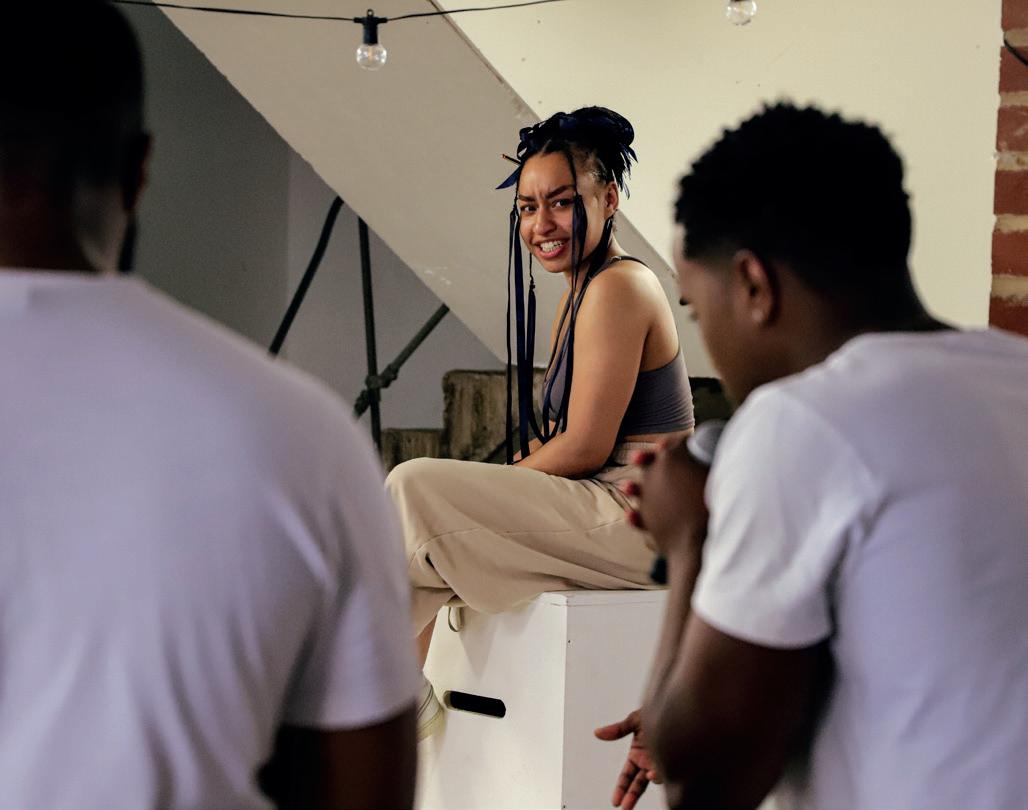
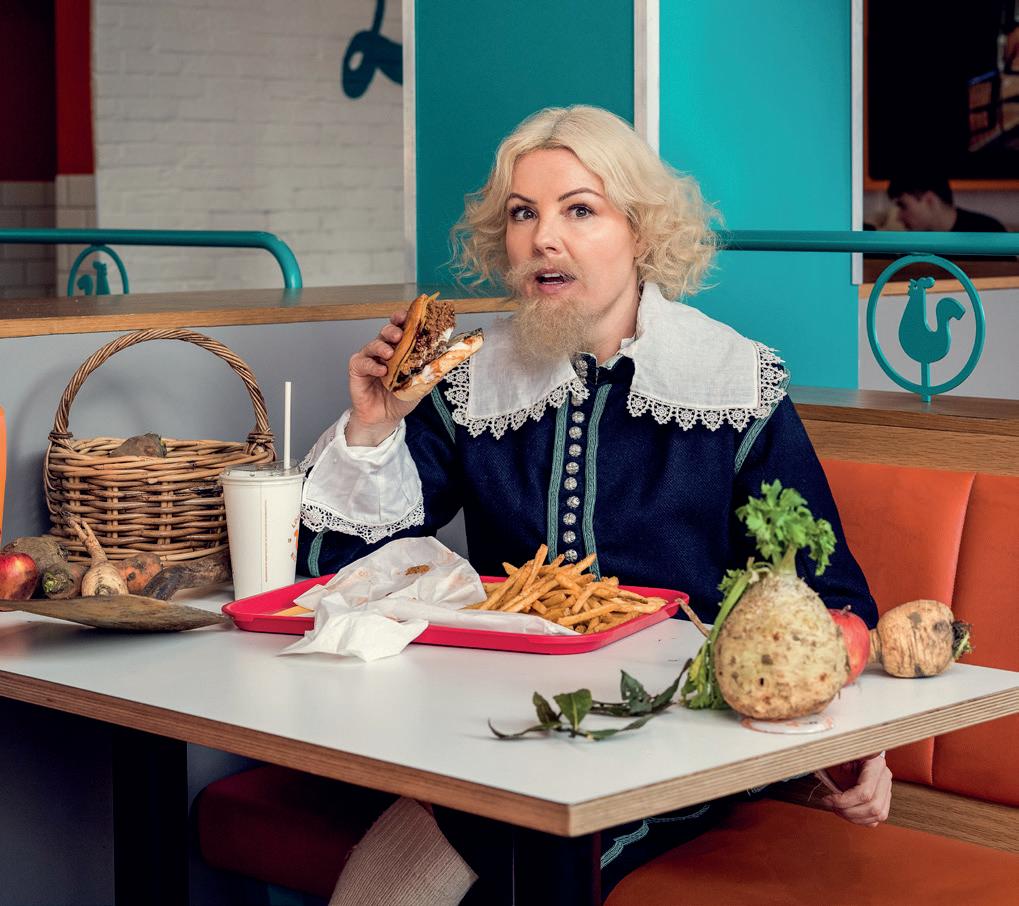
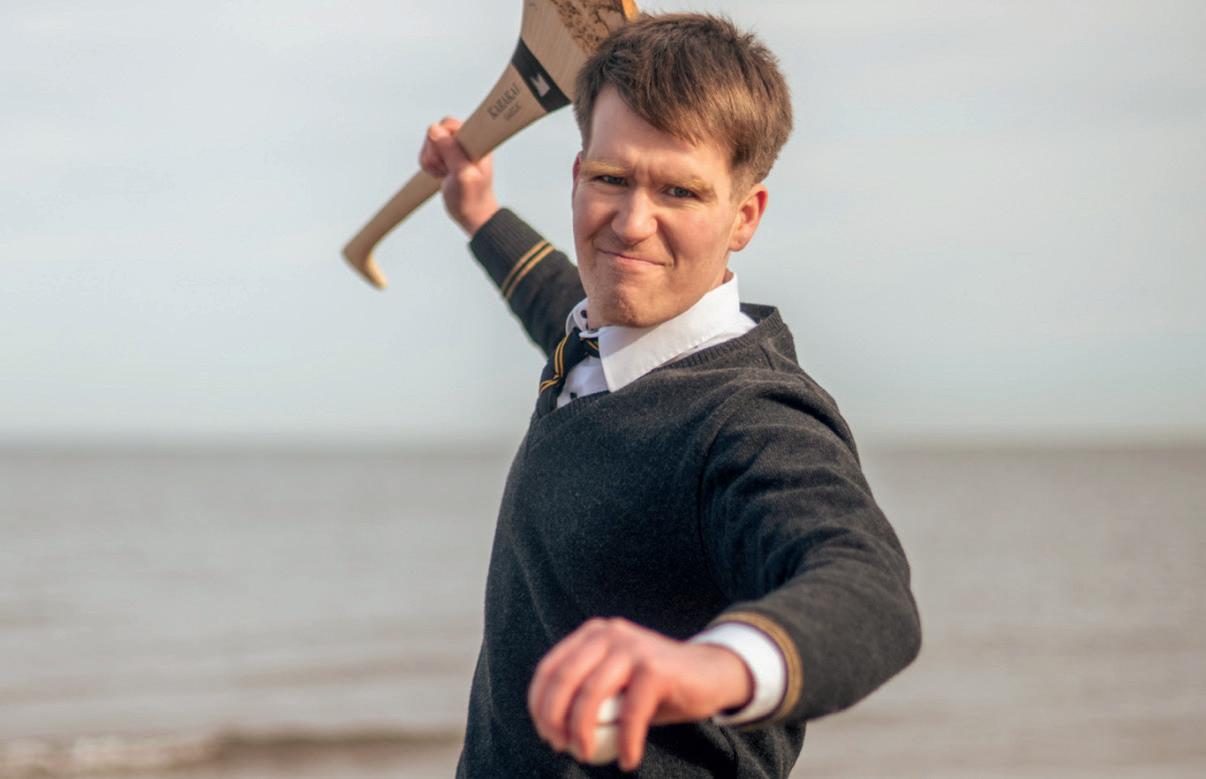
In a play that covers global terrorism, mass murder and heartbreaking loss, it is the image of a single earring finding its missing partner that carries the most power. Locating the minute and personal inside the cataclysmic sums up the essence of Fuselage, Annie Lareau’s three-hander elegy to the 35 friends from Syracuse University that she lost when Pan Am flight 103 exploded over Lockerbie in 1988. It is a deeply personal piece, born of student routines and everyday moments, all of which can be snatched away in a second by a combination of fate and human decision.
Lareau wasn’t on flight 103, simply because she couldn’t afford the £75 fee to switch and fly home with her best friend, Theodora Cohen. In a bitter irony, Cohen had suggested Lareau change her flight so they could be together for the journey, after Lareau had developed a fear of flying following recurring nightmares of planes exploding in the months before the tragedy. What Fuselage does sensitively and cleverly is shift the perspective of the bombing itself from the foreground to the background; instead it places the university lives of the victims centre stage. The events we are familiar with are present, charted in news broadcasts that punctuate the main action. Lareau also makes space to pay respect to the people of Lockerbie whose diligence and care enabled families to reclaim their loved ones’ possessions. But most important to the play are the moments that give the victims their humanity: laughter, arguments, bad jokes and borrowed jewellery. (Lucy Ribchester)
n Pleasance Courtyard, until 25 August, 3.45pm.
When Victoria Melody gets hold of an idea, she doesn’t let it go. After work about Northern Soul and dog shows, Melody’s latest obsessive outing charts her fascination with the 17th-century English Civil War. Having developed a particular interest in the Diggers, the band of agrarian rebels who rose up across several battles to argue for a fairer society, Melody joins a historical re-enactment society.
Unfortunately, she accidentally joins the wrong side, which is why she greets the audience dressed in the authentic uniform of a Royalist musketeer. This doesn’t stop her instigating a mini revolution of her own, as the local grassroots initiative where she is artist-in-residence rises up to ward off developers and town planners.
Melody is an all-too-human polemicist who pokes fun at her own failings as she joins forces with the community she helped create. Prime movers of these different strands are represented by large-scale photographs on sticks. Little victories come in the form of a discovery of a new species and a show of solidarity through the ranks.
Directed by Mark Thomas, Melody’s heartfelt and funny piece of real-life rabble rousing is part living newspaper and part civic intervention that becomes a moving and inspirational comic call to arms. (Neil Cooper).
n Pleasance Courtyard, until 24 August, 2.15pm.
Joey is a bad gay. He’s never had sex, and what’s more, he just can’t get into Drag Race But he’s determined to do something about it; the sex part, anyway. What follows is a chaotic journey as he tries to ‘get his hole’, while exploring why he’s holding himself back, in more ways than one.
Growing up in Galway, grappling with Catholic guilt and a fear of the local hurling lads, this is a whirlwind hour through his adolescent years. A very Gen Z coming-of-age story, it’s equal parts messy, cringey and tender, whether Joey is setting up his new Grindr profile or having awkward encounters with ghosts from his past. It could go deeper into some elements of what’s led Joey to become a ‘bad’ gay and occasionally veers into cliché, but overall it’s a strong debut from a charismatic Conor O’Dwyer that’s told with heart and sharp humour. (Lauren McKay)
n Assembly Roxy, until 24 August, 1.10pm.





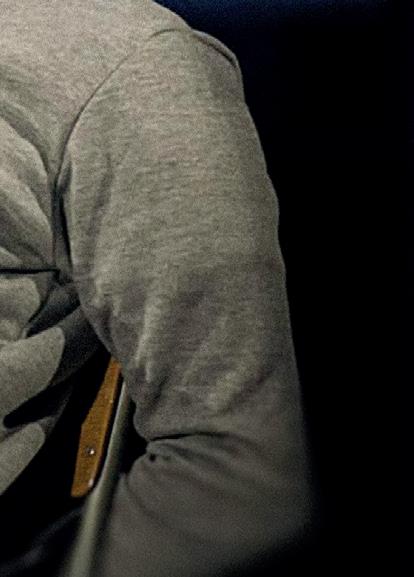




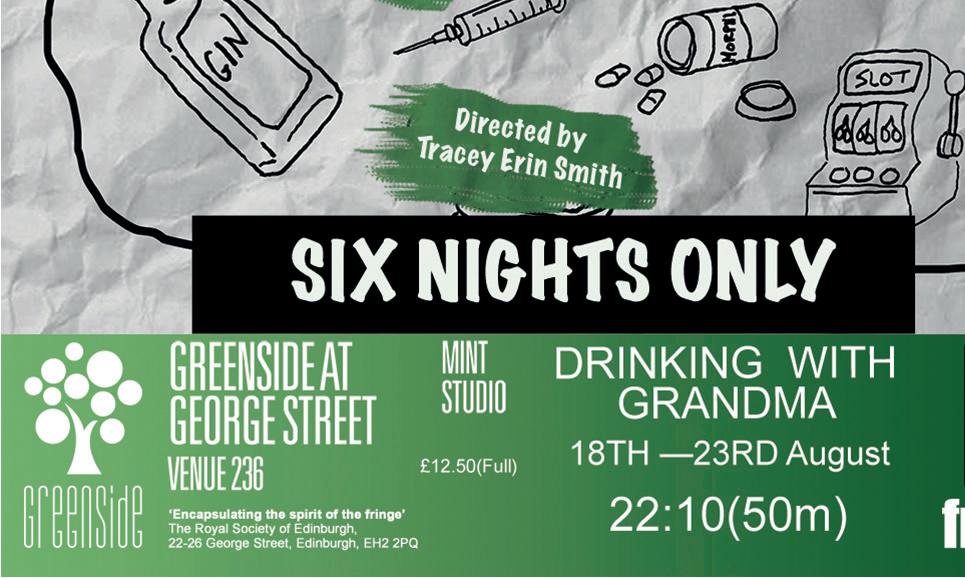
‘What a strange way to hold power?’ So says the Indian rebel strapped to a cannon and awaiting execution at the hands of the English officer before him. Colonial forces have quelled the 1857 Indian uprising, and now all that is left is the legend that follows. How that turns out, however, depends on who is telling the story.
As Niall Moorjani’s shackled upstart waxes forth on the circumstances behind their own personal rebellion, this is taken to farcical degree when Jonathan Oldfield’s pompous officer from the 78th Highlanders steps out of the audience. He then proceeds to effectively direct his prisoner to tell the story he wants to hear and denounce his cause enough to save his life. What follows as the two adversaries spar in this production of Moorjani’s own play is a back and forth that is part history lesson, part philosophical debate, and part plea for acceptance in the face of military rule.
This officer’s regiment is significant here, as he mentions the Battle Of Culloden and Highland Clearances in relation to British occupation of India and the events of Kanpur. Parallels with today hardly need spelled out. Moorjani presents the prisoner as a beatific figure in the face of Oldfield’s blood-and-soil Brit. Accompanied by tabla player Sodhi, Moorjani’s play looks to a hidden history in order to tell a tale that’s equally relevant to the present and the past. (Neil Cooper) n Pleasance Courtyard, until 24 August, 3.40pm; 18 August, 1.30pm.



Although Shake Rag Hollow deals with multiple themes (hidden family horrors, the pressure of small-town life, reputation and reality), it spends much of its running time setting up relationships before abruptly revealing its predictable twist. The final scenes attempt to race through recognitions, renewed regrets and reconciliations, weighty and dramatic moments that are clustered together and fail to fully land.
The slow unwinding of family history is played out from the return of a criminal daughter to her childhood home. She meets her own daughter for the first time before discovering the terrible actions that not only led to her unjust incarceration but defined her corrupted youth. Audio interludes taken from an old video that guide the listener through the local forest locate Shake Rag Hollow geographically, but its three characters place the script firmly in the intimate, domestic drama genre.
The script itself is, line for line, written with an ear for fluid and naturalistic dialogue, but the structure bunches the revelations too tightly. Performed with an understated assurance, and capturing the tension between public respectability and hidden wickedness, the production is a study in familial deceits and rural horror that suffocates its own dramatic potential. (Gareth K Vile)
n Assembly Rooms, until 24 August, 2.10pm.
Tucked into a corner of Edinburgh Climate Change Institute, with the organisation’s daily work going on around you, this venue creates a sense of nostalgia for the makeshift nature of Fringes gone by. It’s the perfect vibe for a solo show from emerging performer Faye Yan who is making her own work, trying new things and generally putting herself out there for a dozen people on a Tuesday afternoon. Just like the old days.
This otherwise oh-so-modern show explores ableism, racism, AI and homogeny through an immigration test set by a certain Nylon Tusk. AI is a hot topic: Yan cleverly allows the machine to expose itself through a simple Q&A format that lays bare its biases, underpinned by scenes showing how damaging it is to try to fit into the mould. These could be tighter and Yan would do well to trust her audience a little more, but it’s fine work from a developing artist who’s not afraid to experiment. (Jo Laidlaw)
n Zoo Playground, until 24 August, 4.30pm.
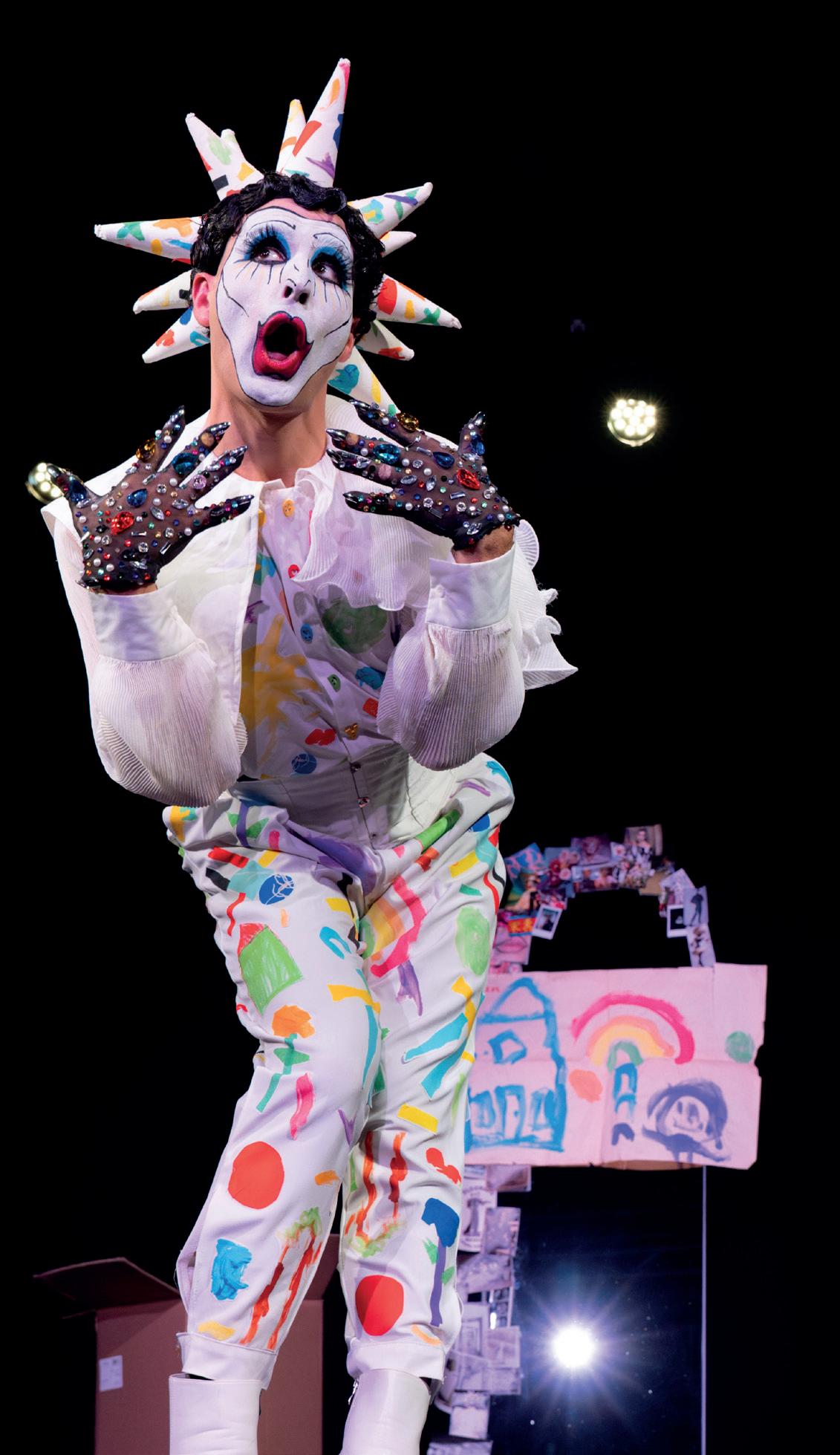
his is it. Their big break. Goody Prostate: a drag-clown landing in a new city, a fresh start with a debut performance. But just as it all seems to come together, hell unleashes as Goody comes to realise that they may have misinterpreted the venue and performance specs. Ryan Stewart’s Kinder, a spiralling maelstrom which thrusts an interrogation about children, the stories we tell them, books (the burning of) and parents, is a declaration. Melding flamboyance with fury and political bite with wit, Goody comes to realise this isn’t a comedic roast but a drag storytelling, complete with protestors.
From the opening moments, it’s evident the production’s visual design is more than embellishment; it is dramaturgy in motion. Lighting is wielded like a mood conductor, shifting from visceral bursts of crimson to spectral blues and, naturally, lavenders that stretch emotional resonance across the stage. Sharp, intentional fades and flash cues punctuate the storytelling with cinematic elegance. Costuming is equally arresting. Silhouettes skew towards the excessive, rich in texture and symbolism. Think headdresses laced with rebellion, gowns built for confrontation and make-up that functions as mask and manifesto; colour is always present but don’t for a second think its playful veneer is childlike.
With unabashed and necessary queer rage, Kinder speaks with incandescent poise on gender and generational trauma as Goody prepares for the reading, a searing, erudite speech tracing queer lineage through trauma and resilience. It’s articulate without being aloof, impassioned without slipping into polemic. The script pulses with frustration and love, offering a refusal to sanitise, while also refusing to perform suffering for the comfort of this room. Yet, there is performance, as the mediums of drag, theatre and clowning converge intimately; drag here is not an aesthetic garnish but the show’s engine. Satirical clowning and comedic beats break through theatrical gravity with cabaret’s signature mischief. Even audience interaction is deftly managed: moments of communion and disruption amplify the emotional stakes rather than dilute them. There’s an intimacy here that feels earned, not imposed.
Transitions are razor-sharp, choreography fluid but deliberate. Musical numbers riff on tradition while skewering it, shifting from torch-song gravitas to punk-inflected protest. Not a moment feels arbitrary: this is cabaret as refined fury, drag as academic thesis and theatre as resistance. A ferocious elegance in a queer-cabaret storm, Kinder garbs itself in sequins, but they cut deep. A riotous triumph.
Kinder, Underbelly Cowgate, until 24 August, 6.40pm.
Ryan Stewart is the ferocious heartbeat of Kinder’s articulate, impassioned howl of queer rage, a show whose every element is a triumph, says Dominic Corr

Gingham never looked so good. In She’s Behind You, Scotland’s pantomime powerhouse Johnny McKnight teams up with National Theatre Of Scotland to deliver a whip-smart, unapologetically queer celebration of the form’s rebellious roots. As Dorothy Blawna-Gale, McKnight is magnetic: rude, tender and riotously funny. Adapted from a University Of Glasgow lecture, the show blends educational reverence with theatrical flair. It exposes pantomime’s hypocrisies and gendered absurdities (even when McKnight himself has played a part), but always with love for the genre’s unruly dialogue, joyful chaos, radical accessibility, and ability to ‘see’ its audience. Farce here is craft, and camp is truth.
Layered and fearless, the humour dazzles while its political spine defends queer culture and women with clarity and conviction. McKnight’s commitment to these communities isn’t a subplot: it’s the heart of his work. Visually, it’s Christmas come early. Grant Anderson’s lighting bathes the stage in rainbow glitz, reflecting McKnight’s star power and the show’s spirit of reclamation. She’s Behind You isn’t just entertainment; it’s a thrilling reminder that pantomime belongs to the people, and a glittering, gutsy call to joy, proving that radical celebration can be revolutionary. A triumph of truth, tinsel and theatrical resistance. (Dominic Corr) n Traverse Theatre, until 24 August, times vary.
Mary Kate O Flanagan is a storyteller to her very fingertips. There’s something calming yet uplifting about sitting quietly to hear a story or two; all is safe and quiet despite (or perhaps even because of?) the noisy chaos of the Old Town in full Fringe flow bleeding through the window. Over an hour, O Flanagan shares five tales about life, death and everything inbetween. Threaded between are explanations about the power and importance of stories; it’s interesting information, but perhaps another story would have been a better way to go because, after all, it’s stories we want to hear.
Softly spoken O Flanagan has a natural warmth which helps her deftly balance emotion and humour. A cast of sisters, long-buried trauma, the lure of the big city, the safety of a father’s love, small-town dating on the apps: there’s no whimsy, no flights of fancy here, it’s all grounded in real life. And that’s kind of the point: our lives are big enough, complex enough and rich enough just as they are. This quietly contemplative hour reminds us that sometimes it’s not about shaping the story, it’s about letting the story shape us. (Jo Laidlaw) n Just The Tonic Mash House, until 24 August, 4.35pm.



Although it begins with a series of kitsch lip-synch routines that establish the hopeless romanticism of the protagonist, Jack Sears’ reworking of classical ballet kicks in when the darkness encroaches. While it does not delve deeply into Giselle’s story or themes, it works a seam of brutal, erotic choreography and captures the nihilism of frustrated desire.
The shift between romanticism and the bleaker scenes of sex and abjection is abrupt. By the time that Sears returns to the light, he and his ensemble of dancers have visited violent sex, self-hatred and the anonymity of the dancefloor. In contrast to the lip-synch numbers, the dances of descent are dynamic, despairing and disturbing. Through the pounding beat and nihilistic lyrics of EDM, the show becomes provocative and emotive. But abandon gives way to depression, and the choreography restrains the expansiveness of the dancers into taut, jerky movements. It is raw and the finale, which moves through a sound collage of homophobia and redemptive speeches, may re-introduce Judy Garland as an icon of hope but is overshadowed by the power of the journey into darkness.
The episodic structure is jarring, with perhaps a deliberate disjuncture between the tweeness of the first scenes and this subsequent viciousness. It leaves an uneven energy across the show; the finale’s optimism seems fragile but leans into both the continuity of gay experience and (unlike the protagonists of classical ballet) a sense of community for salvation against the forces of curdled desire.
(Gareth K Vile)
n Pleasance Courtyard, until 24 August, 3.40pm.


Ohio draws from the life experience of one half of indie-folk duo The Bengsons, reaching back to his youth, early experiences with religion and a reckoning with a hereditary condition that will one day render him deaf. Yet, the couple tell their story with a steady care that allows an affecting universal truth to shine through. How do we find hope in the frailty of our bodies and the echoes of our fathers? While some of the story elements along the way could be clearer, broad themes are skilfully introduced and a single dramatic moment manages to provide a truly moving emotional climax.
Music is a key component in the show: it’s how this pair met and it has defined their life. But the knowledge that one day Shaun Bengson will be unable to hear those notes gives it all a bittersweet edge. The songs themselves are beautifully ambitious yet intimate, characterised by gentle fingerpicking and looped vocals, with Abigail Bengson’s powerful voice either elevating or keeping them subdued as required.
This is a small performance about big themes: faith, death, birth and love. In less skilled hands it could all fall apart or get bogged down in mawkish sincerity, but the warm joy this duo emanate keeps things buoyant and make Ohio a triumph. (Sean Greenhorn) n Assembly Roxy, until 24 August, 3pm.
Shakespeare may not have been known for his samba moves, but that hasn’t stopped the Brazilian Cênica company from serving up his tale of star-crossed lovers in bite-size cabaret-style form. The fact that Romeo And Juliet is also the nickname for the post-dinner Brazilian snack of cheese and guava speaks volumes. Opposites attract.
Throw in the greatest hits of best-selling Brazilian crooner Roberto Carlos, aka ‘the king’ (like Elvis, Elton and The Beatles rolled into one, apparently, pop pickers) and the scene is set for a piece of serious fun that looks at conflict, cultural division and colonialism in a cross-language, cross-genre confection. With seven people on stage doubling up as the band in Fagner Rodrigues’ wild production, the result of this contribution to the São Paulo Showcase is a bilingual feast. It may start early doors, but it’s never too early to carnival. Just desserts all round. (Neil Cooper) n Summerhall, until 25 August, 10.35am.
The ‘project’ in the title of New Zealand company Half Trick’s raucous, improvisational take on Christopher Marlowe’s 16thcentury cautionary tale alludes to a different actor playing the tragic Doctor Faustus each night. Comedian Adam Larter has the dubious pleasure of the role in this performance.
Having never seen the script, Larter plays the part with wit and calculated abandon as he is cajoled, prodded and tormented by a trio of agitators (Courtney Bassett, Alex Medland, Moira Hamilton) and Faustus’ hellish nemesis Mephistopheles (director Caden Scott). The results are anarchic, frequently funny and very, very messy. How each new actor will approach the same material will be one of the show’s unpredictable strengths (Faustus inhabits a blank canvas on which the three furies literally do their worst) and the company skilfully direct our protagonist with cue cards, props and the most provocative of physical theatre to keep the story rampaging along.
Those with only a passing appreciation of the play might find things hard to follow in places (Elizabethan verse coupled with the general mayhem onstage will confuse some) but those on familiar ground will revel in the filthy, devilish fun. Larter does manage to get some of his own back during a hilarious invisibility scene, and this passage may well provide the most thrilling opportunity for improvisation. The Faustus Project is bonkers and bawdy in equal measure and stretches the phrase ‘game for anything’ to its limit. Just spare a thought for whoever is on clean-up duties. (Gary Sullivan)
n Underbelly Cowgate, until 24 August, 8.40pm.































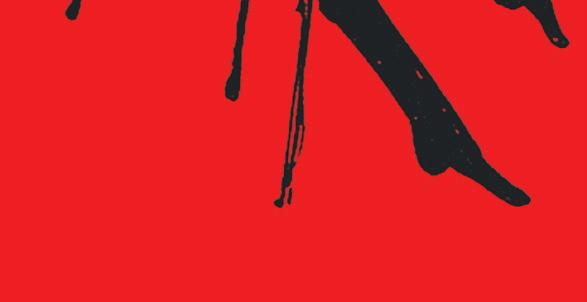













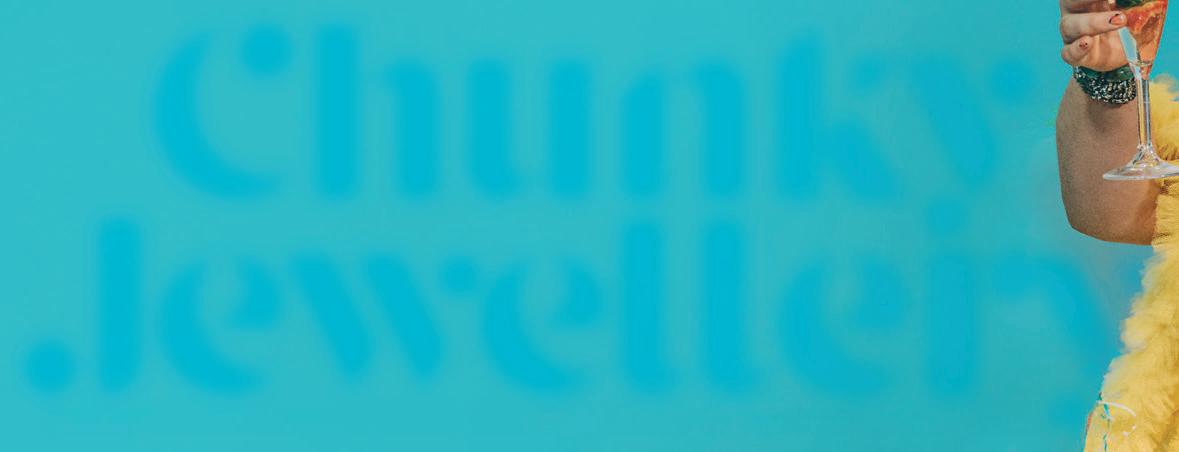







13:30 | 01 - 24 AUG
ASSEMBLY ROOMS: MUSIC HALL
























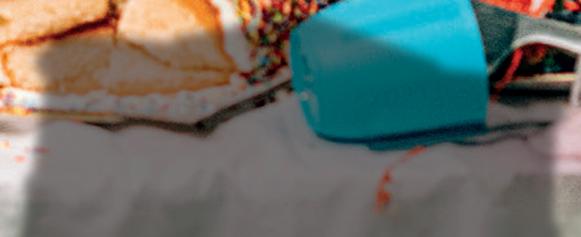






























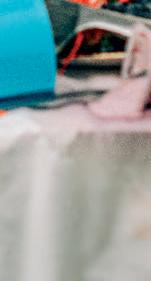










Two hundred years (give or take): that’s how long humans have had an idea of the effect of greenhouse gases on our planet. For centuries, and even today, scientists find opposition to their climate anxieties; particularly for Eunice, a female scientist in 1856, whose hypotheses around the greenhouse effect are disparaged as ‘amateur’. Flora Wilson Brown’s The Beautiful Future Is Coming is an ambitious, time-traversing meditation on environmental fears, womanhood and intellectual legacy.
Told through three interconnected timelines (past, present and speculative near-future), the play centres on female protagonists grappling with ecological collapse and their role in both resisting and documenting it. The concept is promising and, at its best, the production offers pockets of genuine poignancy.
However, much of the writing leans heavily on exposition, often telling instead of showing. There’s a tendency to presume audience alignment with its ideas, resulting in didactic moments that flatten complexity. Climate themes are introduced with sincerity but not always with the dramatic shape they deserve. Some of director Nancy Medina’s movement decisions and transitions between eras feel perfunctory, sacrificing emotional continuity for intellectual gesture. Earnest, intelligent and intermittently moving, The Beautiful Future Is Coming doesn’t fully realise its ambition. (Dominic Corr) n Traverse Theatre, until 24 August, times vary.
When Tom turns up at his dead boyfriend’s family farm, he gets more than he bargained for in Quebecois writer Michel Marc Bouchard’s play, adapted here through Brazilian company Cena Brasil Internacional’s mud-spattered production. While Tom’s lover’s mother Ágatha knows nothing about her son’s romantic life, his brother Francis is a brute who spars with Tom to create an unmistakable sexual tension. Tom becomes a kind of cuckoo in the nest before all hell breaks loose when a woman turns up claiming to be the dead man’s girlfriend.
While the tone of the psychosexual interplay in Bouchard’s work is decidedly Pinteresque, Rodrigo Portella’s production takes it into more unhinged territory on Aurora dos Campos’ set. With Armando Babaioff (who has also written the translation) playing Tom, the physical exchanges with Iano Salomão as Francis are delivered with furious intent, while Denise Del Vecchio’s Ágatha and Camila Nhary as the woman both get caught in the crossfire of a man’s world. (Neil Cooper)
n Pleasance EICC, until 24 August, 3.30pm.
Faye has not been dealt a kind hand in life. In control on the surface (especially in a darkly funny sexual encounter), she seems hardened and uncompromising. But as Ian Pattison’s play unfolds and the layers of Faye’s ugly upbringing are peeled back, we come to understand, and empathise, with the solitary woman she’s become. Witness to her father’s sickening drunken violence, victim of her mother’s exploitation that takes a particularly horrifying twist, young Faye’s future feels bleak.
In this powerful one-hander, Gail Watson brings a firecracker energy to Faye, capturing her ferocity and fragility. She imbues a character who initially appears to have more front than Porty prom with palpable vulnerability. Once we see beneath the surface, a more complex picture coalesces of a woman shaped by brutality, neglect and rejection who, despite some admittedly dodgy life choices, somehow finds a way to keep going.
Watson seamlessly (sometimes terrifyingly) flicks the switch between guttural pain and the black humour that leavens this script with much-needed light. Powered by her belter of a performance, when a chance of redemption finally comes for Faye in the form of another troubled soul, it’s a hard heart that wouldn’t swell with tearful pride. (Paul McLean) n Gilded Balloon Appleton Tower, until 23 August, 7.15pm.
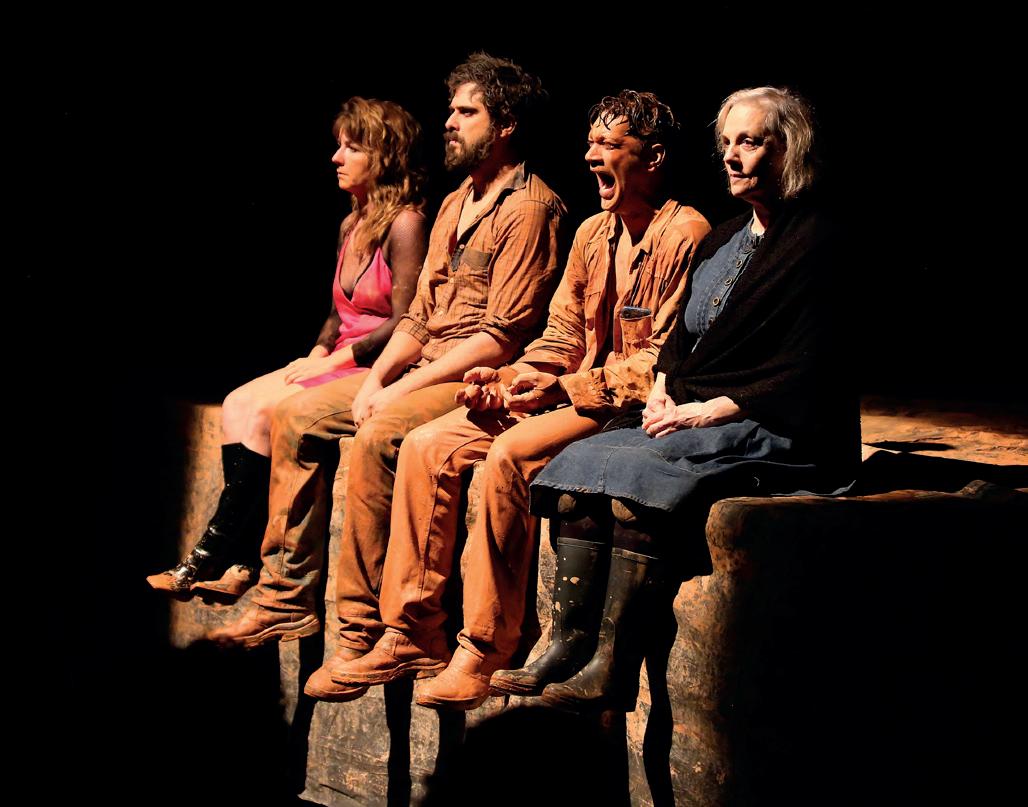


Cliff Cardinal gives Shakespeare’s classic a good old shuffle for a piece that is full of raw emotion and dark humour as it draws parallels with now.
n Church Hill Theatre, 20–23 August, 8pm.
Some 30 characters are split between four actors in this marriage caper about Gertrude Stein and the eponymous writer who was part of the Parisian avant-garde.
n Gilded Balloon Patter House, until 25 August, 1pm.


We’ve had Tour de France stories at the Fringe before but this one is unique in that it focuses on the first Australian cyclist to win that prize, back in 2011.
n Underbelly Cowgate, until 24 August, 1pm.
Perfectly Normal Theatre bring us a production about a seriously not-normal billionaire as the awful sci-fi geek receives a call that will change his, and everyone else’s lives (and not for the better).
n Space Surgeons’ Hall, until 23 August, 3.05pm.
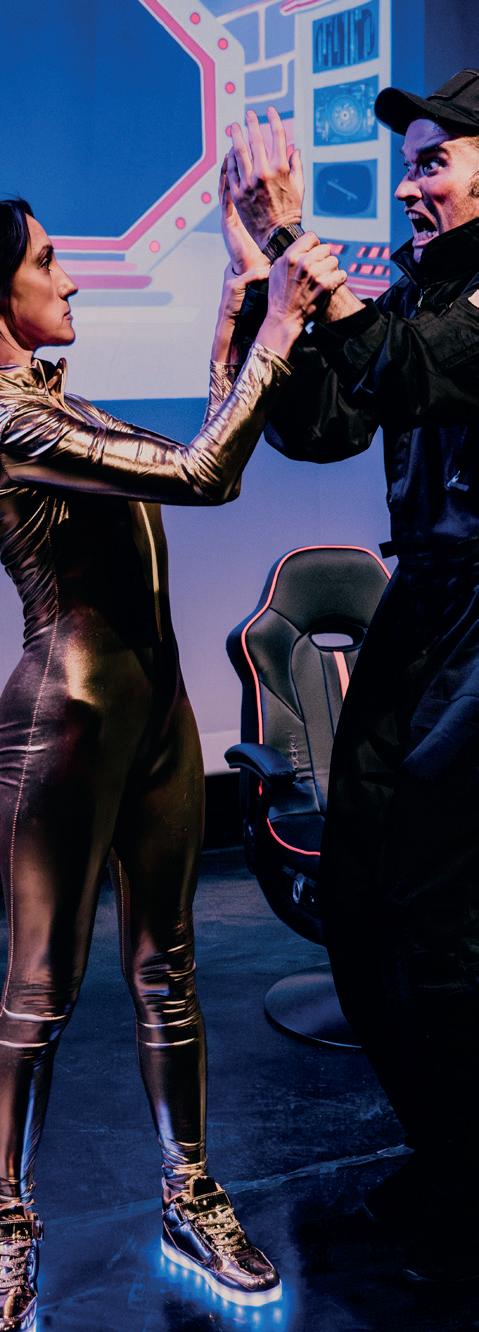

Two brothers, one a progressive writer, the other a white-supremacist convict, share more in common than you might think in this meditation on race, power and ideology.
n Traverse Theatre, until 24 August, times vary.
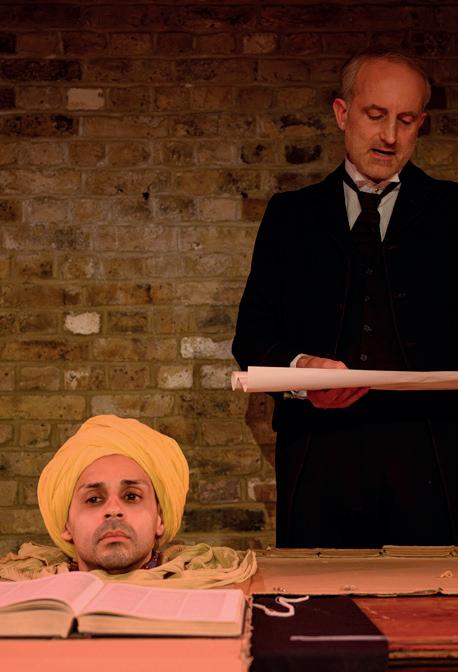
A collection of short works which look at political resistance and curbs on artistic expression, and which has been triggered by a perceived lack of responses in theatre to the Palestinian crisis.
n Church Hill Theatre, 14–17 August, 7.30pm.
Belgian theatre practitioner Sophie Anna Veelenturf explores her own love life to analyse whether people across the political divide can ever find romance online.
n Zoo Southside, until 24 August, 3.30pm.

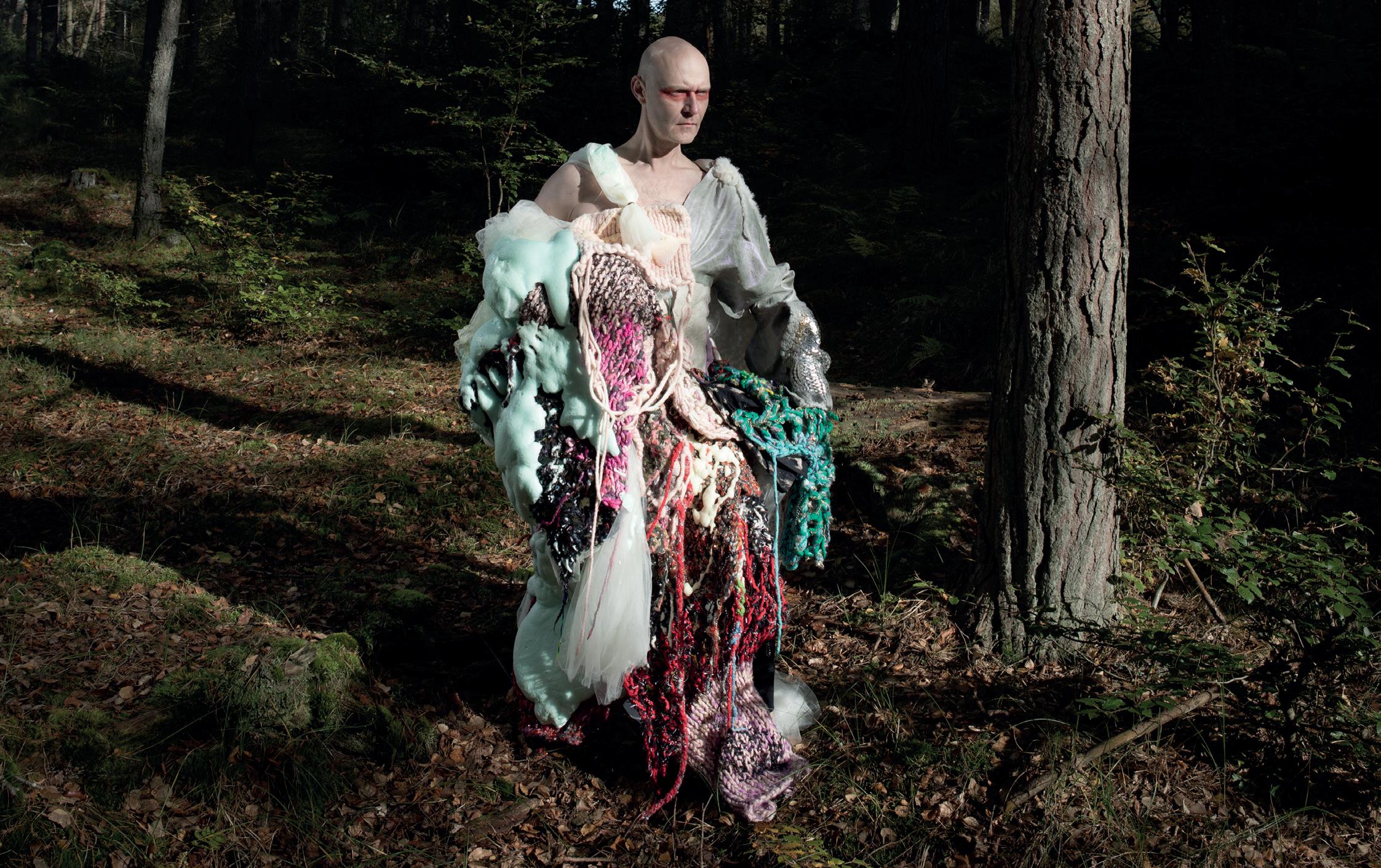


The Possibilities Of Mushrooms is the enticing title for an event with artist and author Siôn Parkinson (pictured) and mycologist Nicholas P Money (Edinburgh Futures Institute, 18 August) as they unpeel the truth about this versatile fungus which is used in everything from therapy to affecting rainfall.
We just can’t seem to get enough of the ill-fated 16th-century monarch Mary, Queen Of Scots and here comes Scottish Ballet’s interpretation of her sad story (Festival Theatre, 15–17 August). Created by Sophie Laplane and James Bonas, this has been dubbed ‘Renaissance meets punk’.
For those of a certain vintage, the trio of Doon Mackichan, Sally Phillips and Fiona Allen are fondly remembered for their boundary-busting Channel 4 sketch show, Smack The Pony. They now take to the Fringe, chatting with Kirsty Wark and doing some of your favourite bits (Gilded Balloon Museum, 17–20 August). 1 2 3












SEVEN BIG DECADES. ONE BIG LEAP.


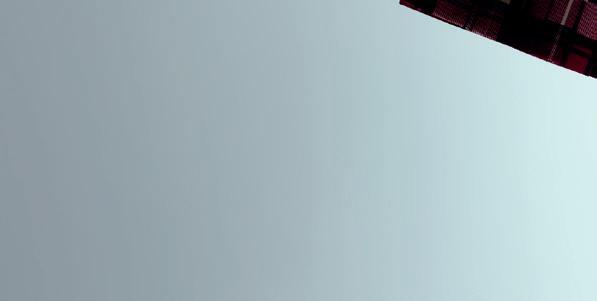

Join us in August as the Tattoo turns 75 and celebrates The Heroes Who Made Us, with a spectacular performance from pipers, drummers, dancers and musicians from around the world at Edinburgh Castle.


